


























Every year, as the school year ends and the summer approaches, there’s a more relaxed vibe. For the younger kids, there’s less homework that needs to be done, although finals take over teenagers’ lives. And even with finals and regents, there’s anticipation, an atmosphere of knowing that after a few days of intense studying, they will have completed another successful year.
This school year has been demanding on our children. Too many of them have been thrust into hearing and learning about tumultuous world events, news that we wish we can shield them from but know that we need to keep them informed, on some level. But our children have risen to the occasion. They have become more thoughtful, understanding, kind people. They have refined their middos and perspectives. They start their days thinking about their brothers and sisters around the world and end their days with a prayer for them on their lips. They’ve connected more to each other and to the One Above.
We hope that the summer will bring for them a bit of respite from the rigorous school year. It will be a time of more relaxed schedules, an absence of tests and assignments, and more singing and swimming. And yet, when they start their days, they will make sure to remember that their
tefillos are needed now more than ever –even when they’re enjoying their summer fun.
As the season heats up, even for those not going to camp, we spend more time outdoors. Dinner becomes a more casual event, with barbecues dotting the supper schedule. The days are longer, and bedtimes become later – it’s a struggle to put kids to bed when it’s still light outside.
I took a quick walk on the boardwalk yesterday. The beach was packed – in middle of the week. Is everyone off from work already for the summer? Or are they just itching to get into summer mode and soak up the warmer temperatures?
With so many people able to work from home now, I am sure that many people are “working” on the beach. And with idyllic weather to bring in the season, they are taking advantage of not needing to be in the office and at the computer to complete their deadlines.
We all need a little break – a “brain break,” if you will – to recharge and keep moving forward. Use this time to enjoy the beautiful weather outdoors and unwind. Wishing you a wonderful week, Shoshana
P.S. Congratulations to Lawrence mayor-elect Sam Nahmias on his win in Tuesday’s election!

Yitzy Halpern, PUBLISHER publisher@fivetownsjewishhome.com
Yosef Feinerman, MANAGING EDITOR ads@fivetownsjewishhome.com
Shoshana Soroka, EDITOR editor@fivetownsjewishhome.com
Nate Davis
Editorial Assistant
Nechama Wein
Copy Editor
Rachel Bergida Shana Brecher
Lani White
Design & Production
Gabe Solomon
Distribution & Logistics
P.O. BOX 266
Lawrence, NY 11559
Phone | 516-734-0858
Fax | 516-734-0857
Classified Deadline: Monday 5:00PM classifieds@fivetownsjewishhome.com text 443-929-4003
PAYMENT VIA CREDIT CARD MUST BE SUBMITTED ALONG WITH CLASSIFIED ADS
The Jewish Home is an independent weekly magazine. Opinions expressed by writers are not necessarily the opinions of the publisher or editor. The Jewish Home is not responsible for typographical errors, or for the kashrus of any product or business advertised within. The Jewish Home contains words of Torah. Please treat accordingly.






Dear Editor,
The exuberant, poetic and pristine words in this week’s parsha, “k’tinok ha’borieach mi’beis ha’sefer – Klal Yisrael left Har Sinai joyfully like a child running away from school,” unfortunately paint a negative picture of the Jewish nation. They ran from Har Sinai, not desiring to be burdened by the Torah. Is there any solace or opportunity in these words, however, that we can apply in our approach to Torah and winning the current war?
The Chasam Sofer gives an opening. He asks why this running away is framed as puranos, troubles, but not as an aveira, sin. Furthermore, why is the next pasuk that acts as a separator, “Vay’hi binsoa ha’Aron.”
He answers that in general aveiros aren’t paid back immediately. However, puranos, troubles, such as Bnei Yisrael abandoning the Torah with enthusiasm, gives our enemies immediate dominion over us, as when we are porek ol, nations of the world dominate us. Therefore, we are reminded in the next verse, “Vay’hi binsoa ha’Aron,” that the Aron has the ability to scatter our enemies to bring victory.
Never before has the need for running to the Torah like an innocent child been needed. Chazal’s poetic language urges us to approach the Torah with the purity and enthusiasm of a child. In this way, our enemies can be uprooted, as we are clutching the Aron, the greatest weapon that exists in the world.
Steven Genack
Dear Editor,
The results of California’s minimum wage law shouldn’t be surprising to anyone with even a basic grasp of economics. The law has already caused a surge in
restaurant prices, a decline in foot traffic, and a significant rise in unemployment.
The reason the minimum wage law almost always hurts the very workers it was intended to benefit is because of one of the most important principles of economics, called the Law of Demand: the more expensive a product or service becomes, people will buy less of it.
Think of wages as a price – it’s the price of labor, and when the government artificially raises the price of labor, fewer workers will be hired. Make labor more expensive, and you’ll end up with a surplus of unemployed workers who were probably better off before the minimum wage law went into effect.
As the late economist Milton Friedman once said, “How is a person better off unemployed at a dollar-sixty an hour than employed at a dollar-fifty?”
Rafi Metz
Dear Editor,
We recently reviewed in Parshas Nasso the laws regarding nazirus. The corresponding haftorah, taken from Shoftim: 13, further elaborates on this concept of nazirus, with the birth of Shimshon, to Manoach and his wife. I would like to recommend a fabulous book to your readers, discussing the life of Queen Helene of Abiabene who converted to Judaism and accepted upon herself to become a “nazira.” It is an intriguing story, and the historical backdrop, the difficult days before the destruction of the Bayis Sheini, is depicted fabulously well. This book, appropriately entitled, “Nazirah,” has been skillfully authored by Tzirel Greenberg and is published by Israel Bookshop. Another terrific book, a work of historical fiction, that I’d like to recommend Continued on page 14

Continued from page 12
is “The Harp,” by Rabbi Meir Uri Gottesman, published by Feldheim. All of Rabbi Gottesman’s books are riveting, each one taking us back to a different era in Jewish History. “The Harp” also discusses the terribly painful era of the Churban Bais Sheini. With summer now upon us, and Tammuz and Av swiftly approaching, both these books are super relevant.
How very fortunate we are to have within our communities brilliant, talented, prolific authors! Many thanks to those who invest much time and effort, churning out fabulous, inspirational writings that enhance our lives immensely.
May all be blessed ad bli dai! Miriam Liebermann
Dear Editor,
I would like to add my opinion to the article written by Jonathan S. Tobin on the subject of subverting democracy. In the sentence, “none of this represents a reason to vote for Trump or President Biden,” I can say that there is a way to bypass all the politics and media. We are Yehudim. We know the importance of saying “thank you” to people and “thank you” to Hashem. We also know how to judge people on the side of merit rather than on the side of faults.
President Trump deserves a thank you for freeing Rabbi Shlomo Rubashkin from jail. President Trump deserves a thank you for moving the embassy to Jerusalem. Many presidents promised to do this but did not follow through. Thank you, President Trump, for the Abraham Accord which was responsible for starting a real peace movement in the Middle East without talking about a two-state solution. Thank you, President Trump, for putting sanctions on the ICC. President Biden removed them, causing big problems for Israel.
Antisemitism has always been present in the U.S. It was mostly in the form of rejecting Jews. There were quotas for accepting Jewish students in medical school. During the 1920s through the 1950s, a Jew could not get a job in a large corporation unless the person was blond, blue eyed and had a neutral name like Holland. Golf clubs did not always accept Jews as members. That is probably the reason that there were so many Jews in the new entertainment field of movies, radio and TV.
Today the tone of antisemitism has changed. There are loud voices accusing and attacking Jews in the halls of Congress and the heads of major universities This is due to the critical race theory, which

is a complete reversal of the master race theory of the 1930s. Both are lies but are used in the same way to control people. Whether Aryan-white people are masters or villains, both systems will destroy Jews to solve all their problems
In order to push the race agenda, like in Psalm 94:20, “they turn evil into law.” In Germany, the Nuremberg Laws; in the United States, social justice determines who is guilty or innocent, based on race or political party. These laws are then enforced by force through the Gestapo in Germany and the FBI in the United States. The propaganda machine, Goebbels in Germany and The New York Times in the United States, make sure that people go along with the system, even though at first, most of the population does not agree with these racial ideas. Any resistance is easily crushed.
During the 1930s, there was some hope to believe that “the world would not let this happen.” Today we know that the world, “with one heart joined in the fight against Israel,” Psalm 83. Today we realize that we cannot rely on anyone but Hashem, therefore there is always a sense of optimism. There are three lines from different Psalms that are repeated throughout our prayers that tell us to trust in Hashem, who is our stronghold, and Hashem will answer our prayers when we call upon Him.
Elli Epstein Ocean, N.J.
Dear Editor,
Well, I guess that we are up to Round 3.
I am writing this letter in response to Mark E. Spund’s letter in your 6/11/24 issue.
That letter had criticized my prior letter, which had been in response to his prior critical letter, which followed my initial “Anonymous” letter of 5/23/24 (which had been critical of Biden, Schumer and Nadler). Whew – that’s quite a mouthful!
(As an aside, kudos to Mark E. Spund –you get to see your name in print again, without even writing a letter this time around!)
Please note the following:
(1) I suppose that I should be flattered that you, my literary jousting opponent, are attempting to elevate my mere “Letters to the Editor” to the level of “Opinion Pieces,” but insofar as I am neither a guest columnist nor a regular syndicated columnist, I feel that you are giving me and my little missives (which stand on their own, based on their content) a little too much credit.
(2) Regarding the statement, “Anonymous just doesn’t get it” – au contraire – it is you who “just does not get it.” You present no cogent reasoning to negate the position that the value and validity of an argument derive solely from its content and are independent of the person making the argument. In fact, you “double down” in prioritizing superficiality over substance and in ascribing greater importance to the messenger rather than to the message itself.
(3) What do you REALLY think of the Chofetz Chaim, Sefas Emes, Chazon Ish, Ehad Ha’am, Mark Twain and innumerable other writers, Jewish and non-Jewish, observant and non-observant, who have used “noms de plume”? Be honest now.
On Shavuot, we read in Megillat Rut of the redeemer who is closest to Boaz being identified as “Ploni Almoni” - ANONYMOUS! When Yaakov wrestled with the “malach,” the response of the “malach” was, “Why do you inquire of my name?” (without divulging a name) to Yaakov’s request for identification.
If anonymity is good enough for the Tanach, then kal va’chomer, it is good enough for a letter to the editor.
Remaining Anonymous – For Whatever Reasons or Lack Thereof
Village of Lawrence Election Results Mayor
889 864
Sam Nahmias Paris Popack
Trustee
1,327 1,301
Steve Gottesman Aaron Felder





On Saturday, a convicted Iranian was exchanged in a prisoner swap for two Swedish men being held in Iran.
Hamid Nouri was arrested by Sweden in 2019 when he traveled to the country as a tourist. Nouri was then convicted of committing war crimes over his part in the 1988 mass executions in the Islamic Republic and was sentenced to life in prison. The court had identified Nouri as an assistant to the deputy prosecutor at the Gohardasht prison outside the Iranian city of Karaj.
Iranian state television claimed without evidence that Nouri had been “illegally detained.”
In exchange for Nouri’s freedom, Iran released diplomat Johan Floderus and Saeed Azizi, both who had been facing a “hell on earth” in Iranian prison, according to Swedish Prime Minister Ulf Kristersson.
“Iran has made these Swedes pawns in a cynical negotiation game with the aim of getting the Iranian citizen Hamid Nouri released from Sweden,” Kristersson said Saturday. “It has been clear all along that this operation would require difficult decisions; now the government has made those decisions.”
Back on Iranian soil, Nouri said, “I am Hamid Nouri. I am in Iran. G-d makes me free.”
Floderus’ family said he was arrested in April 2022 at the Tehran airport while returning from a vacation with friends. Floderus had been held for months before his family and others went public with his detention.
Azizi, a dual Iranian-Swedish national, had been sentenced to five years in prison by Tehran’s Revolutionary Court on charges of “assembly and collusion against national security.”
The country of Oman facilitated the prisoner exchange. It has long served as an interlocutor between Iran and the West. The swap comes as the Muslim world celebrates Eid al-Adha, which marks the end of the Hajj pilgrimage and typically sees prisoners freed.
Saturday’s swap did not free Ahmadreza Djalali, a Swedish-Iranian expert on disaster medicine whom a U.N. panel long has described as being arbitrarily detained by Tehran since his arrest in 2016. Djalali faces possible execution after being convicted on charges of “corruption on Earth” in 2017 following what Amnesty International called a “grossly unfair trial” in Revolutionary Court.

Japan’s Health Ministry recently recorded, as of June 2, 977 cases of streptococcal toxic shock syndrome (STSS), a highly fatal bacterial infection with a mortality rate of up to 30%. At least 77 people in Japan had died from the illness between January and March.
So far, experts do not know why the bacteria is on the rise.
The ongoing outbreak in Japan has already surpassed last year’s previous record of 941 preliminary infections – the highest since statistics began in 1999. Ninety-seven people died of STSS last year in Japan, the second-highest number of fatalities in the past six years.
STSS is a rare but serious bacterial infection that can develop when bacteria spreads into deep tissues and the bloodstream. The symptoms generally include fever, muscle pain and vomiting. Some patients suffer from life-threatening low blood pressure, swelling and organ failure if the body goes into shock.
Most STSS cases are caused by the group A streptococcus (GAS) bacteria, which mainly produces fever and throat infections in children. In rare circumstances, strep A can become invasive when bacterium produces a toxin that enables it to gain access to the bloodstream, causing serious illnesses such as toxic shock.


The axis of evil is sharpening its blades. On Tuesday, Russian President Vladimir Putin traveled to North Korea for a two-day visit on the Russian leader’s first trip to Kim Jong Un’s country in more than two decades.
Putin hasn’t been leaving Russia frequently since his country invaded Ukraine in early 2022. Similarly, President Kim Jong Un has not hosted another world leader in Pyongyang – among the globe’s most politically isolated capitals –since the pandemic.
All eyes will be watching these two despots, who are hoping to cement a partnership between the powers that is founded on their joint animosity towards the West and Putin’s need to rely on allies in his ongoing war in Ukraine.
Following his visit to North Korea, Putin will travel to Hanoi, Vietnam, on Wednesday for another two-day trip, in a display of Communist-governed Vietnam’s ties to Russia.
Putin’s trip to North Korea will have a “very eventful” agenda, his aide Yuri Ushakov said during a press conference on Monday. Both leaders plan to sign a new strategic partnership, Ushakov said, with main events of the visit scheduled for Wednesday. He said the new agreement will replace documents signed between Moscow and Pyongyang in 1961, 2000 and 2001.
U.S. national security spokesman John Kirby said on Monday that the Biden administration wasn’t “concerned about the trip” itself, but added, “What we are concerned about is the deepening relationship between these two countries.”
The U.S., South Korea and other countries have accused North Korea of providing substantial military aid to Russia’s war effort in recent months, while observers have raised concerns that Moscow may be violating international sanctions to aid Pyongyang’s development of its budding military satellite program. Both countries have denied North Korean arms exports.
Last September, Kim traveled in an armored train to Russia’s far eastern re-

gion, for a visit that included stops at a factory that produces fighter jets and a rocket-launch facility.
Kim last week hailed the future of the countries’ “meaningful ties and close comradeship” in a message to Putin commemorating Russia’s national day on June 12.
“Our people give full support and solidarity to the successful work of the Russian army and people,” Kim said, according to the official Rodong Sinmun newspaper.
In an article for the Rodong Sinmun newspaper published early Tuesday to coincide with the trip, Putin thanked Pyongyang for showing “unwavering support” for Russia’s war in Ukraine and said the two countries were “ready to confront the ambition of the collective West.”
He said the two were “actively advancing their multifaceted partnership” and would “develop alternative trade and mutual settlements mechanisms not controlled by the West, jointly oppose illegitimate unilateral restrictions, and shape the architecture of equal and indivisible security in Eurasia.”
Putin’s trip this week comes just days after the G7 Summit in Italy in which Western nations joined together and reiterated their support for Ukraine. Ukrainian President Volodymyr Zelensky had attended the summit.

A jury in South Florida has ruled that Chiquita Brands is liable for eight killings carried out by a right-wing paramilitary group that the company helped finance in a fertile banana-growing region of Colombia during the country’s decades-long internal conflict.
The jury on Monday ordered the multinational banana producer to pay $38.3 million to 16 family members of farmers and other civilians who were killed in separate episodes by the United Self-Defense Forces of Colombia — a right-wing paramilitary group that Chiquita bankrolled from 1997 to 2004.
The company has faced hundreds of similar suits in U.S. courts filed by the families of other victims of violence by
the paramilitary group in Colombia, but the verdict in Florida represents the first time Chiquita has been found culpable.
The decision, which the company said it planned to appeal, could influence the outcome in other suits, legal experts said.
The verdict in favor of the victims is a rare instance — in Colombia and elsewhere — in which a private corporation is held accountable to victims for its operation in regions with widespread violence or social unrest, legal experts said.
“We’re very happy about the jury’s verdict, but you can’t escape that we’re talking about horrific abuses,” said Marco Simons, a lawyer for EarthRights International, an environmental and human rights group, who represented one family in the legal claim.
Agnieszka Fryszman, another lawyer who represented the plaintiffs, said, “The verdict does not bring back the husbands and sons who were killed, but it sets the record straight and places accountability for funding terrorism where it belongs: at Chiquita’s doorstep.”
The jurors reached their decision after two days of deliberation and six weeks of trial in U.S. District Court in West Palm Beach, in which lawyers argued over the motivation for payments that Chiquita executives admitted making to the paramilitary group.
Lawyers representing the families in the South Florida trial argued that Chiquita’s operations benefited from the company’s relationship with the paramilitary group, which sowed fear across a 7,000-square-mile fertile farming region connecting Panama and Colombia until it disbanded in 2006.
“The situation in Colombia was tragic for so many,” Chiquita officials said in a statement. “However, that does not change our belief that there is no legal basis for these claims.” (© The New York Times)

Need to work abroad? Stay far away from Hong Kong. The Asian city nabbed the ignoble title of the costliest city for overseas workers in the 2024 Mercer Cost of Living Survey.

Hong Kong, which also topped the annual list in 2022 and 2023, was closely followed by Singapore, in second place.
Much of the rest of the top 10 was taken up by Swiss cities, with Zurich, Geneva, Basel and Bern coming in third, fourth, fifth and sixth place respectively.
The report examined 226 cities based on the comparative cost of over 200 items in each location, including transportation, food, clothing, household goods and entertainment. Some of those items included a dozen large eggs, a liter of olive oil, and an espresso coffee at a popular café.
In the United States, New York was the highest city, taking seventh place, while UK capital London, which was in 17th place last year, jumped to eighth place. Nassau, The Bahamas, took ninth place, with Los Angeles rounding out the top 10.
At 92 on the list, Toronto was ranked as the most expensive city in Canada for international employees, followed by Vancouver at 101.
Expensive housing markets and increased costs of transportation and other goods and services are among the reasons why the cost of living in the top-ranking cities is particularly high.
The study also noted that the cost of living in the U.S. was “a significant issue”
for 2024, with seven U.S. cities appearing in the top 20.

The Russian Prosecutor General’s office recently indicted Wall Street Journal reporter Evan Gershkovich on espionage charges that he, the Wall Street Journal, and the U.S. have rejected as false.
The indictment, which was announced Thursday, comes just over a year after Gershkovich was arrested in Russia. The reporter’s trial will take place in Yekaterinburg, a city in Russia. If he is found guilty, he could be sentenced to up to twenty years in jail.
Russian officials allege that Gershkovich was working in Russia as a CIA operative and “collected secret information” on
a tank factory in Russia.
“Gershkovich carried out the illegal actions using painstaking conspiratorial methods,” Russia’s federal security service claimed.
Following the formal indictment’s announcement, the U.S. State Department reiterated that the charges have “absolutely zero credibility.”
“We have been clear from the start that Evan has done nothing wrong. He should never have been arrested in the first place. Journalism is not a crime. The charges against him are false, and the Russian government knows that they’re false. He should be released immediately,” said State Department spokesman Matthew Miller.
For the past year, Gershkovich has been jailed in Lefortovo Prison, an infamous prison facility in Moscow. The 32-year-old reporter’s trial has been postponed several times.
According to Roger Carstens, the Special Presidential Envoy for Hostage Affairs, Gershkovich is expected to be transported over 800 miles from Lefortovo to Yekaterinburg before July.
“If it’s anything like what happened to Brittney Griner, Paul Whelan, Trevor Reed, there’ll be a period when he leaves Lefortovo where we won’t have any con-
tact with him,” said Carstens, referring to other U.S. citizens who have been jailed in Russia. “It’ll almost be like it’s gone dark, but eventually, an American or I would say, a detainee surfaces in Yekaterinburg, and we’ll have a chance to reestablish that connectivity from there.”
Reacting to the indictment, WSJ Editor-in-Chief Emma Tucker said, “Russia’s latest move toward a sham trial is, while expected, deeply disappointing and still no less outrageous. Evan has spent 441 days wrongfully detained in a Russian prison for simply doing his job. Evan is a journalist. The Russian regime’s smearing of Evan is repugnant, disgusting, and based on calculated and transparent lies. Journalism is not a crime. Evan’s case is an assault on free press.”
Vladimir Putin, the president of Russia, has previously suggested that he would be open to freeing Gershkovich and Paul Whelan in exchange for the release of imprisoned Russian criminals.
Gershkovich was arrested on March 29, 2023. His parents are Jewish immigrants who fled the Soviet Union in 1979 and settled in Princeton, New Jersey. He had lived in Russia for six years prior to his arrest, when he was working at the Wall Street Journal’s bureau in Moscow and was covering the war in Ukraine.





For the first time since 1997, the president of France has dissolved the country’s parliament. French President Emmanuel Macron announced the move and called for a snap election, following exit polls that indicated that his party, the Renaissance Party, would be defeated by the farright National Rally (RN) party.
According to early polls, RN won 31.5% of the vote, while Renaissance secured 15.2% of the vote. In third place was the Socialist Party, which won 14.3%.
Following the exit poll, Jordan Bardella, the leader of the RN party, encouraged the president to dissolve the parliament and declared that his party’s tentative victory was a “stinging disavowal” for Macron. Less than an hour later, Macron said he would call for parliamentary elec-
tions and dissolve the National Assembly, France’s lower house of parliament.
“This unprecedented defeat for the current government marks the end of a cycle and Day 1 of the post-Macron era,” Bardella said during a speech in front of his party’s headquarters.
According to Macron, the first set of elections will take place on June 30, and the second will take place on July 7.
“I have decided to give you back the choice of your parliamentary future by voting. I am therefore dissolving the National Assembly this evening,” said Macron. “This decision is serious, heavy. But it is above all, an act of trust. Trust in you, my dear compatriots. In the capacity of the French people to make the most just decision.”
France holds different elections for president and for the lower house of parliament’s 577 members. Presidential elections are expected to take place sometime around 2027. During the parliamentary elections of 2022, the Ensemble coalition, which included Renaissance and other parties, lost their majority by a slim margin, prompting the coalition to seek support from other parties.
Macron’s second term as president began in 2022. Since then, he has, on several occasions, invoked the French

constitution’s Article 49.3 to pass legislation without allowing parliament to vote, which has upset many French politicians and citizens.

Since the tragic day of October 7, the Houthi rebel group has been terrorizing ships in the Red Sea in support of the “Palestinian cause” and to pressure Israel into a ceasefire. Last week, the U.S. eliminated seven radars in locations in Yemen where the Houthis govern, according to U.S. Central Command (CENTCOM). Those radars enabled “Houthis to target maritime vessels and endanger commercial shipping,” CENTCOM noted.
Last Wednesday, the Houthis launched an attack on a ship that was Greek owned and controlled and Liberian flagged. The attack caused major damage and flooding to the ship’s engine room, forcing the crew to evacuate from the vessel. Those on board were saved by the USS Philippine Sea and other U.S. and international forces, although one sailor has gone missing.
According to CENTCOM, the attacked vessel was left to drift in the Red Sea and is currently sinking.
Additionally, the U.S. also destroyed a Yemeni uncrewed aerial system and two uncrewed surface vessels.
The M/V Verbena, another cargo vessel, was attacked by the Houthis twice while it was sailing in the Gulf of Aden on Thursday. One mariner was injured in the attack and received medical attention after being evacuated via aircraft. The ship caught on fire, and two days later, the crew sent out a distress signal and left the vessel behind “due to continued fires and an inability to control them,” CENTCOM announced on Saturday. The crew was rescued by a nearby commercial ship. According to CENTCOM, the Iranian frigate IRIN Jamaran was just 8 nautical miles from the attacked vessel but ignored the ship’s distress signal.
“This continued reckless behavior by the Iranian-backed Houthis threatens regional stability and endangers the lives
of mariners across the Red Sea and Gulf of Aden. The Houthis claim to be acting on behalf of Palestinians in Gaza and yet they are targeting and threatening the lives of third-country nationals who have nothing to do with the conflict in Gaza,” CENTCOM stated. “The ongoing threat to international commerce caused by the Houthis makes it harder to deliver badly needed assistance to the people of Yemen as well as Gaza.”
CENTCOM added, “The United States will continue to act with partners to hold the Houthis accountable and degrade their military capabilities.”

The Summer Olympics are set to be held this summer in Paris, France. The River Seine will be the crown jewel of the games, staging events such as the triathlon as well as the opening ceremony, which for the first time in Olympic history will not be taking place in a stadium.
Starting at Pont Alexandre III Bridge, the individual triathlon races are set to begin with a 1.5-kilometer swim, followed by a 40K bike race – passing by the Le Grand Palais and Champs-Elysées – before finishing with a 10K run through the heart of the city. A mixed team relay race involving four athletes – two men and two women – will also start at Pont Alexandre III Bridge with each team member completing a 300-meter swim, followed by a 5.8K bike ride and 1.8K run.
But many are concerned that the Seine is not safe for the athletes who will be competing. Swimming in the French river has been illegal for more than 100 years due to pollution levels. Some swimming has been allowed recently as part of triathlon test events.
Recent testing results show that the Seine is still not safe for swimming as per the standards set by World Triathlon, due to high E. Coli bacteria levels in the water, potentially exposing athletes to serious health risks.
Authorities have poured at least $1.55 billion into cleaning up the Seine. Last month, a rainwater storage facility was

28 opened that can hold 20 Olympic swimming pools worth of water to reduce pressure on the sewage network and lower the risk of wastewater being discharged into the Seine.
If pollution levels are not at satisfactory levels, World Triathlon said that the triathlon would have to be downgraded to a duathlon with no swimming. The water quality of the Seine is likely to improve significantly before July due to drier and sunnier summer conditions, which will reduce the frequency of sewage spills.

Before he started a company 15 years ago selling the world’s smelliest fruit, Eric Chan had a well-paying job writing code for satellites and robots. His family and friends were puzzled when he made the career change.
The fruit, durian, has long been a cherished part of local cultures in Southeast Asia. A single durian is typically the size of a rugby ball and can emit an odor so powerful that it is banned from most hotels. When Chan began his startup in his native Malaysia, durians were cheap and often sold from the back of trucks.
Then China acquired a taste for durian in a very big way.
Last year, the value of durian exports from Southeast Asia to China was $6.7 billion, a twelvefold increase from $550 million in 2017. China buys virtually all of the world’s exported durians, according to United Nations data. The biggest exporting country by far is Thailand; Malaysia and Vietnam are the other top sellers.
Today, businesses are expanding rapidly — one Thai company is planning an initial public offering this year — and some durian farmers have become millionaires. Chan is one of them. Seven years ago, he sold a controlling share of his company, which specializes in producing durian paste for cookies, ice cream and even pizza, for the equivalent of $4.5 million, nearly 50 times his initial investment.
“Everybody has been making good money,” Chan said of the once-poor duri-
an farmers in Raub, a small city 90 minutes from Kuala Lumpur, the Malaysian capital. “They rebuilt their houses from wood to brick. And they can afford to send their children overseas for university.”
The surge in durian exports is a measure of the power of Chinese consumers in the global economy, even though, by other measures, the mainland economy is struggling. When an increasingly wealthy country of 1.4 billion people gets a taste for something, entire regions of Asia are reshaped to meet the demand.
In Vietnam, state news media reported last month that farmers were cutting down coffee plants to make room for durian. The acreage of durian orchards in Thailand has doubled over the past decade.
China is not only a buyer. Chinese investment has flowed into Thailand’s durian packing and logistics business. Already, Chinese interests control around 70% of the durian wholesale and logistics business, according to Aat Pisanwanich, a Thai expert in international trade. Thailand’s own wholesale durian companies could “disappear in the near future,” he said at a news conference in May. (© The New York Times)

Millionaires are leaving the United Kingdom and China in droves. The UK is on track to lose 9,500 millionaires this year, according to a new report on the migration intentions of the world’s wealthy.
It’s more than double the number that left the country in 2023 and lags behind only China, which is expected to lose 15,200 millionaires this year, according to the Henley Private Wealth Migration Report, authored by migration advisory Henley & Partners.
“As the world grapples with a perfect storm of geopolitical tensions, economic uncertainty, and social upheaval, millionaires are voting with their feet in record numbers,” Dominic Volek, Henley’s group head of private clients, noted. Britain girds for an election in just


30
over two weeks where the opposition Labour Party, which is advocating for some higher taxes on the wealthy, has about a 20-point lead over the ruling Conservatives. But the ultra-wealthy aren’t just leaving the UK; around 7% of millionaires making a move hail from the UK.
That reflects “a steady accumulation of factors” that are making the country less appealing to the rich, including Brexit, the energy crisis from the war in Ukraine and the subsequent rise in inflation, said Hannah White, chief executive officer of the Institute for Government in London.
“The outflow of high-net-worth individuals already generated by the economic and political context is now being accelerated by policy decisions ahead of the election.”
Brexit was a huge factor in wealthy Brits leaving for shinier shores. From 2017 through last year, the country lost 16,500 millionaires to migration, according to the report.
The top destination for millionaires around the world is the United Arab Emirates, which is set to attract 6,700 rich individuals this year. A longtime favorite of wealthy people from India and the wider Middle East, the country welcomed thousands of Russians in the wake
of the Ukraine war. The number of millionaires living in the UAE’s largest city, Dubai, has risen 78% over the last decade. With zero taxes on personal income, a time zone convenient to multiple continents and a world-class airport, the UAE has made concerted efforts to appeal to rich people. Both Abu Dhabi and Dubai have created sophisticated financial markets to entice global firms and family offices to set up shop.
The U.S. was the second-biggest projected recipient of millionaire newcomers at 3,800, followed by Singapore with 3,500 expected arrivals.

At least 49 people were killed and dozens of others injured in the Persian Gulf country of Kuwait, the state news agency said, when a fire broke out last week in a building that housed scores of low-in
come workers, many of them Indian nationals.
The fire began during the morning in a coastal area called Mangaf, about half an hour’s drive from the center of the capital, Kuwait City.
Kuwaiti authorities have held the building owner for questioning as they investigate the cause of the fire and try to determine whether “any shortcoming or neglect” played a role, the state news agency reported. Authorities promised to begin a campaign to tackle building code violations. The public prosecutor’s office also planned to inspect the site and interview survivors.
Speaking to journalists at the site of the fire, Sheikh Fahad Yusuf Al Sabah — Kuwait’s deputy prime minister and interior minister — blamed “the greed of property owners” for the disaster and said that the owner of the company employing the workers would also be detained, the Reuters news agency and Kuwaiti newspapers reported.
Jayashankar, an Indian salesperson who survived the fire, said that he awoke to screams around 4 a.m. local time. He and his roommates opened the door to their fourth-floor apartment and found that thick black smoke had enveloped the corridor, burning their lungs.

Witnesses told local news outlets that the fire had begun at the bottom of the seven-story building, sending smoke billowing upward. In a televised interview, an official in Kuwait’s firefighting force, Col. Sayed Hassan Al-Moussawi, said, “In a building like this, you’re supposed to go up to the roof, but unfortunately the door to the roof was locked.”
More than 50 people hurt during the fire were sent to hospitals around Kuwait, with injuries including burns, broken bones from jumping out of the building and carbon monoxide poisoning from smoke inhalation, the Ministry of Health said in a statement. Nine were in critical condition, it said. (© The New York Times)

The Group of Seven, which includes Canada, France, Germany, Italy, Japan, the United Kingdom, and the U.S., met for
this year’s G7 Summit in Italy to discuss several issues, including artificial intelligence, the war in Ukraine and the Middle East, and the economy. Other countries, including India, Brazil and Turkey, were also invited to the summit, as Western nations attempted to band together to work on causes around the world.
The group worked together to pledge support for Ukraine in the war against Russia and to deal with climate matters. It was important to involve leaders like Prime Minister Narendra Modi of India and President Luiz Inácio Lula da Silva of Brazil on these matters, as they will be helpful in achieving these goals.
Prime Minister Giorgia Meloni of Italy, who hosted the gathering, said the goal of her expanded guest list was to “strengthen dialogue with the nations of the Global South.” She insisted that the Group of 7 was “not a fortress closed in itself” but “an offer of values that we open to the world.”
The second day of the summit focused on migration. The war in Israel against Hamas and China’s state subsidies of industries like electric vehicles were also discussed.
The group endorsed President Biden’s effort to broker a ceasefire between Israel and the Hamas terror group. France and Canada had pushed for stronger language on Israel’s conduct of the war, but the United States and Germany resisted.
During the summit, Pope Francis, the first pope to ever address the group, spoke, calling on the G7 to keep artificial intelligence in check.
“We would condemn humanity to a future without hope if we took away people’s ability to make decisions about themselves and their lives, by dooming them to depend on the choices of machines,” Francis said. “We need to ensure and safeguard a space for proper human control over the choices made by artificial intelligence programs: Human dignity itself depends on it.”
Francis, who was invited to the summit by Meloni, said that AI should never be given the choice to kill humans. In recent months, an AI-generated image of the pope went viral on the internet.
In its final statement, the G7 aligned itself with the pope’s message, expressing the importance of effective and ethical AI regulation.
“We will pursue an inclusive, human-centered, digital transformation that underpins economic growth and sustainable development, maximizes benefits, and manages risks, in line with our shared democratic values and respect for human rights,” the group stated.





ChatGPT, an AI chatbot built on a state-of-the-art large language model, took the world by storm at the end of 2022. Large language models, or LLMs, have since exploded in popularity, ushering in an era of excitement and uncertainty. Newer AI models, such as those recently released by OpenAI, Google, and Meta, are able to accomplish a wide range of tasks. And since AI is advancing rapidly, many are concerned with the possibility that AI might eliminate the need for certain jobs. Others are afraid of the prospect of bad actors using AI to disseminate disinformation or to harm others. And with AI models becoming increasingly intelligent with each passing year, many are concerned about the idea of these technologies becoming so advanced that we lose control over them. Many countries are, thus, trying to regulate AI to prevent the technology from getting out of hand.
According to Professor Amatzia Baram, the reason why Hassan Nasrallah, the head of Hezbollah, has yet to wage a full-scale war against Israel is because he believes that the IDF could easily assassinate him.
“Nasrallah realizes that the IDF has the ability to kill him whenever it wants, and I believe this worries him quite a bit. Contrary to popular belief, Nasrallah is not a suicidal Shiite yearning for death. He understands that he would be next in line to die if a full-scale war breaks out,” said Baram. “This poses a significant danger for him. Additionally, the elimination is a significant success in the psychological warfare against the terrorist organization, as it leads to great concern among the commanders, who know they could be next.
“From their perspective, starting a war would be a big mistake, as then the U.S. would have legitimacy to join the fight. They still remember Biden’s statement that if Hezbollah initiates a full-scale war against Israel, the U.S. would join the war against them, which the terrorist organization and the Iranians fear,” he added.

After Israel eliminated Sami Taleb Abdullah, a top Hezbollah official, last week, the Lebanese terror group responded by firing roughly 250 rockets into northern Israel, setting off fires in open spaces, with alarms blaring in Tiberias for the first time since October.
The highest-ranked Hezbollah official to be eliminated in the terror group’s war with Israel, Abdullah, for the last twenty years, has been responsible for attacks on Kiryat Shmona, the Galilee, and the Golan Heights. During the Second Lebanon War, he built rockets and held the position of brigade commander. Before his death, he held the Hezbollah-equivalent rank of the IDF’s brigadier general.
As part of a collaborative mission headed by the Northern Command chief, the Intelligence Directorate, and the Air Force, the IDF killed Abdullah with a precise fighter jet, using military intelligence.

In December 2023, Matanyahu Englman, Israel’s state comptroller, launched an investigation into the intelligence failures that led up to the October 7 massacre, in hopes of holding responsible parties and individuals in Israel accountable. On Sunday, Israel’s High Court of Justice ordered Englman to suspend his investigation.
In a statement issued by Gila Canfy-Steinitz, who has served as an Israeli Supreme Court justice since 2022, it was announced that she ordered the suspension of Englman’s investigation due to appeals filed against him. The court will consider the petitions in July, after which Englman may or may not be permitted to continue his investigation.
The IDF, the State Attorney’s Office, and other individuals have come out against the investigation, claiming that such matters could interfere with the

36 IDF’s military activities, as Israel wages war against Hamas in the Gaza Strip. Englman has disagreed with such concerns, arguing that a postponed investigation could very well turn out to be ineffective.
In December of last year, Englman said he would be investigating the “multi-system failures” that led up to the October 7 massacre. He said he would be investigating the “failures on all levels – policy, military and civilian.” The following month, IDF Chief of Staff Lt. Gen. Herzi Halevi requested that Englman postpone the investigation, noting that it would “divert the attention of the commanders from the fighting, will damage operational investigation ability, and will not allow drawing the necessary lessons to achieve the goals of the war.”
The State Attorney’s Office maintained that such an investigation could cause “substantive harm to the operational capability of security services and harm the fighting.”
Canfy-Steinitz said, “In view of the complex security reality, the planned scope of the investigation — which will deal, among other things, with the combat support system and core operational issue — and the preparation required to respond to [the investigation] at the current time, and while giving significant
weight to the classified position papers of the security agencies submitted to me, I order the suspension of the investigation procedures in everything that relates to the IDF and Shin Bet.”

On Sunday, the Israel Defense Forces announced that two soldiers had been killed in northern Gaza after their tank was bombed by an explosive, bringing the IDF death toll to 311 since the start of Israel’s ground campaign in the Gaza Strip.
The two reservists were named as 28-year-old Jerusalem resident Cpt. (res.) Eitan Koplovich and 49-year-old Psagot resident Warrant Officer (res.) Elon Weiss. Koplovich and Weiss fought in the 8th Reserve Armored Brigade’s 129th Battalion. According to the IDF, two other soldiers were seriously injured

in the attack.
Eitan Koplovich was married and had a year-old son. He was called a “humble man” and a natural leader and wanted to become a lawyer.
Rabbi Weiss had seven children. Just a few weeks ago, one of his daughters, Racheli, got married; another one of his daughters, Hodia, is supposed to get married in three weeks.
Rabbi Weiss was a tenth grade teacher at the high school in Ma’ale Adumim and was beloved by his students. Daniel Be’eri, the school’s principal, said about Rabbi Weiss, “Education was the center of his life, and he saw the empowerment of each student as a dream come true. He loved his students very much, and gave his life for them, as he gave his life for the people of Israel.”
Guy Yifrah, the mayor of Ma’ale Adumim, mourned, “The break is great, as Rabbi Elon was the shining face of the school, a man full of love. The heart of the teachers’ room and the coordinator of the system. The blow is painful because we have lost the great heart of an extraordinary educator. All of us are with his dear family and students at such a difficult time.”
On Saturday morning, eight combat engineers were killed in Rafah. The IDF identified the fallen soldiers as: Cpt. Wassem Mahmoud, a 23-year-old from Beit Jann; Sgt. Eliyahu Moshe Zimbalist, a 21-year-old from Beit Shemesh; Sgt. Itay Amar, a 19-year-old from Kochav Yair; Staff Sgt. Stanislav Kostarev, a 21-yearold from Ashdod; Staff Sgt. Orr Blumovitz, a 21-old from Pardes Hanna-Karkur; Staff Sgt. Oz Yeshaya Gruber, a 20-yearold from Tal Menashe; Sgt. Yakir Ya’akov Levi, a 21-year-old from Hafetz Haim; and Sgt. Shalom Menachem, a 21-yearold Beit El resident.
Eliyahu Moshe Zimbalist made aliyah from the United States with his family in 2005. Rabbi Michael Yammer, who heads Shaalvim, where Zimbalist had learned, said that “the one thing he wanted to do in life was to do good for others. And he always did this quietly, humbly, constantly asking, ‘Who can I help next?’”
Rabbi Zechariya Rabinowitz, who taught Zimbalist at Shaalvim, said he had “golden hands, always ready to help. He did everything in simplicity and humility. He loved the yeshiva and was happy there. He always walked around with his head held high and believed in the rightness of his path. He fought until the very end.”
Yakir Levi also studied at Shaalvim together with Zimbalist.
Rabbi Michael Yammer, of Shaalvim,
mourned them both. “They have something in common, and that is to do good both for G-d and for those around them, the expansive heart and the desire to do good to each and every one without paying attention to themselves. When I spoke with each of them recently, they told me that they were giving to all of Israel. They were engaged in endless giving and a desire to advance in G-d’s work by giving to the other. They were people of kindness who understood the other. They were people of all in two ways: in fighting for all of the nation and for all people in everyday life, and giving one to another.”
Beit El Council chief Shai Alon said about Shalom Menachem, “Shalom was an introverted person, quiet and modest, who acted with pleasantness towards everyone. He had a light in his eyes and a giant soul, which we will greatly miss.”
Rabbi Zechariya Rabinowitz, one of Shalom’s teachers, said, “Shalom loved serving G-d. he knew that this was the truth and loved the yeshiva and his environment. He was always very connected to helping and advancing matters in the yeshiva. He did everything naturally, with love, with great simplicity. He was simply lovely, smiling and happy. When he returned from Gaza, he was determined and he had a spirit of bravery.”
The head of the Samaria Council, Yossi Dagan, mourned Oz Gruber. “Oz, a handsome young man, one of the best of our sons, a member of a family with deep roots in Samaria, one of the foundation stones of the Tal Menashe settlement, fell like a hero in the battles against our cursed enemies. He dreamed of serving a meaningful military service, defending the State of Israel, the people and the country. When I sat down last night with his mother Shira, she told me that he was a man of truth, full of heart, a great idealist, and added that she was sure that if he were asked even now if he would enter Gaza again, he would say that he would enter, even though he knew he would be killed.”
Tal Blumovitz, Orr’s younger brother, said about his fallen sibling: “My brother was a great scholar of history, a kind of ‘bookworm.’ He was a hero… He was a quiet, introverted person who didn’t say too much because he knew it was difficult to serve in a combat unit. He really liked his service in the engineering corps.”
Orr had read thousands of books about the Land of Israel and history. Orr’s best friend, Yanon Tamir, was a paratrooper brigade fighter who was killed at the beginning of the war.
Another soldier, 19-year-old Sgt. Yair Roitman was injured earlier that week in a Rafah attack on June 10, which killed



four soldiers and injured six. Roitman later passed away from his wounds. He was from Karnei Shomron and served in the Givati Brigade’s reconnaissance unit.

On Monday, the IDF said that it had taken out about half of Hamas’ fighting force in Rafah, with at least 550 terrorists killed.
The IDF’s 162nd Division has been fighting in Rafah for more than 40 days, first taking control of the city’s eastern outskirts and the border crossing with Egypt in early May. In the second stage of the operation, about a week and a half later, the division captured the Brazil neighborhood. The third stage of the Rafah offensive saw the IDF take control of the entire Egypt-Gaza border, known as the Philadelphi Corridor, and push into the city’s northwestern Tel Sultan neighborhood.
Although the IDF has said that it has killed 550 gunmen, the number of terrorists killed is probably higher, as many more terror operatives were killed in strikes against buildings and tunnels, and those are hard to count. Additionally, an unknown number of terror operatives fled the Rafah area as the military began its offensive there.
Of the four battalions in Hamas’s Rafah Brigade, two — Yabna (South) and East Rafah — are considered to be almost completely dismantled, while the capabilities of the other two — Shaboura (North) and Tel Sultan (West) — are somewhat degraded due to IDF operations.
Along the Philadelphi Corridor, the IDF said it located hundreds of rockets, including dozens of long-range projectiles aimed at central Israel. Also in the border area, more than 200 tunnel shafts have been located, leading to many underground routes.
The IDF said it found at least 25 “long” tunnels that reach the border with Egypt, some of which likely cross into Sinai and had been used by Hamas to smuggle weapons.
Aside from the Philadelphi Corridor, the IDF said it has established “complete
operational control” over the Brazil and so-called NPK neighborhoods of Rafah, near the Shaboura and Yabna camps. The latter neighborhood is considered to be a major Hamas stronghold, and the army said troops killed dozens of gunmen inside tunnels there.
The fight against Hamas has been hard on the IDF, as it has lost 22 soldiers in fighting the terror group in Rafah. Eight soldiers were killed on Saturday in a blast in an armored vehicle that came under attack.

According to a study carried out in 2022 and whose results were published this week, the percentage of Israeli 15-year-olds who excel at “creative thinking” is among the highest in the world.
The study, the Programme for International Student Assessment (PISA) 2022 Creative Thinking Assessment, was carried out in 2022 among 63 countries as a supplement to the main PISA study, which examined the mathematics, reading and science abilities of 15-year-olds in 81 countries. PISA studies are conducted every few years by the OECD.
The 2022 Creative Thinking Assessment found that the overall percentage of Israeli students rated as “excellent” in creative thinking was 30 percent, as compared to the OECD average of 27%, putting Israel in 11th place out of the 63 participating countries.
Thirty-five percent of Hebrew speakers were rated “excellent”; only 11% of Arabic speakers were similarly rated.
Forty-four percent of girls in non-religious, Hebrew-speaking schools were rated as “excellent,” followed by 34% of girls in the state-religious system, 24% of girls in the ultra-Orthodox school system, and 13% of girls in Arabic-speaking schools.
For boys, 36% attending non-religious Hebrew-speaking schools were “excellent” in creative thinking, followed by 34% in the state-religious system and 9% in the Arabic schools.
A majority of Arabic-speaking students, 61%, showed “difficulty” in creative

40 thinking, more than four times the 15% of Hebrew speakers in the same category. For Arabic-speaking boys, a full 70% showed difficulty.
Israel was ranked overall 20th out of 64 countries in the creative thinking study. Comparatively, Israeli students were more successful in tests for “evaluating and improving ideas” and “solving social and science problems” but found more difficulty in tasks requiring “written expression.”
First place was claimed by Singapore, followed by South Korea, Canada, Australia, New Zealand, Estonia, Finland, Denmark, Latvia and Belgium.
involved to mitigate the risks to children.
He also linked the amount of time spent on social media to the increasing risk that children will experience symptoms of anxiety and depression.
According to the American Psychological Association, teenagers spend nearly five hours every day on platforms such as YouTube, TikTok and Instagram. In a 2019 study, the association found the proportion of young adults with suicidal thoughts or other suicide-related outcomes increased 47% from 2008 to 2017, when social media use among that age group soared.
In January, at a Senate Judiciary Committee hearing about social media’s impact on young people, Meta CEO Mark Zuckerberg apologized to parents who said the Meta platform Instagram contributed to their children’s suicides or exploitation.

On Monday, U.S. Surgeon General Vivek Murthy called on Congress to require a warning for visitors to social media platforms, similar to those found on tobacco products.
In an op-ed published in The New York Times, Murthy said the mental health crisis among young people is an urgent problem, with social media “an important contributor.”
“A surgeon general’s warning label, which requires congressional action, would regularly remind parents and adolescents that social media has not been proved safe,” he wrote.
Congress mandated warning labels on packs of cigarettes following a landmark report in 1965 from the surgeon general of the time who linked smoking to lung cancer and heart disease. The first warning label said: “Caution: Cigarette Smoking May Be Hazardous to Your Health.”
In the op-ed, Murthy said, “Evidence from tobacco labels shows that surgeon general’s warnings can increase awareness and change behavior.” He acknowledged the limitations and said a label alone wouldn’t make social media safe, adding that parents and others should be
“I’m sorry for everything you’ve all gone through,” Zuckerberg said. “It’s terrible. No one should have to go through the things that your families have suffered.”
A surgeon general’s public health advisory on social media’s mental health published last year cited research finding that among its potential harms are exposure to violent and graphic content and to bullying, harassment and body shaming. Murthy noted that social media use compromises children’s sleep and person-to-person interactions.

On Monday, those in Maryland who have marijuana convictions rejoiced when Gov. Wes Moore – a Democrat – issued pardons for more than 175,000 marijuana convictions.
The pardons by Moore will forgive low-level marijuana possession and certain paraphernalia charges for an estimated 100,000 people, the governor’s office said, as it is possible for a person to have more than one conviction pardoned.
“This is about changing how both government and society view those who have been walled off from opportunity because
of broken and uneven policies,” Moore, who is Black, said at a signing event Monday, almost two years after Maryland voters approved a constitutional amendment legalizing recreational marijuana for people 21 and older.
The governor described his executive order as “the most sweeping state-level pardon” in the country’s history. The event coincided with the week of Juneteenth, which commemorates the end of slavery in the U.S. According to The Washington Post, marijuana convictions affect a disproportionate amount of Black and brown people.
About 25% of the impacted convictions stem from the city of Baltimore.
The pardons will also apply to people who have died. They will not result in people being freed from incarceration, the governor’s office said.
Marylanders approved recreational cannabis for adult use amid a marked change in the way cannabis is viewed by the public. In November 2023, a record 70% of Americans surveyed by Gallup said they supported cannabis legalization. In 2014, the share was 51%.
“We cannot celebrate the benefits of legalization if we do not address the consequences of criminalization,” Moore said.
Maryland Attorney General Anthony G. Brown noted that there was a “deeply rooted bias in drug related arrests and sentencing,” which he described as a vestige of slavery.
“Cannabis convictions for hundreds of thousands of people here in Maryland were scarlet letters, modern day shackles,” he said. “I can almost hear the clanging of those shackles falling to the floor with your pardon this morning, governor.”

A federal judge ordered BNSF Railway to pay nearly $400 million to the Swinomish Tribe in Washington State after finding that the company intentionally trespassed when it repeatedly ran 100-car trains carrying crude oil across the tribe’s reservation.
U.S. District Judge Robert Lasnik initially ruled last year that the railway
deliberately violated the terms of a 1991 easement with the Swinomish Tribe north of Seattle that allows trains to carry no more than 25 cars per day.
The tribe sued in 2015 after BNSF dramatically increased, without the tribe’s consent, the number of cars it was running across the reservation so that it could ship crude oil from the Bakken Formation in and around North Dakota to a nearby refinery. The route crosses sensitive marine ecosystems along the coast, over water that connects with the Salish Sea, where the tribe has treaty-protected rights to fish.
Bakken oil is easier to refine into the fuels sold at the gas pump and ignites more easily. Last year, two BNSF engines derailed on Swinomish land, leaking an estimated 3,100 gallons of diesel fuel near Padilla Bay.
The 1991 easement limited rail traffic to one train of 25 cars per day in each direction. It required BNSF to tell the tribe about the “nature and identity of all cargo” transported across the reservation, and it said the tribe would not arbitrarily withhold permission to increase the number of trains or cars.
“BNSF failed to update the Tribe regarding the nature of the cargo that was crossing the Reservation and unilaterally increased the number of trains and the number of cars without the Tribe’s written agreement, thereby violating the conditions placed on BNSF’s permission to enter the property,” Lasnik said.

In an incident that officials are calling a “catastrophic failure,” a major ten-milewide landslide occurred last week on the Teton Pass road, which many people have depended upon to commute from Idaho to Jackson, Wyoming.
In the next few weeks, a two-lane detour will likely be set up, the Wyoming Department of Transportation said. However, road repairs are expected to take a number of months to complete.
The road closure has negatively affected the many workers who reside in

Idaho and are employed in Jackson, where housing prices are sky-high due to wealthy individuals and celebrities, such as Ted Turner, Warren Buffett, and Jeff Bezos, who have used the city as a vacation destination of sorts.
At Jackson’s St. John’s Medical Center, approximately 20% of hospital workers – or 115 essential workers – travel over the Teton Pass daily in order to get to their jobs, medical center spokesperson Karen Connelly said, adding that the hospital’s employees, who already work twelve-hour shifts, are unable to travel for another four to six hours a day.
Over 2,500 workers, on average, travel from Idaho to Jackson each day. In an effort to address the city’s affordability problem, Jackson officials, in 2020, aimed at housing 65% of those who work in the county. As of now, around 60% of Jackson workers live in the county, April Norton, the housing director, said.
In response to the road collapse, the Board of County Commissioners enacted a temporary law on Wednesday, permitting individuals to live in camping units or mobile homes in all county zones.
The federal government owns 97% of the land surrounding the county.

A survey was recently conducted by the Institute for Quality of Life, a research firm based in London, on the happiest cities in the world, based on five criteria: citizens, governance, economy, environment, and mobility.
According to the survey, Minneapolis, Minnesota, with more than 425,000 residents, is the United States’ happiest city and the 18th happiest city in the world. Besides Minneapolis, only thirty-six other cities in the world were given a gold ranking by the survey, with Minneapolis being the only U.S. city to be given such a stellar ranking.
With 250 cities rated in all, three other cities in the U.S. were in the firm’s list of the top 100 happiest world cities: Bos-

ton, Baltimore, and Washington, DC. San Francisco, Salt Lake City, Madison, Pittsburgh, Rochester, and Portland made it to the “bronze” spots (slots 101-250) on the list.
The study gave Minneapolis points for all the outdoor space it has, including 180 parks and 55 miles worth of paths for biking and walking, as well as 22 lakes and 12 gardens. According to the survey, Minneapolis is decently affordable and has accessible buses and light rails. Its citizens and economy ranked very high, although Minneapolis scored poorly in the environment criteria.
However, the city is not without its faults.
Despite its high ranking, Minneapolis was the city where Derek Chauvin, a local police officer, killed George Floyd, prompting intense Black Lives Matter protests and riots in 2020. Eighty-three homicides and over 5,400 violent crimes were documented in Minneapolis in 2020. A year later, there were 97 homicide cases in the city. In 2022, the number of murders dropped to 80, and in 2023, there were only 72 cases of homicide.
There have been 4,101 cases of assault in the city since the beginning of this year. The number of 2024 assaults will likely be higher than last year when 4,154 assaults were committed in Minneapolis. Just a few weeks ago, a mass shooting in Minneapolis took the lives of 28-year-old police officer Jamal Mitchell and two others. Many more people were wounded in the attack, including another police official.
Although the Minneapolis crime rate has steadily decreased in the past few years, it has yet to recover to pre-2020 levels. According to Minneapolis Police Chief Brian O’Hara, from 2020 to 2023, 40% of police department officers quit.
Aarhus, Denmark, was ranked the happiest city in the world, followed by Zurich, Switzerland, and Berlin, Germany. Tel Aviv nabbed the 70th spot on the list; Jerusalem claimed the 92nd slot.
Following its recent AI-related announcements, Apple became the United States’ most valuable publicly traded company on Thursday, dethroning Microsoft and beating out Nvidia, which, for a very short while, had become more valuable than Apple a few weeks ago.
On Thursday, Apple’s market cap reached $3.29 trillion, surpassing Microsoft, whose market cap closed at around $3.28 trillion. On that same day, Apple shares increased in value by 0.6%, while
Microsoft shares went up 0.1%. With Apple in first place, Microsoft is currently in second place for the most valuable U.S. public company, and Nvidia is in third.

On Monday, Apple, as part of its annual Worldwide Developer Conference (WWDC) event, announced a suite of new features, many of which leverage artificial intelligence to deliver a fresh and convenient user experience. iPhone, iPad, and Mac users will, for instance, be able to use on-device AI to generate text and images and to edit pictures. Apple’s virtual assistant, Siri, will also receive a generative “Apple Intelligence” overhaul, giving it the ability to better understand natural speech and personal context, and perform a variety of advanced tasks. Apple also announced a partnership with OpenAI, wherein ChatGPT would be semi-integrated into “Apple Intelligence,” giving Siri the ability to leverage ChatGPT, with user consent, in the event that the Apple assistant doesn’t know how to answer a particular question. Apple added at the end of the announcement that it hopes to integrate other top AI models into its operating systems.

On Tuesday, President Biden announced a new executive action that will allow certain undocumented spouses and children of U.S. citizens to apply for lawful permanent residency without leaving the country – a sweeping election-year move that could offer deportation protections to hundreds of thousands of people. The action will provide legal status and protections for about 500,000 American families and roughly 50,000 noncitizen children of immigrants under the age

of 21 whose parent is married to a U.S. citizen, a senior administration official said.
Biden’s executive order will provide a path to citizenship to many migrants and is aimed at wooing Latino constituencies in battleground states such as Arizona, Nevada, and Georgia – states needed for Biden to win the election. It amounts to one of the federal government’s biggest relief programs for undocumented immigrants since the Deferred Action for Childhood Arrivals program was announced by then-President Barack Obama in 2012.
Under current federal law, an undocumented person who enters the United States and marries a U.S. citizen must first request parole before applying for legal residency. That process might require them to leave the country. Tuesday’s action allows those spouses to apply for residency without needing to leave the United States – a key change that the Biden administration argues will keep families intact.
To be eligible for the program, the person must have lived in the United States for at least 10 years and be legally married to a U.S. citizen. The application process will open by the end of the summer.
Biden also announced on Tuesday that his administration will facilitate the employment-visa process for people who have graduated from college and have a high-skilled job offer.
and quiet.”
She was named the world’s oldest train operator after a co-worker applied to Guinness World Records on her behalf. Antenucci didn’t know about the application until the record was made official.
“I don’t know what all the fuss is about. I get up every day and do what I love to do. Not many people get to say that at my age,” she said.
For now, she has no plans to retire.
“I will bring my passengers to and from where they need to go until my organization tells me I can’t, but I don’t see that happening anytime soon,” she said.
She’s not losing her train of thought.

Bob Bonhomme is now a high school graduate. The 90-year-old man from Michigan finally received his high school diploma from Portage Central High School last week.
Bonhomme had left school to fight in the Korean War in 1951 after he was drafted by the military.

She keeps chugging.
Helen Antenucci is 81 years old, but that doesn’t stop her from driving trains for the Massachusetts Bay Transportation Authority. The octogenarian was recently named the world’s oldest train operator by Guinness World Records. Antenucci began working for MBTA in 1995 at the age of 53.
“I had five daughters,” she told Guinness World Records. “It was a way to get me out of the house and get some peace

In that same vein, Kathryn Cole also has a lot to be proud of. The 97-year-old Utah woman was recently presented with her high school diploma eight decades after she dropped out of school to take care of her family. She was only one English credit shy of graduation when she left school in the 1940s after her grandfather’s death.
“The day that our finals were being given was the date of his funeral,” she recalled.
Cole has spent the last few years working with students at Tabiona Public Schools to improve their reading skills.
The school district determined that Cole’s work with the students qualified her to earn her missing English credit, and she was presented with a diploma at Tabiona High School’s graduation ceremony last week.

Zhang now knows all of China’s military secrets.
The military history buff bought four books for less than $1 at a neighborhood recycling station. But later, Zhang realized that these books contained confidential military documents.
He subsequently called China’s Ministry of State Security to report his find.
“Mr. Zhang thought to himself that he had ‘bought’ the country’s military secrets and brought them home,” a post from the ministry reads, “but if someone with ulterior motives were to buy them, the consequences would be unimaginable!”
The post, which was reposted on at least two popular Chinese news websites, was the latest in a series by the powerful state security agency that appears to be trying to draw in new audiences with dramatic stories. Some have been told in comic-book style.
Bonhomme said he had often considered returning to school, but over the years his attentions were focused on his 40-year career at a paper mill and raising his four children.
“Life just always got in the way,” Bonhomme said.
Bonhomme was eating breakfast with his daughter-in-law, Diane Bonhomme, when she asked him about his bucket list.
“I wish I had graduated and gone to prom,” Bonhomme answered.
Diane contacted Portage Public Schools in the hopes of making his wish for a diploma come true.
“I saw the desire in his eyes when he talked about it,” she said. “Before his life was over, I wanted to make sure he got to enjoy and do those things.”
On Monday, Bonhomme was presented with his diploma at a meeting of the local Board of Education.
Lesson learned: it’s never too late.
The nonagenarian said she plans to continue working with students in the district for as long as she is able.
“This is what I’ve been wanting my whole life, and I haven’t been able to get it,” Cole said. “It’s never too late to keep learning.”
She walks the walk.
Zhang is a former employee of a stateowned company who likes to collect military newspapers and periodicals. He found two bags of new books at the recycling station and paid 6 yuan (about 85 cents) for four of them.
State security agents rushed to the station after Zhang reported what had happened. After an investigation, they found that two military employees charged with shredding more than 200 books instead got rid of them by selling them to a recycling center as paper waste — 65 pounds in all — for about 20 yuan ($2.75).
The agents seized the books. No word on what happened to those employees who were caught hiding them.
We’re sure they’ll just sweep this under the rug.
Did you know?
The word “set” has more definitions than any other word in the English language.



June is always the signal that change is in the air, but for the West Hempstead community, Monday morning, June 17, signaled the start of a complete metamorphosis .
HANC history was made as a group of dedicated parents, donors, lay leaders, West Hempstead Union Free school district members led by Superintendent Daniel Rehman, and local politicians including County Executive Bruce Blakeman, Chairman of the County Legislate Howard Koppel and Councilwoman Dorothy L. Goosby gathered together. Along with HANC students and faculty, they celebrated the groundbreaking of the Reinstein Family Campus. All the community rabbis joined in a powerful display of the partnership each shul has with HANC, illustrating HANC’s effect on the greater West Hempstead Community.
This new state-of-the-art facility, that will house ages Nursery to eighth grade, will help HANC students grow to even greater heights – facilitating educa-
tional and personal experiences that are both student-centered and community oriented.
To date, HANC has raised close to $8.7M from over 160 donors – highlighting the amazing number of people contributing to this incredible cause.
The strength and the commitment of the HANC Community is unparalleled as was clearly evidenced by the large turnout of supporters. In attendance was Paul Reinstein and family, whose generous gift is what propelled HANC into this next stage of construction.
With the school colors displayed proudly against a backdrop of the new campus site, already an active construction site, the excitement was palpable. Speakers Rafi Rosman, President of the Board, and Rabbi Emeritus Yehuda Pearl of Congregation Anshei Shalom set the tone. Aaron Malitzky, Chairman of the Board, spoke briefly and then introduced County Executive Bruce Blakeman to address the crowd.

by Lucky Photography


But that’s not all! As this was first and foremost about the children, the celebration of this milestone was marked, quite literally, by graffiti artist, Yitzchock Moully(@moullyart). The design was a collaborative art banner that adults and children alike participated in, which will hang proudly on the construction fence throughout the building process. Everyone truly had a hand in the process that helped HANC get to this milestone.
There was an ice cream truck parked all day, as well as an inflatable obstacle course and blow up slide that was so appealing that even many of the grownups took a turn.
The weather was magnificent and all the students, from nursery to 6th grade, were able to participate in the celebration, going home with branded buckets and shovels, ready to embrace the summer ahead and the future at HANC.


In a heartwarming celebration, Yeshiva Kol Torah recently embodied the essence of “acquiring the hoy of Torah.” This event, held in the hours before Shavuos, marked a significant moment for the Yeshiva community, showcasing their dedication to Torah learning and the spirit of joy that accompanies it.
The celebration came on the heels of a remarkably successful Charidy cam-

paign, which raised over $1 million for the Yeshiva. This financial achievement underscored the community’s strong support and commitment to the institution’s mission.
Amidst this backdrop of success, the bochurim and parents of Yeshiva Kol Torah gathered to celebrate a Siyum on Meseches Sukkah by the 11th grade. The atmosphere was electric, filled with
 By: Avi Shaver
By: Avi Shaver
On June 4, HAFTR hosted an incredibly moving event – the finale of their Names, Not Numbers project. This special evening was devoted to preserving and sharing the personal stories of Holocaust survivors.
For the school year, HAFTR students worked tirelessly on this transformative project. They gained invaluable skills in historical research, filming, and interviewing. But more importantly, they had the rare privilege of sitting face-toface with Holocaust survivors, listening firsthand to their harrowing yet resilient accounts of one of history’s darkest chapters.
As the generation of survivors dwindles with each passing year, the students understood the profound responsibility they carried – they may well be the last

generation able to forge personal connections with those who lived through the Holocaust. This sobering realization permeated the atmosphere that evening as the students spoke eloquently about how the survivors’ lessons would inspire them to boldly confront hatred and take pride in their identities.
For the thirteenth consecutive year, HAFTR collaborated with Lawrence Middle School on this remarkable undertaking. The evening commenced with heartfelt remarks from Rinat Balsam, HAFTR’s project coordinator and eighth grade English teacher, and Jennifer Compogna, Assistant Principal at Lawrence Middle School. Students from both schools shared how profoundly the project had impacted their understanding of history and humanity.
A highlight was an update from Tova Fish-Rosenberg, the founder of Names,

palpable Simcha and excitement. The room came alive with spirited singing and dancing, reflecting the deep sense of accomplishment and unity among the attendees.
This siyum not only highlighted the students’ academic achievements but also emphasized the vibrant and supportive community that Yeshiva Kol Torah fosters. The joyous celebration served as a

Not Numbers®. She revealed that over 8,000 students across the nation have participated in this initiative since its inception, underscoring its vital role in ensuring the Holocaust is never forgotten.
The centerpiece of the evening was the premiere of a powerful documentary produced entirely by the students. Showcasing their newly acquired skills behind and in front of the camera, the students interviewed survivors, giving them a platform to recount their pre-war lives, unimaginable wartime experiences, and journeys of perseverance in the aftermath. The documentary’s culmination left audiences deeply moved, as survivors imparted profound wisdom and hope for a better future.
Through their dedication, HAFTR’s students have immortalized these stories, paying tribute to the extraordinary resilience, strength, and indomitable spirit of
testament to the Yeshiva’s commitment to instilling a love for Torah and creating a nurturing environment for its students. Through events like these, Yeshiva Kol Torah continues to inspire and cultivate a profound connection to Torah learning, reinforcing the values of joy and unity within its community.

those who endured the Holocaust’s horrors. The Names, Not Numbers® project is an eternal vow – “Never Again” must mean “Never Again, Forever.” The survivors’ lessons will forever guide us towards a more compassionate, just, and peaceful world.
We applaud the students’ exceptional efforts and extend our profound gratitude to the survivors who shared their stories. Their voices will forever resonate, inspiring us all to build a society rooted in empathy and understanding.
. Names, Not Numbers® Inc: an interactive, multi-media Holocaust film documentary project created by educator, Tova Fish-Rosenberg. www.namesnotnumbers.org
The Names, Not Numbers ® Program is generously supported by a prominent national foundation.


Jonathan Benhamou, a 23-yearold combat engineering unit commander from Ashkelon, was injured in Gaza on November 2, 2023. As the first to enter Gaza in a D9 bulldozer to remove obstacles for the ground troops, Jonathan came under attack and was struck by an enemy-fired RPG. Despite the efforts of his unit to evacuate him to safety, he lost his leg.
In a heartwarming gesture of solidarity, Jonathan was invited to undergo treatment, rehabilitation, and therapy at the state-of-the-art Five Towns Premier in Woodmere. The logistics of his transfer and transportation were expertly coordinated by Achiezer and Hatzalah.
Jonathan’s June 10th arrival was publicized across social media. Thanks to the efforts of Achiezer and the Chessed Connects WhatsApp group, the local community, demonstrating their unwavering support, gathered at the entrance of the Premier with Israeli flags, singing and dancing to give Jonathan the hero’s welcome he deserved.
Accompanied by his mother, Ellen,

who is being hosted by the compassionate staff of the Premier for the duration of his treatment, Jonathan is surrounded by warmth and care. Administrator Joe Benden expressed, “We are delighted and honored to have Jonathan with us and look forward to his recovery.”
The Five Towns community has shown once again that in times of need, they stand together, providing support and a sense of belonging to those who sacrifice so much.


There are many expressions with the word FAIR, like the World’s Fair, not everything in life is fair, fair-weather friends, etc. But if you were a fourth grade talmidah in TAG, the word would definitely mean the New York State Fair. Every year, the classes in fourth grade work on their social studies curriculum covering the aspects of early life to the present day in New York. From the Native Americans, the colonies, the War of Independence, the Legislative

branch in Albany, to attractions that can be found in New York City, this Fair covers it all. The beautiful and informative tri-boards that the girls work on speak volumes about the amount of information they have learned, and their projects are indeed works of art.
The Fair began in the afternoon when the younger classes were invited to visit the Fair, play games, and imagine what it would be like when it’s their turn. In the evening, the mothers, grandmothers,

sisters, and female guests came to enjoy the musical tour of history via the song that the girls were busy rehearsing for these past few weeks. Written and directed by our own Soshie Hirth, the song has become a great lead in to the actual fair which then opened to fathers and male guests.
Of course, an event of this magnitude can only be accomplished by a group of dedicated teachers. Special thanks to Miss Miriam Elias who manages all
As the school year draws to a close, it’s time to bid farewell to HAFTR’s graduating class; however, not without a few final events. Recently, HAFTR seniors embarked on their much-anticipated senior trip to Virginia Beach, followed by a special dinner dedicated to acknowledging their achievements and upcoming graduation.
The adventure of the senior trip began bright and early on May 21, with the buses departing from HAFTR at 6:30 AM for the first stop in Delaware. The students tackled a ropes course at Go Ape and enjoyed an outdoor lunch in the warm sun. They then traveled to Virginia for dinner and some bowling before arriving at their hotel in Virginia Beach and enjoying a late-night snack.
Day 2 was packed with even more activities. Seniors headed to the beach, where they participated in water sports, swimming, kayaking, paddleboarding, and some playful wrestling. After a brief

return to the hotel for lunch, they departed for what many consider the highlight of the trip: a dolphin boat tour with Rudee Rocket. Following incredible dolphin sightings and a spirited sing-along, the captain made sure everyone ended up drenched—a memorable bonding moment for the class of 2024. But the day wasn’t over yet. The evening was spent at Motor World, where students enjoyed go-karting, mini-golf, and dinner. They then returned to the hotel for an intense Rangers game watch party and some hors d’oeuvres, capping off the night with more fun and camaraderie. On the final day, the group woke up early and headed to Busch Gardens. At the amusement
the myriad details that make this fair so memorable. She dedicates this event in memory of her father, Mr. Abe Elias, a”h, a man who loved learning. We are grateful to the amazing fourth grade teachers, Miss Edelstein, Miss Elias, Mrs. Berger, Mrs. Hersch, Mrs. Pfeifer, and Miss Rivlin. Kudos to Mrs. Jenny Gulkowitz who is always there to help guide her teachers and who encourages and appreciates this annual event.

park, students enjoyed roller coasters, games, and even face painting with their teachers and friends. To wrap up the trip, they had a pizza dinner in Maryland before heading home.
This trip was a wonderful culmination of their four years in high school, offering a perfect opportunity to connect, bond, and say their final goodbyes.
Despite all of the excitement, the seniors weren’t done celebrating yet. On Wednesday, May 29, they enjoyed their senior dinner at the Sephardic Temple. Dressed up for the occasion, students shared a delightful meal with friends and teachers, celebrating their achievements. Teachers expressed their appreciation
by presenting awards to each student, recognizing their accomplishments. Students then indulged in dessert and watched a picture montage of their high school years, along with a fun blooper reel from the school news show, Hawks Talks. Finally, yearbooks were handed out, and students spent time signing and saying their goodbyes. It was a wonderful evening for both students and staff to show their appreciation for each other. With graduation in sight on June 5, the celebrations are not quite over yet. We eagerly look forward to celebrating and sharing in many more memories together.


A sofer visited the first graders at HALB last week
Morah Saba’s fifth grade girls at HALB hosted their Jewish History Fair on Sunday. Students worked on projects all year, and as a culmination of their studies they transformed the HALB gym into a Jewish History Museum. The students acted as guides, describing each period of time in our history. It was extremely informative and enjoyable!


The seventh graders at HALB showcased their designs and presentations for innovations they created intended to solve problems in the real world and enhance our society. Some of the projects included a braille printer, a drowning saver, and safety watch. Congratulations to everyone on coming up with such important innovations!
Mess Day at Gan Chamesh was loads of fun! The children loved diving into mountains of foam, slathering shaving cream, breaking apart ice sculptures to search for treasure, and engaging in exciting water play.

 By Sam Yakubov
By Sam Yakubov
On Yom Hazikaron, we remember all of those who were killed while protecting the land of Israel. On Monday, May 13, students at HAFTR High School observed a moment of silence and retold stories from October 7 and of our heroic soldiers. The stories were not just about the horrors; they were stories of how individuals became heroes during times of struggle. Students learned about a young woman in the IDF, Captain Sahar Saudyan, who was killed while protecting the homes of civilians while thousands of rockets fell. They heard about 29-year-old Yuval Salomon, who was murdered while protecting his home from a group of Hamas terrorists. May their neshamot, and the souls of all of those who perished, have an aliyah.
While the sadness is overwhelming and heartbreaking, we are a resilient people and believe in strength and celebrating life. Immediately following this day of remembrance, we celebrate Yom HaAtzmaut, Israel Independence Day. It is a day of singing, dancing, rejoicing, and showing the world that we will never give up. On Tuesday, May 14, students began the day davening Shacharit at Temple Beth El, praying for the release of the hostages and remembering those who
died for the land of Israel. After a spiritual and inspiring davening, students enjoyed an Israeli-themed breakfast and a concert performed by Dovid Pearlman. The energy and ruach were indescribable as students sang and danced together. Afterwards, the entire school shifted to North Woodmere Park, where students and teachers spent the afternoon participating in fun-filled activities. As we arrived, we were greeted by an empty park and a beautiful sunny day. In a matter of minutes, the park was filled with students playing wiffle ball, flag football, soccer, races, kickball, capture the flag, basketball, tennis, handball, pickleball, cornhole, and even spike ball. The park was filled with energy, excitement, and Israeli pride. After all of the sports and activities, students had a delicious Israeli lunch with everything from schnitzel and falafel to hummus.
While it was an exciting day, we all felt a heaviness knowing that our brothers and sisters are still trapped in the dark tunnels of Gaza. While this is a day of celebration, it is also an opportunity for us to show the world our unity and strength. Each activity helped us bond, become closer friends, and remind ourselves and the world that Hashem is always there and will keep us together. Am Yisrael Chai!


The Aqua and Rainbow pre-1A classes of the Ganger Early Childhood Center at TAG had a trip to the park to meet and spend the day with their pen pals from BYQ

HANC’s seventh grade trip to Six Flags in New Jersey was an unforgettable adventure. The students had an amazing time, filled with laughter and excitement as they explored the park. They eagerly tried out all the rides, from the thrilling roller coasters to the fun attractions, each one adding to the day’s enjoyment. Amidst the adrenaline and joy, the students bonded together, creating lasting memories and strengthening friendships. By the end of the day, everyone was exhausted but happy, having shared an incredible experience that brought them closer as a class. The eighth grade trip to Philadelphia was incredible. After davening and breakfast, the students boarded beautiful coach buses. Our first stop was the Walt Whitman rest stop. Next, we went to the Rocky Steps. Many climbed all the way from the bottom to the top. Rabbi
The CIJE Innovation Day showcased a vibrant display of young talent and ingenuity, painting a promising picture of the future of engineering. This event, hosted on Wednesday, May 22 at the American Dream Mall, gathered bright minds from various yeshiva high schools, all eager to present their innovative projects and cutting-edge ideas. From sustainable energy solutions to advanced robotics, the diversity and creativity of the projects underscored the potential of each student. Notably, HAFTR High School made a significant impact with its preparation and presentations. Among the standout achievements, 10th graders Xander Stein and Shane Gottfried earned a prestigious third place prize in the category of Engineering for Jewish Life. Their project, “Mitzvah Safe,” depicted a home security system that is housed in a mezuzah. When an individual walks through the doorway, an alarm sounds, which can only be deactivated by touching the

mezuzah. This dual-purpose system not only enhances home security but also serves as a meaningful reminder to acknowledge and kiss the mezuzah upon entering a home. Their project exemplified ingenuity and technical expertise while addressing specific needs within the community.
This event was an incredible opportunity for all students involved and a huge success. With the right support and opportunities, everyone has the potential to become a contributor to the betterment of the world. HAFTR looks forward to participating in future events and continuing down the path of innovation.
Hecht did not. After the Rocky Steps, we went to the Liberty Bell. Before our next stop, we davened Mincha. It was so appropriate that we were davening and showing our freedom right by the Liberty Bell. The pasuk on the bell was in the previous week’s parsha, which was also very cool. The fourth stop of the day was the Weitzman Museum of American Jewish History. Students were broken up into three groups and had a fantastic tour of the museum. The trip concluded with Dave and Buster’s and bowling. The next day, after davening and breakfast, we boarded the buses for Hersheypark. The students enjoyed the beautiful, many attractions. The behavior throughout the trip was fantastic. In fact, we got high praise from the person at the front desk at the hotel. This was a great graduation trip!

On Monday evening, June 17, The Yeshiva of Central Queens hosted its annual commencement for the Class of 2024, at the Queensborough Performing Arts Center.
This year’s commencement took place under the backdrop of the matzav in Eretz Yisrael, and the different presentations throughout the night made it clear that our brothers and sisters are always on our minds, in our hearts, and in our tefillot.
Ninety-eight students, dressed in blue and white caps and gowns, kicked off the evening with a procession down the aisles, as proud family members looked on. Rabbi Ophie Nat led the packed auditorium in renditions of the American and Israeli national anthems.
Over the course of the evening, Principal Mark Landsman, President of the Board of Trustees Dr. Joel Wein, and Associate Principal of General Studies K-8 Mrs. Melissa Cohen addressed the graduates. They offered words of Torah, encouragement, and praise for the students as they take their next steps.
Student speakers included Valedictorians Moria Cohen and Mikey Fried; Salutatorians Elisheva Schutzman, Eitan Bokhour, Jacob Betesh; and Keter Shem Tov Awardees Aliza Milchman and Justin Schikman. The students thanked faculty, family, and friends for helping shape who they are today, and recited the different tefillot for the IDF and the people of Israel.
Mrs. Esther Lowinger recognized the students who achieved High Honors, and Rabbi Stephen Knapp introduced the respective performances by the boys and girls. Led by Morah Mashie Kapelowitz and Morah Tali Brody, the talmidot wowed the crowd with an impressively choreographed Israel flag “daglanut.”
The boys had their turn to shine as they performed a series of songs, including Acheinu and the Mi Sheberach for Tzahal, all arranged and conducted by Rabbi Ophie Nat.
The crowd was then taken for a journey through time with a heartwarming video montage created by Mrs. Jennifer Jaffe. Fond memories from over the
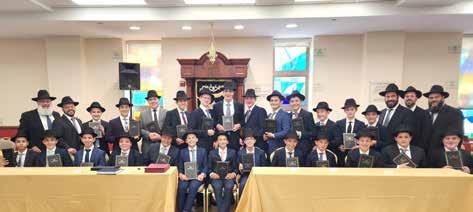


many years in YCQ were displayed as the students looked on, recalling the shared moments they experienced together. The presentation ended with a touching tribute to those who lost their lives on October 7 and in the ensuing war.
Diplomas were then awarded by Rabbi Landsman, Mrs. Malka Fishman, Rabbi Knapp, Mrs. Lowinger, Rabbi Joshua
Rohr, Mrs. Cohen, Dr. Wein, Dr. Eliana Langbaum, Mrs. Valerie Olsen, Mrs. Ora Verstandig, and Mrs. Sharon Korn.
A collation back at YCQ concluded the memorable night. Graduation was an exclamation point to concluding a wonderful year and to recognize all of the amazing talmidim and talmidot of the Yeshiva of Central Queens. Mazal tov!

After several qualifying rounds, nine HALB students participated in National History Day. During the competition, they visited
Washington, D.C., and they competed with close to 3,000 students from around the country.

On Thursday, May 30, HAFTR High School took juniors and seniors to visit the Nova Music Festival Exhibition in Manhattan. The situation in Israel has impacted each one of the students immensely, and learning about it visually is important not only for educational purposes but as a coping tool as well. After seeing heartbreaking videos all over social media, it was essential for the students to have a stronger grasp and emotional connection to the horrific events and the stories of the survivors.
Stepping into the exhibit, students were automatically hit with the intense energy that replicated the festival. The exhibit was nothing like anyone expected or pictured. There was sand and rocks all over the floor to represent the desert, camping chairs, and tents that were taken directly from the festival, with minor details like makeup bags, notebooks, and phone chargers. Walking around, attendees could see screens playing videos of the horrible acts of Hamas on that day, along with footage of civilians running and hiding. In addition, audio played recorded phone calls between children and their parents, many of which were their last conversations. These videos were very emotional and powerful.
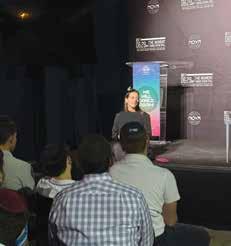
The students were honored to hear from one of the survivors of the festival, Tal Shimoni. Tal shared her story and described the horrors of the day. The speech was given in a very intimate, personal way. The students all sat around Tal while she was sitting in the middle, comfortably with her dog. As Tal began to speak, all eyes were on her. Rather than expressing distress and anger, she ended the speech with a positive life lesson: in the dark, more darkness is not the answer, light is the only thing that will get you through. Tal taught the students that the only way to fight evil is through good and not through revenge. Everyone took that message to heart and walked out of the event with clarity, strength and the desire to do more good in this world.

The fifth grade at Mercaz Academy in Plainview recently finished up their study of the U.S. Constitution with an examination of the judicial branch of government. To better understand the participants and their roles in a court case, the fifth grade conducted two mock trials.
In the first trial, a pet rabbit named Bun Bun was abducted. The students took their roles very seriously and came prepared with evidence, witnesses, and the occasional shocking twist (“how could you see the bunny in the bag if there were no holes?”). The second trial involved a bank robbery. In both cases, the jury thoughtfully considered the evidence, and the judge presided over all, only occasionally relying on her gavel to restore order.
In addition to learning about the significance of the judicial branch and the process of a trial, the students were taught about presenting evidence to support their cases, questioning witnesses to elicit testimonial evidence, and strategies to convince the jury, as well as other skills.
The exercise conducted by Mrs. Karen Fleishman reinforced all the legal terminology and courtroom procedures that the fifth graders had studied, and gave them a new appreciation of the complex nature of the legal system (“how can a lawyer defend someone who is guilty?”). These mock trials developed their critical thinking and public speaking and brought their new knowledge to life in a very enjoyable way.
Dr. Briendy Stern was named academic dean of Touro’s Lander College of Arts & Sciences, Touro President Dr. Alan Kadish announced today. Most recently, Dr. Stern served as academic dean at Touro’s School for Lifelong Education and administrator of the Touro Freshman Center Program in high schools throughout Brooklyn.
Dr. Stern holds a Ph.D. in Social Welfare and Administration from the City University of New York and a MSW from the University of Pennsylvania. She serves on the Touro Undergraduate Deans’ Council, the Committee on Academic Standing and the Student Success Taskforce. Throughout her tenure at Touro’s School for Lifelong Education, Dr. Stern directed student and faculty recruitment, advisement and curriculum development and cultivated critical
community partnerships. She developed and implemented initiatives to support non-traditional students that promoted success and advanced their academic and professional careers.
“Dr. Stern brings years of administrative experience coupled with a passion for developing new initiatives that align with communal needs and a deep commitment to student success,” said Touro President, Dr. Alan Kadish.
In her new role, Dr. Stern is planning to advance the pathways from Touro’s undergraduate programs to the highly-respected graduate and professional programs, enabling students to begin and complete their academic and professional journeys at Touro. She will build upon the newly-launched women’s cohort in the health sciences and medical fields and enhance the accelerated offerings in ac-
counting and computer science. Dr. Stern is committed to identifying educational needs in the community and developing programs to meet those needs.
“My goal is to be able to showcase every student as a success story,” says Dr. Stern. “Each student has his or her own professional goals and we are committed to standing by them throughout the educational process so they reach the next level – be it a job at a top firm or entry into professional school.”
Dr. Stern will also be streamlining various undergrad programs, including School of Lifelong Education and Machon L’Parnasah – under one umbrella so there will be unified admissions, advisement and support.
“Dr. Stern’s empathetic personality, her focus on innovation, her record of working with student, and her intimate

knowledge of the community that Touro Flatbush has served for closer to half a century, position Dr. Stern well to provide effective academic leadership at our campus,” said Dr. Robert Goldschmidt, Executive Dean of the Lander College in Flatbush.


New York State Assemblywoman
Stacey Pheffer Amato visited the TAL (Torah and Language) Academy in Belle Harbor to see firsthand how they are helping students with language-based learning disabilities. The yeshiva opened this year and has had great success.
“It’s clear that this is such a loving and nurturing environment where the students are happy. This type of school and program is a welcomed addition to our community, and I look forward to seeing TAL Academy flourish in the years to come,” said the Assemblywoman.


HANC’s eighth grade dinner was a heartwarming and unforgettable evening, held in the school’s beautifully decorated gym. Each teacher took turns speaking about a student, sharing personal anecdotes and highlighting their unique strengths and achievements. The room was filled with

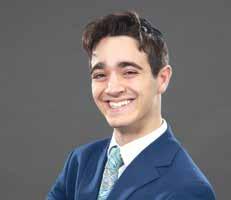

Valedictorian – Shaya Rosenfeld
Shaya Rosenfeld is a remarkable scholar and leader. Excelling in academics, he consistently demonstrated a dedication to learning and intellectual curiosity. His legendary contributions extend beyond the classroom, where he served as the president of the student council, championed numerous community service initiatives such as peer tutoring, i-Shine and Ohel, and served as an integral member of many clubs and teams, such as Debate. His commitment to excellence and your passion for making a positive impact have earned him respect and admiration from peers and faculty alike.
Salutatorian – Aiden Buchbinder
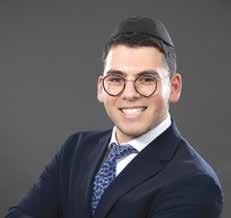
Keter Shem Tov – Doniel Austein
applause and smiles as every student was honored and celebrated for their contributions and growth over the school year. The atmosphere was one of joy and camaraderie, making the dinner a truly special occasion that left a lasting impact on everyone present.
Aiden Buchbinder is truly a “big man on the DRS campus” in all areas of yeshiva life. Be it in the Beis Midrash or on the basketball court in the Green House, Aiden leads with a fantastic combination of talent, hard work and excellent middos. He adds so much to life at the yeshiva with his intelligence, modesty and passion for life. It is clear to everyone that Aiden will achieve a ton next year at Yeshivat HaKotel and then at YU Honors where he will continue to liven things up just like he did at DRS.
Doniel Austein’s journey at DRS has been remarkable. As the goalie of the hockey team, Doniel led the squad to two championship victories and earned MVP both times, consistently proving that nothing gets past him both on and off the rink. His Keter Shem Tov award for outstanding character is a testament to Doniel’s impeccable integrity and the respect he garners from everyone. Above all, his dedication to Torah learning and living as a true Ben Torah shines brightly. As he heads to Yeshivat Shaalvim, DRS eagerly anticipate the many ways Doniel will continue to “defend the goal” of Klal Yisroel.


Mazal tov to the BY5T Pre-1A girls on their Tehillim play graduation



On June 14, 2024, the Village of Cedarhurst celebrated a momentous occasion with the dedication of a new addition to Andrew J. Parise Park, in honor of Ronald Lanzilotta Sr. This new space, fittingly named “The Ronald Lanzilotta Sr. Seniors Corner,” pays tribute to a man who has made lifelong contributions to the betterment of the Village.
Ronnie is an accomplished architect by profession. His work has gone beyond the mere construction of buildings; he has helped shape the very essence and character of the Village of Cedarhurst. His influence is evident not only in the many buildings that dot the landscape, but also in the community spirit that thrives within.
Over the years, Ronnie has served the Village in various capacities. He has
been a member of the Architectural Review Board, where his keen eye for detail and sense of design have ensured that new developments maintain the aesthetic integrity of the Village. His role on the Zoning Board of Appeals has been crucial in overseeing and guiding the growth and development of Cedarhurst.
Ronnie’s leadership and dedication extended to his tenure as a Trustee and Deputy Mayor. In these roles, he worked tirelessly to address the needs of the residents, advocating for policies and initiatives that have contributed to the Village’s well-being and vibrancy.
The dedication of “The Ronald Lanzilotta Sr. Seniors Corner” is a testament to Ronnie’s enduring legacy and the high esteem in which he is held by the community. It serves as a place for seniors to gather, relax, and enjoy the beauty of An-
drew J. Parise Park, reflecting Ronnie’s lifelong commitment to enhancing the quality of life for all who call Cedarhurst home.




There’s nothing more terrifying than feeling totally lost and utterly overwhelmed physically, emotionally and financially, in the giant maze of thousands of doctors and our very complex medical system, all while having to make very difficult decisions often very quickly. But cancer doesn’t care about ANY of this! And often, it can be devastating. To our organization, cancer means WAR, and the only way to win a war is to have a full arsenal of the most powerful weapons and tools to fight with. Rofeh Cholim Cancer Society (RCCS) provides a vital lifeline for cancer patients, offering a comprehensive range of services that make a real difference in their fight against cancer.
RCCS immediately takes the patient’s hand and is there to help them fight this catastrophic illness and give them the best possible chance of recovery and survival. RCCS’s life-saving work is unique. They offer help to every age group, and to people with every type of cancer. RCCS provides a vital lifeline for cancer patients, offering a comprehensive range of services that make a real difference in their fight against cancer. They pay insurance premiums to ensure continuous coverage, provide medical referrals and support from specialized experts, advocate on behalf of patients to appeal unfair insurance denials and offer medical subsidies to help with out-of-pocket expenses. By providing access to the best medical coverage, top-notch doctors and hospitals and emergency financial assistance, RCCS helps patients focus on their recovery, reduces stress and anxiety, and gives them hope for a brighter future. In 2023 alone, RCCS helped 5,194 patients across the world with an annual budget of $29 million. Their team of over 30 can-
cer care specialists are dedicated to helping patients through the whole process… from diagnosis to recovery. But don’t just take their word for it. Rachel, a local cancer survivor, has a powerful story to share about her experience with RCCS.
About two years ago, when I was pregnant with my third child, the doctor noticed a mass while doing a routine check-up. After doing much follow-up testing it was discovered that I had breast cancer, and it had metastasized to my spine and then to my eyes. I was told that I was in danger of losing my eye. At that point, we were seeing various doctors including my regular OBGYN and a doctor at a local hospital.
At one point, I reached out to RCCS regarding our financial difficulties. The person I spoke with asked me kindly if I would describe to them my medical situation, perhaps he could help me out.
After sharing with him the details of my situation, he informed me that in my being 35 weeks pregnant, I needed to be in a facility that would avail to me a top medical team, including a Maternal-Fetal doctor, an ocular oncologist, an ocular surgeon and a top NICU, as it was very possible that they would need to induce the baby prior to my taking chemotherapy.
Up until that point I did not realize the gravity of my situation. When RCCS came on the scene they arranged that I be treated by a top team of specialists in Columbia Hospital in Manhattan. Every bit of my treatment was coordinated by RCCS; my appointments were made by them, after each appointment they explained what my options were, and they helped me make decisions at every step of the way. Aside from the medical aspect, their staff were always there at my side, night or day, to give me the emotional support and answer my questions at any time.


Ultimately, I was induced before I started my chemotherapy treatments, and thank G-d, my child was born healthy. He was able to return home fairly quickly after he was born, and his bris was performed only a few days late, on Chol Hamoed Succos. Soon after the holiday, I was released and able to reunite with him and the rest of my family. Thank G-d, today I am cancer-free.
Thank you RCCS! My life and the life of my child are owed to you!
Just as Rochel found comfort in RCCS’s expert medical guidance and compassionate support, Shalva’s story highlights the organization’s critical financial assistance, which helped her family stay afloat during the darkest days of her illness.
My name is Shalva. I’m a mother of five, living in the Midwood neighborhood of Brooklyn.
When my daughter Rina was diagnosed with leukemia, our world was turned upside down. Our precious daughter, our pride and joy and the most active of the bunch, was so dreadfully ill. At that time, we were looking to see a doctor out of state due to some difficulties with her treatments. The insurance we had was not adequate for out of state visits, and my husband had just recently lost his job. There was no way that we could pay for a new insurance plan for Rina.
Our rav told us about this wonderful organization called RCCS. I gave them a call and spoke with Devorah at the RCCS office. Immediately she assured me that there was nothing to worry about and that we could go out and purchase the insurance plan we needed, and they would cover the bill. After doing my research at an insurance broker, it became clear that our only option was a plan that would cost close to $1,500 a month. At that poin,t I became pretty nervous.
Would RCCS agree to pay such a large amount of money for complete strangers? I called Devorah back and was pleasantly surprised when she told me that of course they would take care of the entire thing in full, “just send us a copy of the bill each month and we’ll mail out a check to the insurance company.” To say we were relieved would be a tremendous understatement!
Rina was sick for about a year-anda-half. During that time RCCS paid for her insurance premiums every single month. Without their help, there was no way that we could have come up with the tens of thousands of dollars needed to pay for her care.
Thanks to RCCS, Rina is now 100% cancer free, and our family is still financially afloat. In fact, it did not affect us financially at all. We are well aware that without the help of RCCS our family would be drowning in debt today and who can know if Rina would be here with us.
May we be zoche to a time when RCCS’s services are no longer needed!
RCCS provides a comprehensive safety net for cancer patients, ensuring access to top-notch medical coverage, emergency financial assistance, and coordinated care. By offering this wide range of services, RCCS ensures that patients receive the best possible care and support during their darkest hours. But we need your help to continue this vital work! We’re running an online campaign on June 25 and 26, and every donation counts. Time is of the essence, so please visit our campaign page at DRYVEUP.COM/RCCS or call 718-722-2002 to donate today. Your support is crucial to helping us win the war against cancer. May your generosity be rewarded with good health for you and your family, and may your donation bring hope and healing to those who need it most.
Question: Why doesn’t Hashem send us to the world with a note about what our specific mission is? Why all the confusion and mystery?
Rabbi Keleman Answers: There are two worlds: Olam Hazeh, this world, and Olam Haba, the next world. Each world has its purpose, and the purpose of the next world is for you — the real you, with all the greatness you have worked to achieve — to sit with Hashem and enjoy closeness to Him, which is the most wonderful thing.
The way that you get there is by traversing this world while working hard to build your full self and realize your maximum potential. This world is sort of like the gym. You come here to work out. When you first land in this world, you aren’t really “you.” You’re a cute bundle of unrealized potential. The whole purpose of this world is for you to bring forth all of your potential and discover who you are, by following the guide that we’ve been given — the Torah. If you give it your all, then at the end of your life, you’ll have brought forth all the amazing potential inside of yourself, and you’ll see who you are.
The Gemara (Niddah 30b) describes how the entire Torah is taught to the child in the womb, but a moment before birth an angel touches the child, and the child forgets all that Torah. The lesson the Gemara is conveying is that before you enter this gym, where you will develop yourself and bring out your potential, you are taught who you are. Hashem shows you your potential and the worldly life you’ll need to live to bring forth that potential. “Are you in agreement?” He asks us. We understand the opportunity we are being offered, so we say, “Yes, please create me!” He sends us down, and before we emerge into this world, He makes us forget all the Torah He taught us in the womb. We forget our identity, and our job is to then use the Torah to bring out all of our greatness and see who we really are.
Did you know?
Rav Shlomo Wolbe used to say that your psychological profile is unlike the psychological profile of any other person on the planet. The same is true of your emotional profile, your spiritual profile, and your physical profile. There has never been anyone like you in history, and there will never be anyone like you in the future. You are a one-time event. If so, then Hashem must have sent you here on a very unique mission.
People ask, what’s my mission? Am I supposed to be the president of the United States? Or perhaps a world-class violinist? Is my main job to be a parent? What am I supposed to do?
The answer is that your job is to give the world a gift that no one else could give. What is that gift? The gift is you! To achieve your potential, with your middos and your dreams and your abilities — that is the gift you must give to the world. The world is desperately waiting for you and the unique impact your presence will make. In the process of bringing out your good middos, dreams, and abilities, you will accomplish many astounding things. The world won’t look the same after you visit, for the better. And that is also your purpose, to leave the world better than you found it. But your main contribution to history is yourself, your perfected character.
Why doesn’t Hashem send us to the world with a note? In many cases, if we knew who we were supposed to be at the end, we would give up immediately, because we would think we are incapable of reaching such high levels. We can’t imagine how giant we are in potential.
Sometimes I work with my students in groups. A student who has been working on himself for only five years might be sitting next to a student who has been working on himself for twenty-five years. They can be in the same group because they happen to be working on the same middah today, but their levels of development in many other areas are vastly different.
“Underground” is the only word in the English language that begins and ends with the letters “und.”
In situations like this, my more experienced students know to conceal some of the more advanced aspects of their character development, so as not to make the less experienced students feel inferior or like failures. The more experienced students know that they themselves might have given up if they had seen how high the mountain gets, and they don’t want to push their less experienced friends into despair.
Having said all of this, it’s not entirely true that we don’t get any note from Hashem at all. Imagine that there is a terrible highway accident, and the paramedics struggle to rescue two badly injured victims from their flaming truck. The victims are alive but unconscious, and they undergo multiple surgeries at the hospital to save their lives, but both remain comatose. Months later, when the physician is checking their status, one victim’s eyes slowly open, and then the other’s do too. They both stare at the physician and ask where they are.
“You were in a car accident,” he explains.
At first there is silence, and then one of the victims whispers to the physician, “Who am I?”
“I also can’t remember who I am,” whispers the other victim.
The physician somberly explains, “Unfortunately, your IDs were destroyed in the car fire. We don’t know your identities, either.”
Again, there is silence. Then the physician walks over to the cabinet on the other side of the room and says, “But maybe

this will help.” He pulls out two toolboxes. “This plumber’s toolbox was next to you in the truck,” he explains, placing it on one victim’s bed, “and this electrician’s toolbox was next to you.” He places that box on the second bed. Now the men at least know that one is a plumber and the other is an electrician.
You have been given that much of a note. You have unique talents and character. The more you push yourself, the more you’ll see that you are extraordinary in certain ways. If you catalog all these potential strengths, you’ll start to get a picture of what someone like you could accomplish in this world, what sort of contributions you could make, and who you could become. So, there is a sort of note we’re given, and we just need to get to know ourselves in order to read it.






It was week 9 and the start of the playoffs at the 5TLL by FM Home Loans this past Sunday. The boys were hyped and ready and enjoyed another amazing, sunny afternoon of baseball. After the game, all league participants received inflatable baseball “beach balls” sponsored by Town Appliance. On Tuesday night, the league held its annual Baseball Night, featuring All-Star games, skills competitions, pizza and more.
K/P Baseball & Soccer Highlights
K/P Baseball: Ari Blobstein made a beautiful catch in the outfield, saving a double for Marciano. Shua Badian from Tikva Fire made an impressive play at shortstop, throwing it to first baseman Izzy Noble, who made a great stop to get the out. Nechamia Oratz had an incredible game, hitting 4 home runs in 4 plate appearances for Rita’s. Rita’s had backto-back home runs to tie the game, with Aryeh Stern and Aaron Waldman each hitting one. Yeruchem Moshayev hit a grand slam to deep left field, securing the victory for LBL. Yehuda Aryeh Jacobson had a great stop at shortstop and threw a perfect ball to Ari Jaroslowicz, who made a great catch to get the out at second base for John’s Automotive. Avrumi Sinensky hit one of the farthest home runs of the season for John’s Automotive.
K/P Soccer: K/P Soccer began their end of season tournament this past Sunday. Wieder Orthodontics and Tikva Fire both scored 3 goals in regulation to send the game into shootouts, in which Wieder Ortho was able to deliver the victory. Hamaspik had a 1 goal lead as time was ticking down, but Maidenbaum made some nice passes to set up the game-tying goal.
1st/2nd Soccer: 1st/2nd Soccer started the playoffs on Sunday. It was an amazing defensive performance by all
teams, as only 2 goals combined were let up. Murray Rosenblatt and Yehuda Dancziger showcased tremendous hustle to help lead NOJO Promo to a 1-0 victory. Maidenbaum played tough all game, defeating Tikva Fire 1-0.
Minors (1st-3rd) Baseball Highlights
1st Grade: Mittman Electric defeated Barbacoa, thanks to a spectacular double play by Avrohom Olshan. The final score was 17 to 9. Yitz Balter had 4 hits and made 3 amazing outs in the field, leading Spray Foam Insulation to a 9 to 5 win over OpenVeranda. Moshe Yifat of Marciano Pediatric Dentistry had a walkoff single, helping his team beat Exclusive Cabinetry 22 to 21.
2nd Grade: Zevi Berman was the MVP for Tikva Fire, hitting 4-5 with 7 RBIs, 2 doubles, a home run, and a single. He also played amazing defense as Tikva Fire beat Sr Whee 19 to 4. Graze beat Town Appliance 17 to 10, with Yitzi Ptalis hitting a grand slam.
3rd Grade: Moshe Tzvi Zakutinksy hit a majestic home run as Bayrock Insurance beat Emerald Health Care 12 to 6. Yehuda Eichorn hit 3 home runs and had 4 RBIs, leading CG Flooring to a 14 to 3 win over Wieder Orthodontics. Target Exterminating beat 5 Towns Central 15 to 12, with Mo Haglili hitting a 3-run home run to take the lead late in the game. Majors (4th & up) Baseball Highlights
4th Grade: Bathtique beat ARG 7 to 4. Tzvi Chafetz had a three-run home run and pitched a shutout while he was on the mound. Tikva Fire beat JNT in a game that started with high scoring in the first inning but settled into a pitching duel. Down 1 run in the 6th, Willy Farber hit a game-tying RBI, sending the game into extras. MVP Solly Shatner had the
game-winning hit for Tikva Fire, avoiding the upset with a final score of 7 to 6. In an upset, Elegant Lawns defeated #1 seed Town Appliance 7 to 5. Elegant Lawns scored 4 runs in the first inning and displayed amazing defense, making only 1 error. MVP for the regular season was Shlomo Cohen, and MVPs for the day were Levy Sherman and Nassan Ludmir, who combined for 8 strikeouts and Ludmir striking out the last batter.
5th Grade: Dovi Weinreb had a walkoff single as Five Towns Landscaping beat BayRock Insurance 9 to 8. Chu’s Meat Market won a back-and-forth game with a magnificent play at home with the bases loaded, beating NY Custom Closets 23 to 17. Tzvi Rosenberg had 2 innings of amazing pitching to close out the game, helping DOMA beat Marciano Pediatric Dentistry 14 to 7.
6th Grade: Dovid Sax and Eli Light played great to help lead Maidenbaum to a 9-5 win over Sliced. Yisroel Mann and Tzviki Schecter played great in the field, and Moshe Eckstein was great at the plate as Carving Block carved out 12 runs in their 12-6 victory over the #1 seeded Wieder Orthodontics.
7th/8th Grade: Bathtique beat JNT 12 to 11 in a thrilling game with 5 lead changes. Bathtique took a 5-run lead into the latter half, but JNT’s big 5th inning gave them the lead. The starting pitcher for Bathtique hit a 3-run bomb to tie the game at 11. With no runs scored in the top of the 7th, Bathtique worked the runners into scoring position, and MVP Yosef Truehaft, who had been crushing it all game and making stellar stretches at 1st base, knocked in the winning run, giving Bathtique their first win of the season.
Men’s Basketball
The men’s basketball semi-finals continued this past Sunday night with a

packed arena and tension in the air. Town Appliance were connecting on all cylinders all game as they easily defeated the 2023 champs by 18 points. Simcha Klien and Captain Adam Ofman led the charge in the 2nd half, scoring almost all of Town Appliance’s 2nd half buckets. In the 2nd game of the night, Rita’s and TimePiece4Torah got locked in a heated battle but the 3 time defending champs widened the lead to 8 with about 2 minutes remaining in the game. However, Abie Perlow of Rita’s scored back to back and-ones to cut the lead to 2 with a minute left but Rita’s was unable to complete the comeback as they miscued on the ensuing inbounds pass and Zev Teitlebaum proceeded to score two easy layups to put the game out of reach. Ephie Hoffman, Yitz Wieder & co will match up against Adam Ofman, Eitan Gettenberg & co in a Championship rematch this upcoming Sunday.
5TLL Game of the Week
In the 2nd grade quarterfinals, John’s Automotive beat NOJO Promo in a close game. NOJO Promo put up 7 runs in the first 2 innings, but John’s Automotive clawed back with 6 runs in the 4th to take their first lead. In the top of the 5th, John’s Automotive scored to tie the game at 8, eventually winning 9 to 8, showing why they were the 2 seed all season.

It was surreal, a scene that will never be forgotten by the thousands who merited to be in the Prudential Center Arena on Sunday night before Shavuos. The Gaon and Tzaddik, HaRav Shimon Galei, shlita, who had come especially from Eretz Yisrael to address the Dirshu Kinnus Olam HaTorah Kabbolas Shabbos maamad, was about to complete his inspiring drasha…when he suddenly changed tones. Instead of ending the drasha with the traditional, “May we be zocheh to the coming of Moshiach,” he began singing!
Yes, Rav Shimon Galei stood there, a beatific smile on his face, microphone in hand, enthusiastically singing the famous song, “Shaarei shomyaim p’sach.” He was calling on Hashem to open the gates of Heaven and open His treasure trove for us…
He then explained, “I feel that at this moment is a tremendous eis ratzon, an opportune time when the gates of Heaven are wide open and we can beg Hashem for all our needs, for all Klal Yisrael’s needs!”
He then began singing the niggun again, unshed tears glistening in his eyes as the nearly 15,000 people filling the stadium joined in a thunderous outpouring of emotion. The entire stadium was on their feet singing “Shaarei shomyaim p’sach!”
Watching Rav Shimon singing, you could see how the worry lines and wrinkles on his face temporarily disappeared. He glowed with simcha, leading the assemblage in song and explaining to them how the zechus of Shabbos itself was opening the gates of Heaven; how Shabbos has the power to save Klal Yisrael from its enemies from within and without; and how this wonderful assemblage that gathered to strengthen themselves in shemiras Shabbos by undertaking to learn hilchos Shabbos daily and comprehensively was the conduit for rachmei shomayim to permeate the entire Klal Yisrael.
The climax of Rav Shimon Galei’s drasha was one of the main highlights and emotional highpoints of a unique, remarkable event experienced by Klal Yis-
rael this past Sunday, the first day of the Sheloshes Yemei Hagbalah, when Dirshu held its massive Kinnus Olam HaTorah Kabbolas Shabbos event at the Prudential Center in Newark, NJ.
Traditionally, Dirshu’s large stadium events have been held to mark milestone siyumim. This event, however, was unique in that it was made to celebrate not a siyum, but a kabbalah, a kabbalah of hundreds of thousands of lomdim the world over accepting upon themselves to learn hilchos Shabbos in Dirshu’s popular Daf HaYomi B’Halacha program that will embark on Chelek Gimel of hilchos Shabbos on Erev Shavuos. It is certainly not coincidental that this kabbalah to learn hilchos Shabbos coincides with the Yom Tov of Kabbolas HaTorah as Chazal teach us that shemiras Shabbos is equivalent to keeping the entire Torah!
It is also not coincidental that the very popular Dirshu Amud HaYomi program is also currently in the middle of learning Masechta Shabbos. Those who participate in both programs thus have the unique opportunity to learn the sugyos in the masechta followed by the practical halacha that emanates from these sugyos.
The Kabbolas Shabbos event was attended by numerous prominent roshei yeshiva, poskim, admorim and rabbanim aside from those who addressed the crowd including Hagaonim HaRav Malkiel Kotler, shlita, HaRav Dovid Schustal, shlita, HaRav Reuven Feinstein, shlita, Harav Hillel David, shlita, HaRav Yaakov Horowitz, shlita, Rosh Yeshivas Beis Meir, HaRav Shlomo Feivel Schustal, shlita, Rosh Yeshivas Tiferes Yerachmiel, Rav Osher Dovid May, shlita, Rosh Kollel of the Passaic Yeshiva, Kollel, HaRav Yerachmiel Ungarischer, shlita, Rosh Yeshivas Beis Medrash Elyon of Bnei Brak, the Verdaner Rebbe, shlita,, Rav Meir Meyers, shlita, Belzer Dayan in Boro Park, Rav Shlomo Leizer, shlita, Sanzer Dayan, Rav Avrohom Spitzer, shlita, Skverer Dayan of Lakewood, Rav Shmuel
Lichtenstein, shlita, Krasna, Dayan, Rav Yitzchok Zalman Gips, shlita, Rav of Khal
Birkas Avrohom HaRav Moshe Chaim
Kahan, shlita, Dayan, Beis Medrash Gov-

oha, Lakewood, and HaRav Moshe Zev Feldman, shlita, Dayan, Beis Medrash Govoha, Lakewood.
In addition to being an evening of kabbalos, the evening was also suffused with niggunim of chizuk and hisorerus beginning with a new niggun “Boi Besholom” sung by the Shira choir. Some of the most talented baalei menagnim inspired the crowd to greater heights in ahavas Torah and shemiras Shabbos – whether it was R’ Baruch Levine singing the words of the beautiful tefillah said by every woman before lighting the candles when she begs Hashem to grant her children who will illuminate the world with their Torah, mitzvos and maasim tovim, or R’ Hershy Weinberger together with a wunderkind soloist singing the new song “Tanu Rabbanan,” full of ahavas haTorah.
Whether it was R’ Zanvil Weinberger singing the words of the Mishnah that “he who engages in Torah is zocheh to so many things,” or the heartfelt singing of R’ Naftali Kempeh as he sang the famed moving Shavuos song, “Kad Yasvin” that describes how Hashem revels in seeing his beloved Nation forgetting about the difficulties in their own lives, and instead deeply engaging in toiling in Torah. The evening was one of chizuk, inspiration, and most importantly, “kabbalah,” about truly making an unbreakable kabbalah to learn hilchos Shabbos and in general upgrade all matters related to Shabbos. Rav David Ozeri: “The Only Way to Win This War is Spiritually!”
One of the most powerful drashos of the evening was the drasha given by HaRav David Ozeri, shlita, rav of the Yad
Yosef Torah Center of Brooklyn. Rav Ozeri cited the words of the Mishnah Berurah in his introduction to hilchos Shabbos, where the Chofetz Chaim calls on every community to establish chaburos, groups of people learning hilchos Shabbos. The Chofetz Chaim adds that making groups and shiurim of people dedicated to learning hilchos Shabbos will bring the geulah closer!
“Dirshu,” Rav Ozeri said, “is therefore actually engaged in bringing the geulah closer by ensuring that so many shiurim and so many groups of lomdim are getting together daily to learn hilchos Shabbos. This gathering here today is certainly a gathering that is bringing the geulah closer!”
Rav Yechiel Mechel Steinmetz: “We Are All Here to Collectively Say, ‘Naaseh V’Nishma!’”
Rav Yechiel Mechel Steinmetz, Skverer Dayan of Boro Park and one of the senior poskim of America, brought out the tremendous quality of achdus that he observed in the crowd.
“We see here,” he said, “G-d fearing Yidden from all walks of life who have come together – Chassidim, Litivishe Yidden, Sefardic Jews, kollel yungeleit, baalei battim, a complete microcosm of Har Sinai about which Chazal teach, ‘The entire Klal Yisrael camped next to the mountain as one man with one heart, with remarkable achdus,’ to do what? To strengthen ourselves in hilchos Shabbos. I feel that today we are all here to collectively say, ‘Naaseh V’Nishma!’”
The Call to Action by the Nasi of Dirshu
“Tayere heiligeh mishpachas Dirshu,

shlita,” was the way, Rav Dovid Hofstedter, shlita, Nasi of Dirshu, began his remarks. One could feel the profound ahavah suffusing those words. It was clear that this was not some figurehead of an organization, detached from the people, addressing his constituents. Rather, he was a yedid, a father figure, and more importantly a family member addressing his wider family with ahavah. Every person in the cavernous Prudential Center could feel the love emanating from the words, “Tayere heiligeh mishpachas Dirshu, shlita.”
The seminal drasha that Rav Hofstedter delivered was not only a rousing speech, but it was also an earnest conversation among friends. It was a very serious, important drasha with a practical message that was delivered with pain and concern over the difficult situation in today’s world.
Rav Hofstedter said, “On the one hand, look at this dor! It is such a beautiful generation! Perhaps in the history of our galus there has never been a generation where so much Torah is being learned. Torah is being learned across the entire world. In Eretz Yisrael from Dan until Be’er Sheva and outside of Eretz Yisrael, in cities and towns literally where until more recently the kol Torah has not been heard, there are kollelim. There are yeshivos and Bais Yaakovs in communities the world over, with tens and tens of thousands of talmidim
“All areas of Torah are being learned. In our entire history, there was never so much talmud Yerushalmi being learned as today. Our generation is producing comprehensive sefarim covering virtually every area of Torah at the highest levels. It is absolutely wonderful! A blessed generation!
“On the other hand… look at the terrible tzaros that we have experienced most recently. We are experiencing a difficult tekufah of hester panim. Is it possible that the tremendous shefah, the tremendous bounty that Hashem has bestowed upon us has distracted us from our ultimate mission in life? Is it possible that with all
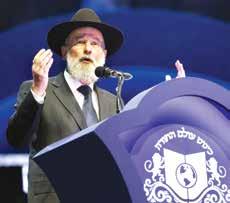
the Torah being learned and with all the wonderful, spiritual developments in our time, that we are missing something?”
With great passion and pathos, Rav Hofstedter exclaimed, “Our generation is such a generation of opportunity! There is so much Torah being learned, so much ruchnyius, so much good! We have the opportunity to soar in ruchniyus. Yet, there are serious challenges.
“Let us not look back at our lives with regret. Let us not one day regretfully look at the missed, unfulfilled potential! Let us not say we could have been bekiim in hilchos Shabbos, we could have kept Shabbos properly without inadvertently transgressing…but we didn’t avail ourselves of the opportunity. Let us not one day have the anguish and regret that ‘I could have been a Shas Yid…’ Let us not one day look back and say, ‘I COULD have brought the geulah, I missed the opportunity…’ Let us not, r”l, be the generation that had so many tzaaros and will one day have to answer the question, ‘Where were you? What were you doing when my children were being slaughtered? Where were you when so many children were being lost to Klal Yisrael? Were you too busy enjoying life when the umos ha’olam were disgracing My Torah?”
With a fiery spark of hope in his eyes, Rav Dovid continued, “Let us rather be the generation of Kinyan Torah! The generation of Kinyan Halacha, of Kinyan Shas, of Kinyan Yerushalmi, of Amud HaYomi and of Daf HaYomi B’Halacha!!
“Let us be the generation whose Father welcomes His children with open arms! Let us be the generation that will finally witness yeshuas Yisrael and welcome the Goel Tzedek!”
“Tattele Kum Shoin Aheim!”
With that rousing ending, Rav Hofstedter was about to step down…
Until something stopped him. What happened next swept the whole crowd into electrified dveikus. Rav Simon Galei quickly stepped up the podium next to Rav Dovid and, as an appropriate book-

end to the entire theme of Rav Dovid’s drasha, grasped Rav Dovid’s hand and began to sing the famous words of the song composed by Rav Don Segal, begging Hashem to come back home to His children, “Tattele kum shoin aheim! Tattele kum shoin aheim!”
It seemed as if the roof was going to blow off of the stadium as the entire khal rose to their feet as one, singing with tangible emotion, “Tattele kum shoin aheim! Our Dear Father, PLEASE COME HOME!”
Rav Yitzchok Sorotzkin:
“Connecting with Masechta Shabbos and Hilchos Shabbos Can Save Klal Yisrael”
HaGaon HaRav Yitzchok Sorotzkin, shlita, Rosh Yeshiva of Telshe and Mesivta of Lakewood, pointed out that in our times, when Klal Yisrael faces a tzaarah, we are often told that we need to strengthen ourselves in matters of shemiras halashon. “While there is no doubt that we should always be vigilant about shemiras halashon, Rav Mattisyohu Salomon commented that if you look at the letters written by the Chofetz Chaim during difficult times for Klal Yisrael during his lifetime, he almost always attributed the difficult times to deficiencies in shemiras Shabbos and in slacking off in limud haTorah. Certainly, in our times, when Klal Yisrael is assailed from within and without by great difficulties, it is time to strengthen ourselves in Shabbos and Torah.”
Another highlight of the event were the video recordings of the Gedolei Eretz Yisrael and Gedolei America, urging Klal Yisrael to undertake learning hilchos Shabbos. A powerful message resonated from Eretz Yisrael during the recent nesius meeting of the Daf HaYomi B’Halacha program with the Gedolei Yisrael of the Yeshiva, Chasssidic and Sefardic communities in Bnei Brak. “Shabbos Encompasses ALL the Mitzvos!”
Another powerful speaker was the

well-known Maggid, HaRav Shimon Spitzer, shlita, who cited the famous Gemara wherein a convert asked Hillel to teach him the entire Torah on one foot. Hillel’s answer was, “What you don’t want someone to do to you, don’t do to another.”
“The question,” Rav Spitzer then asked, “is this the entire Torah?” He then explained, “There are foundational mitzvos that serve as conduits for all the mitzvos. This foundational mitzvah will lead to the others. The same applies to Shabbos. Shabbos is a mitzvah that encompasses ALL the other mitzvos. That is why a person who keeps Shabbos is considered as if he kept the entire Torah while a mechallel Shabbos, r”l, is considered a person who doesn’t believe in anything.”
Rav Spitzer similarly urged the assemblage to feel the taam of Shabbos, to feel the spiritual taanug that Shabbos brings, saying, “This taanug can be felt when someone devotes time to learning hilchos Shabbos.”
Skulener Rebbe and Stutchiner Rebbe Lead Kabbolas Ol Malchus Shomayim
Another climax was at the very end of the maamad with the arrival of the venerated Skulener Rebbe of Boro Park, Rav Yeshaya Yaakov Portugal, shlita, and the Rebbe of Toldos Yehuda Stutchin, Rav Mordechai Zilber, shlita. When the Skulener Rebbe said, “Shema Yisrael,” being mekabel ol malchus shomayim, as the Stutchiner Rebbe looked on, the entire assemblage thundered after him, in a roaring acceptance of ol malchus shomayim. He then said, “Hashem Hu Elokim” seven times, declaring our emunah in Hashem. What an appropriate culmination to a night that was completely devoted to Shabbos, the foundation of our emunah!
To join Daf HaYomi B’Halacha and/or Amud HaYomi, please contact Dirshu at info@dirshunj.org or at 1-888-5Dirshu.
 By Mrs. Sandy Eller
By Mrs. Sandy Eller
It was two days before Shavuos, a time when their respective to-do lists were easily a mile long, but for the wives, mothers, daughters and sisters of Dirshu’s lomdim, nothing was a higher priority on June 9 than being at the Prudential Center for the Kinnus Olam HaTorah Kabbolas Shabbos.
While Dirshu is a men’s learning program, the reality is that it is a family affair for most participants. Wives step up to the plate on a daily basis, taking full responsibility for household affairs, whether it is putting children to sleep without any help, getting those same kids off to school in the morning, or both, and the everyday complications that can arise without warning in any family are dealt without any assistance if they fall out during Dirshu hours. Even small children grow up knowing that that there are times during the day that their fathers are unavailable because Dirshu is sacrosanct, taking precedence over everything
else for its lomdim. Similarly, simchas, family outings and other activities are all planned around the Dirshu testing schedule, because missing a bechinah just isn’t an option.
Given that level of commitment, it comes as no surprise that 2,000 women and girls voluntarily left their many Shavuos preparations on the back burner in order to participate in the Dirshu ma’amad, knowing full well that they would have to burn the midnight oil to make up for the time they spent shepping nachas from their lomdim. Filling over a dozen sections of the Prudential Center, those who flocked to the Dirshu ezras nashim came from Boro Park, Lakewood, Monsey, Flatbush, New Square, Williamsburg and from numerous other communities in the Tri-State area and beyond to show their support for their family members. And anyone who thought that the women and girls who filled the ezras nashim were merely spectators at the sold-out event would have been sadly mistaken, because there is no doubt that


their daily support and countless sacrifices are an essential component of Dirshu’s success.
The energy that crackled in the air from the moment the doors opened at 5:30 PM was evident in Newark until the last participant spilled out onto the streets after 11 PM. Throughout the kinnus, there were women standing out on the concourse pouring out their hearts to the Ribono Shel Olam – some earnestly davening Mincha or Maariv, while others were silently murmuring Tehillim. The waves of spontaneous joy that had the men rising from their seats, their hands clasped together as they swayed exuberantly in time to the music after the siyum on Cheilek Bais of Mishnah Berurah flowed behind the curtain as well. While some clapped, hummed and sang along softly, a group of girls standing out on the concourse joined hands on the spur of the moment doing a spirited dance of their own celebrating the never-ending commitment to limud Torah.
With Dirshu placing significant time
demands on its lomdim, it would stand to reason that those realities might prove difficult for their family members. But for the women and girls of Dirshu, nothing could have been farther from the truth.
Mrs. Yides Krausz of Monsey came to the kinnus along with her daughter Chevy to celebrate her husband and her son, both Dirshu participants. Father and son are on the phone constantly discussing Dirshu, and whenever there is a test coming up, they learn together and challenge each other. Once the bechinah is behind them, the two compare answers asking each other, “What did you write for this one?”
“The week before a test, my father is fully involved, no responsibilities,” said Chevy Krausz. “He is in shul learning and learning, and we are so proud. We would never want to call him and bother him while he is learning, because we know how important it is.”
An upcoming pidyon haben in Brooklyn scheduled for the same day as a Dirshu test had the Krauszes thinking creatively.
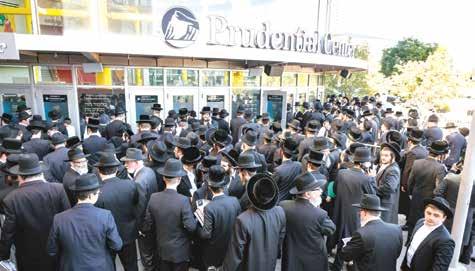

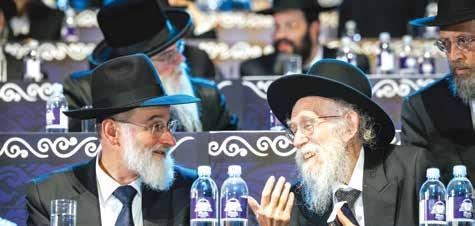
“Maybe we will go, and he will take the test there,” suggested Mrs. Krausz. “There are so many things that we work around them. It is a zechus to be part of the Dirshu family. It has transformed our family in so many ways.”
Chevy Krausz recalled how she felt when she and her mother attended Dirshu’s first major siyum event.
“We kept feeling like we wish Tatty would be doing Dirshu,” she shared. “Now he is part of it, and we are here with such excitement.”
That same ironclad commitment is part of the life of the Waldman family from Monsey. Rabbi Waldman, who is part of kollel chatzos, goes to sleep early each evening so that he can learn in the middle of the night, a situation that proved problematic when the first Waldman grandson was in shidduchim. He had been dating someone seriously, and



while it seemed apparent that a mazel tov was looming, the timetable moved along faster than the Waldmans had expected.
“My daughter called at 8 o’clock to tell me what was happening, and she was going to postpone the l’chaim until the next day since my husband was already asleep, but I told her she couldn’t do that,” recalled Mrs. Waldman. “I let her speak to my husband who was half asleep, and we made it to the l’chaim. The next time we had a mazel tov with a grandchild’s l’chaim, I had to wake him up again.”
“We are so grateful for Dirshu that we just make it work whenever we have a simcha or anything else,” said Mrs. Goldy Pal of New Square whose husband, sons and son-in-law all learn in Dirshu programs. “They live with Dirshu, and we get the electricity from them.”
There are no snow days, sick days or vacation for Dirshu families, who are
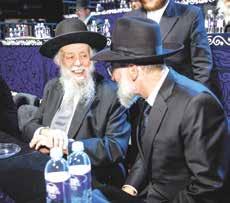
committed heart and soul to limud Torah. One Monsey woman shared that because her husband works during the week, he dedicates Sunday to Dirshu. He spends the entire day learning, coming home from 6 to 6:15 to eat supper before going back out to continue learning. She admits that being fully responsible for the entire family all day, every Sunday, can be difficult, but she wouldn’t have it any other way.
Those thoughts were echoed by Mrs. Faigy Taub of Flatbush, whose husband gives an early morning Dirshu shiur before going to work and a phone shiur at night. Keeping her children quiet during the teleconference in a small apartment is often challenging. Similarly, keeping everyone happy, entertained and productive falls entirely on her shoulders on Shabbos afternoons, when her husband is completely immersed in his learning.
“No matter what, Torah is first,” said Mrs. Taub. “In the heat of the moment it might be hard, but I know that I never lose out because my husband is learning. I am not giving up anything – I get so much out of his learning.”
Many of the women who came to the Prudential Center had no relatives who are part of Dirshu, but they joined the ma’amad to be part of an impactful gathering for Olam HaTorah.
A pair of twenty-somethings shared that they couldn’t understand some of the divrei chizuk that were in Yiddish, but that they were still grateful to have been part of such a powerful event. One woman confided that her husband isn’t learning with Dirshu, but that she hopes he will be in the near future, while another just said wistfully, “I wish I could be part of Dirshu.”



1. “When I was a boy of fourteen, my father was so ignorant I could hardly stand to have the old man around. But when I got to be twenty-one, I was astonished at how much he had learned in seven years.”
2. “[Teaching Fathers how to Diaper a Baby]: Spread the diaper in the position of the diamond with you at bat. Then, fold second base down to home and set the baby on the pitcher’s mound. Put first base and third together, bring up home plate and pin the three together. Of course, in case of rain, you gotta call the game and start all over again.”
3. “When a father gives to his son, both laugh; when a son gives to his father, both cry.”
4. “My father carries around the picture of the kid who came with his wallet.”
5. “A father is a man who expects his son to be as good a man as he meant to be.”
6. “By the time a man realizes that maybe his father was right, he usually has a son who thinks he’s wrong.”
7. “I cannot think of any need in childhood as strong as the need for a father’s protection.”
8. “[My father] was a great father before politics, a great father during politics, and a great father after politics.”
9. “Father, I cannot tell a lie. I did it with my little hatchet.”
As Dad does every Sunday, he is puttering around the house, fixing everything that you and your siblings

A. William
B. Frank A. Clark
C. Charles Wadsworth
D. Jimmy Piersa
E. Sigmund Freud
F. Mark Twain
G. George Washington
H. George W. Bush
I. Rodney Dangerfield

broke over the last week. At some point, he realizes that he needs something, so he goes to a hardware store and asks for help in finding what he needs. The clerk shows him where the objects are and tells him that they cost $1 each. Dad says, “I’m taking 600, so here’s $3.” What did he buy?
Answer: Three home address numbers consisting of a six and 2 zeros.
1. Which NHL team has the most Stanley Cup championships?
a. Detroit Red Wings
b. Montreal Canadians
c. Toronto Maple Leafs
d. NY Rangers
2. Who is the only player who was the captain of two different NHL teams and led them both to championships?
a. Mark Messier
b. Wayne Gretzky
c. Jacques Lemaire
d. Jaromír Jágr
3. Phil Housley played in the NHL from 1982 to 2003. How many Stanley Cup championships did he win?
a. 14

4. Which NHL player has the most Stanley Cups?
a. Yvan Cournoyer
b. Claude Provost
c. Henri Richard
d. Red Kelly
5. The NY Islanders won a total of 4 Stanley Cups. Over how many years did they win those Cups?
a. 23
b. 8
c. 6
d. 4
6. Who scored the doubleovertime goal in Game 7 of the 1994 Eastern Conference finals, to send the Rangers to the Stanley Cup for the first time since 1940?

a. Adam Graves
b. Stephane Matteau
c. Mark Messier
d. Brian Leetch
Answers:
1. B- The Montreal Canadians have 23 Stanley Cup championships (plus one before the league was known as the NHL)
David has just received his brand new driver’s license. The family parades out to the driveway and climbs in the car, where he is going to take them for a ride for the first time. Dad immediately heads for the backseat, directly behind the newly minted driver.
2. A- Of Messier’s six Stanley Cup champions, he was the captain of the Oilers in 1990 and the Rangers in 1994.
3. J- Poor Phil Housley played for 21 years, and all of those broken teeth later, he never got to drink out of the Cup.
4. C- From 1956 to 1974, Richard won 11 Cups with the Montreal Canadians.
5. D- The Islanders won all of their Cups from the 1980 season through the 1983 season.
6. C- “Matteau! Matteau! Matteau!” Perhaps the most memorable play-by-play call in sports history took place when Stephane Matteau scored in double-overtime of game 7, earning the Rangers a trip to the Stanley Cup. The call was made by Howie Rose.
Scorecard:
5-6 correct: If it was up to me, your name would be engraved in the Cup!
3-4 correct: Not bad; I guess you got a Hat Trick.
0-2 correct: Took a hockey puck to the head?
“I’ll bet you’re back there to get a change of scenery after all those months of sitting in the front passenger seat teaching me how to drive,” says the beaming boy to his father.
“Nope,” comes Dad’s reply. “I’m gonna sit here and kick the back of your seat as you drive, just like you’ve been doing to me all these years.”
 By Rabbi Berel Wein
By Rabbi Berel Wein
It is a terrible personality trait to be a complainer. It is hard to live with complainers at home, in the workplace, and in the community. In this week’s parsha, we are made aware of the dismal consequences of complaining. Rashi points out that the complainers in the desert had no real basis for their complaints. They were just dissatisfied somehow, and so they complained against Moshe and eventually against
G-d. Moshe, in his final oration to the Jewish people in the book of Devarim, will himself complain that the people of Israel are unnecessarily quarrelsome and a bunch of complainers.
There is a Jewish joke – more ironic than funny – about three Jewish matrons eating lunch at a restaurant in New York. The waiter approaches them in the middle of their meal and asks them, “Is anything alright?”


Rashi’s interpretation of the lack of justification for complaints in the desert portrays for us a very serious character defect within the Jewish people. They are chronic complainers, and a vast majority of the time their complaints are baseless. The many complaints in the desert follow the usual pattern – food, Moshe’s leadership, the unfairness of life, and the diffi-
self-justification and self-empowerment. When that need is fulfilled, we are happy, and optimistic. When that ingredient in our soul and psyche is absent, we are complainers, carpers, sad, and sometimes destructive people. We recite in our daily morning prayers the statement as to how fortunate we are to be the special people that G-d has chosen to lead the world in
Nothing is perfect in life but that is not a justification for complaints.
culty of living up to the role of being the chosen people.
All through First Temple times we find that the prophets of Israel were barraged with complaints about their mission and words. The prophets were the solution to Israel’s troubles. The people complained that they were the problem. Destruction and exile came in the wake of the unjustified complaints.
I am not a mental health professional by any stretch of imagination. Yet my instinct tells me that chronic complainers are not happy with themselves and project that dissatisfaction outwards on events and humans that are not the cause of their original dissatisfaction. There is something deep within us that requires
service to Him. We may all recite that prayer but how many of us are really convinced in our heart of hearts of its truth?
The rabbis of the Talmud harshly disdained the chronic complainer – “Is it not sufficient for you that you are alive?” Nothing is perfect in life but that is not a justification for complaints. We are bidden to deal with problems to the extent that we can and not to dwell on them and constantly complain about them. We have to seek an inner peace that will allow us an optimistic attitude and an avoidance of complaints. Our parents, schools, and society should somehow concentrate on achieving this goal with our coming generations.
Shabbat shalom.

The Torah says that “with the word of Hashem they camped, and with the word of Hashem they traveled” (Bamidbar 9:20). All of us are on a journey through life, and this journey must be undertaken with Hashem’s guidance. What does He want us to know to succeed in our trek through this world?
I would like to share a remarkable teaching from Rav Yaakov Abuchatzeira, zt”l , found in the sefer Pituchei Chosam, explaining the deeper meaning of the dialogue between Moshe Rabbeinu and his father-in-law Yisro (ibid. 10:29-34). In this conversation, Moshe Rabbeinu is the soul, consisting of three parts, the nefesh, ruach, and neshama. Thus, Moshe’s side of the conversation uses the first-person plural – “we.” Yisro is the body. Rav Abuchatzeira explains that “it is known that the body is made of coarse material. Its desire and longing is therefore to attach itself to the vanities of this world and its pleasures; while the soul’s desire and longing is only for Torah and good deeds, which are her primary purpose for coming [into the world] because she is a piece of G-d above.”
Because the body will eventually end up in the grave, the soul tries to cause it to realize that pursuing physical pleasures to the exclusion of eternal, lasting goals is pointless. And because the soul is dependent on the body to fulfill its eternal purpose, it attempts to enlighten the body to focus on the supernal parts of life that benefits the body as well as the soul.
When the pasuk says, “And Moshe spoke,” it refers to the soul. “To Chovev [Yisro]” refers to the body because the word Chovev comes from the root word
 By Rav Moshe Weinberger
Adapted for publication by Binyomin Wolf
By Rav Moshe Weinberger
Adapted for publication by Binyomin Wolf

meaning “precious,” since the body can also recognize the preciousness of Torah and good deeds. The Torah calls Yisro “ben Reuel,” which literally means “friend of G-d” – even the body is called Hashem’s friend when it works to learn Torah and do mitzvos. The pasuk then describes Yisro as “chosein Moshe,” father-in-law of Moshe. But the word for father-in-law also means “chassan ,” groom, because the body is the soul’s partner in their joint pursuit of Torah and mitzvos in this world.
The soul tells the body, “We are traveling.” The soul is trying to deliver the message that no one knows how long he or she will be in the world such that he could think, “Because I have a long time still left to live, I can do teshuvah later.” Every day could be his last. Accordingly, she tells the body that “we are traveling” from this world today or tomorrow. We
must live today with our eternal welfare in mind because we do not know how much more time we have.
Moshe continues that we are traveling “to the place,” meaning to the World to Come, “about which Hashem said, ‘I will give it to you.’ Go with us.” In other words, “Follow our advice and only devote yourself to good deeds.” If you do this, Moshe/the soul assures the body, “We will cause it to be good for you.” Meaning that through Torah and mitzvos, the body also gets tremendous benefit, because it is only through those good deeds that it merits to come alive again at the time of the resurrection of the dead. It will then have its soul returned to it and attain great and lofty spiritual levels.
The soul then clarifies that the body will also benefit because “Hashem has spoken good regarding the Jewish peo -
ple.” Resurrection of the dead is only for the Jewish people. The soul tells the body, “Because we have a right to earn this eternal award, why should we miss out by squandering our life here on earth with ephemeral and fleeting pursuits?”
At first, the body refuses: “And He [Yisro] said, ‘I will not go.’” Because its nature is part of the natural world, it responded that it would not follow the soul’s advice by nullifying the pleasures of this world. “Instead, I will go to my land and birthplace.” The body demurs, saying that it will follow its own earthly, physical nature and pursue the pleasures of this world.
Moshe/the neshama therefore redoubles her efforts: “Do not abandon us!” The soul needs the body because it is only through the body that the soul can act in the physical world. “You know our encampments in the desert.” In other words, “You know that our only encampment in this world is within you.” The pasuk hints at this because the word desert, midbar, also means “one who speaks – midaber – a human being. The body is the soul’s “spokesman” because only through the body can the soul engage with the world.
The soul then continues, “And it will be when you go with us…” As we know, the word meaning “and it will be” implies joy and happiness (Bereishis Raba 43:3). The soul is telling the body that it can experience no greater joy than going with her and following her guidance. “You will receive that same good that G-d will do with us.” In other words, “You will enjoy that same world of the resurrection of the dead that we will enjoy,”
The body then agrees, as the next pa-
suk says, “And they traveled from the mountain of G-d.” The mountain hints at the evil inclination (see Sukkah 52a). The body, together with the soul, travels away from evil and the pursuit of ephemeral pleasures. The Torah then says that the newly unified team traveled “a three-day journey.” This hints at their devotion to the three parts of Torah to which a person dedicates himself – Tanach , Mishnah , and Gemara (Kiddushin 30a).
We find additional good advice in our journey through life from a sweet story of Rav Nachum Chernobyler, zy”a, known as the Meor Einayim.
One day, it happened that the family panicked because one of the Meor Einayim’s young grandchildren, Yochanan, who was called Yochantche, was missing. The family could not find him, but they knew that the Chernobyler had special eyes, so they ran to the boy’s grandfather to see if he could tell them where to find little Yochanan. The Rebbe “looked” for his grandson and told the family, “I do not know where Yochantche is, but he is alright. You will see that he will return home soon on his own.”
When the boy came back home, they
brought him to his grandfather. The Meor Einayim sat his grandson on his lap and asked him to tell him where he had gone and what had happened. The boy answered,
I heard two Jews talking outside Zayde’s house, and they said that
potential buyers came to “test drive” each horse, I noticed that some of them were a pleasure to ride. When the driver indicated that the horse should turn right, it turned right. When they indicated that the horse should stop, go, slow down, or speed
The soul is telling the body that it can experience no greater joy than going with her and following her guidance.
Eliyahu HaNavi was in the marketplace. I got excited, and so I went to the market. I looked around, walking past each of the stalls. I saw many of the Jewish merchants, but I did not see Eliyahu. When I reached the end of the market street, there was a square with horses in a pen available for sale. I stood on the side watching. And I noticed that there were two types of horses. When the
up, the horse would immediately do it. But I noticed a different type of horse. There were some who were always conflicted, going this way and that, and the people test driving those horses were constantly struggling with their horses and attempting to cause them to go in the right direction. After watching for a while, I noticed that the horses who were attentive to their drivers’
directions had all gone home with nice Jewish owners. But the rowdy, chaotic horses remained there still for sale at the end of the day.
The Meor Einayim told Yochantche that it seemed to him that he did see Eliyahu HaNavi in the lesson he learned from those horses. When the body, which is a Jew’s horse, listens to the soul’s guidance and advice, both of them are happy and both of them benefit in the long term. When one’s body remains conflicted and ignores the good advice of its rider, its soul, no one is better off in the end.
May all of us merit that our bodies and our souls work together in harmony harnessing the guidance of our souls and the power of our bodies to sanctify the physical world with the light of Hashem’s Presence throughout each of our journeys in life.
Rav Moshe Weinberger, shlita, is the founding Morah d’Asrah of Congregation Aish Kodesh in Woodmere, NY, and serves as leader of the new mechina Emek HaMelech.




 By Rabbi Shmuel Reichman
By Rabbi Shmuel Reichman
Chanukah was approaching, and the first grade teacher wanted to give his class a fun assignment. He asked his students to draw a picture of something they were thankful for, and at the end, they would hang them all together in a collage. Most of the students drew Chanukah-related images, but Jacob drew a different kind of picture. Jacob was a different kind of boy. He came from a disadvantaged family, he struggled in school, and he had trouble making friends. As the other children played, Jacob was likely to stay back and stand by his teacher’s side.
His picture was an outline of a hand — just an empty hand, nothing else.
Jacob’s abstract image captured the imagination of his peers. Whose hand could it be? One child guessed that it was Jacob’s own hand. Another suggested that it was a police officer’s hand, because the police protect and care for people. Others guessed it was the hand of Hashem, because Hashem takes care of us and gives us everything. And on the discussion went. When the children had gone on to other assignments, the teacher paused at Jacob’s desk, bent down, and asked, “Whose hand is it?”
The little boy looked away and whispered, “It’s yours.”
The teacher recalled the times he had taken Jacob’s hand and walked with him here or there. How often he had said, “Take my hand, Jacob, we’ll go outside” or “Let me show you how to hold your pencil” or “Let’s do this together.” Jacob was most thankful for his teacher’s hand.
Brushing aside a tear, the teacher went on with the class, touched by Jacob’s gratitude.

is the myriad of brachos intertwined into the fabric of daily living. From the moment we wake up (Al netilas yadayim) until the moment we fall asleep (Hamapil ), we recite bracha after bracha on every imaginable aspect of our lives — before and after eating, throughout davening, even after going to the bathroom. Every milestone of life is accompanied by a unique bracha as well: from the birth of a child, followed by bris milah and pidyon ha’ben, and subsequently to mark marriage and even death. Life’s milestones are marked and elevated through brachos
Although we likely take it for granted that brachos are a pillar of our daily lives, they have not always existed as they do now. Until the Second Temple era, there was no standard set of brachos or prayer. The only brachos that are D’Oraisa
(commanded in the Torah) are Birkas Hamazon (the blessing after bread) and [possibly] Birkas HaTorah (the blessing on Torah). (There is a debate amongst the commentators whether Birkas HaTorah is a Torah commandment or of rabbinic origin. The Rambam omits it when counting the mitzvos, but others, such as the Ramban, posit that Birkas HaTorah is, in fact, a Torah commandment. This topic [as well as the Rambam’s opinion on this subject] requires a more in-depth discussion, one that is beyond the scope of this article.) All other brachos and their official texts were instituted by the Anshei K’nesses Hagedolah in the Second Temple Era.
This begs the obvious question: What changed? What prompted the Anshei K’nesses Hagedolah to introduce such a
major change in Jewish daily life?
Before we can understand the shift that necessitated this monumental change, we must first explore the nature of brachos in general.
The common translation of a bracha’s opening — “Baruch atah Hashem” — is “Blessed are You Hashem.” What does this mean? Can Hashem, the infinite and perfect G-d, benefit from our blessings? More generally, what is the nature and purpose of a bracha?
Bracha: From Oneness to Twoness
When Bilaam is hired by Balak to curse the Jewish People, he attempts to do so but unwittingly proclaims elaborate blessings instead. On the surface level, it is clear that brachos reflect a positive force, while curses signify the opposite. However, there are layers of depth beneath the surface. Let us delve deeper into the true nature of brachos and klalos in order to understand their profound spiritual nature.
The prerequisite for any discussion of brachos is the understanding of how Hashem relates to the physical world. Hashem is infinite — beyond physicality, unconfined by time or space. He is not within this world, nor is He a being; the world, and being itself, are within Him. Hashem is absolute oneness without any components, finitude, or multiplicity. The physical world, in contrast, is finite, existing in a realm of time, space, and multiplicity.
How, then, does Hashem connect to this physical world? How can that which is transcendent and infinite connect to, and manifest within, our finite, particular world? The answer is through bracha, the flow of abundance and multiplicity (tosefes v’ribui ) that stems from Hashem’s transcendent oneness. Bracha represents
the transition from infinite oneness to particular twoness — the process by which Hashem’s divine energy (shefa) flows into this world.
As we will soon elaborate, our brachos are directly related to this process. It is important, though, to recognize the distinction between the concept of bracha and the particular brachos that we say. The previous paragraph defined the concept of the bracha as the flow of abundance and multiplicity (tosefes v’ribui ) that stems from Hashem’s transcendent oneness. Below, we will discuss the nature of the brachos that we, human beings, recite.
In Hebrew, the word for something is not merely an arbitrary reference or description but a revelation of its very essence. In other languages, words are simply agreed upon conventions that refer to a certain object or concept. These conventions are accepted as a practical means to enable communication. In Hebrew, though, each word is an objective reflection of the entity’s very nature and essence. This is why the Hebrew word for “word” and “thing” are the same — davar A word is essentially that which it describes.
This phenomenon reflects a deep concept: Speech is the mechanism for taking that which is infinite, beyond words, and giving it concrete form and expression. When we communicate through speech, we take our abstract and infinite thoughts and encase them within finite words in order to give them tangible expression in this world. This same process is the mechanism that Hashem used to create the world. He took that which is infinite and condensed it into a finite expression of that spiritual and ethereal essence. This is why the Torah describes Hashem’s creative process as a form of speech; Hashem “spoke” existence into being (Bereishis 1:3). Hashem brought the world into existence through the letters of the aleph-beis; thus, by analyzing Hebrew words and the letters that comprise them, one can infer the thing’s very essence and nature.
The Maharal describes the letter beis as the letter of twoness — multiplicity and physicality — the characteristics of our physical world. Aleph, on the other hand, is the letter of oneness — transcendence and spirituality — reflecting Hashem and the spiritual dimension. Aleph is the very first letter in the aleph-beis and has the numerical value of one. It is a silent letter, reflecting its spiritual, transcendent nature. It also reflects spiritual elevation,
as expressed in many words that have the word aleph (aleph, lamed, peh) as their root. “Le’aleph” means to teach, elevate, or lift to a higher spiritual dimension; “aluph” refers to the highest-ranking military position; and “eleph” is the highest number in the Hebrew decimal system.
The very physical makeup of the letter aleph reflects its elevated spiritual level. The Ramchal points out that the letter aleph is comprised of three smaller letters: two yuds and a vav. The total numerical value of these three letters is twenty-six, the same as yud-kei-vav-kei, the name of Hashem — again, that which is transcendent and complete oneness. (This is the Shem Havayah, the name that describes
This is why the Torah begins with the letter beis. Torah is a physical array of finite words, all of which are a loyal reflection and emanation of Hashem’s wisdom and absolute oneness. Furthermore, the Torah begins by describing Hashem’s creation of the physical world, a process most appropriately embodied by the letter beis — the letter of twoness that stems from oneness. The letter beis reflects the process of Hashem’s oneness becoming expressed into our physical world. This is in contrast to the Aseres Hadibros, which begin with an aleph. While the episode of Creation epitomizes the finite expression of multiplicity that stems from oneness, Matan Torah was the exact opposite; the giving of
Receiving bracha means receiving Hashem’s goodness and expression in this world.
Hashem as the transcendent source of our physical reality, in comparison to Elokim, the name of Hashem that describes how He relates to, and is manifest within, our physical world.)
Bracha: the Word of Twoness
The oneness of aleph can be held in direct contrast to the twoness of beis. There is an enigmatic Midrash which states that the letter beis was chosen from all twenty-two letters of the aleph-beis to begin the Torah (Bereishis). The Midrash (Yalkut Shimoni, Bereishis 1:1) clarifies Hashem’s decision by explaining that the letter beis stands for the word bracha Many commentators, especially the Ibn Ezra, struggle to understand this explanation. After all, the letter beis is the first letter of many negative words as well. Why is its connection to bracha the only one considered?
The Maharal (Tiferes Yisrael 34) explains this Midrash in a profound and beautiful fashion. Beis doesn’t “stand” for the word bracha; it is the letter of bracha. Beis is the letter of twoness and multiplicity; bracha is the word of twoness and multiplicity. Beis, reish, and chaf, the shoresh of the word bracha, are each letters of multiplicity: Beis has the numerical value of two, chaf is twenty, and reish is two hundred. These are all the letters of twoness, and bracha is the paradigmatic concept of twoness as well. Bracha is the mechanism of expressing Hashem’s oneness into the world, expanding into twoness through tosefes v’ribui.
does not need our blessings. Rather, there are two simultaneous intentions that we must have when making a bracha. The first, as Rabbeinu Bachya explains, is to acknowledge Hashem as the source of all blessing, abundance, and goodness in the world (Rabbeinu Bachya, Kad Hakemach, Bracha). This is a meditation of hakaras ha’tov (recognition of the good) and a practice of sourcing all multiplicity and bracha back to its source. In essence, when we make a bracha, we are recognizing Hashem as the source of all bracha
Our second intention, as the Rashba (Shu”t HaRashba 5:51), Vilna Gaon, and Nefesh Hachaim (Nefesh Hachaim 2:2, 2:10) explain, is asking Hashem to continue to abundantly manifest into this world and into my personal life.
the Torah was the elevation and ascension from twoness to oneness, an unparalleled experience of truth, oneness, and the transcendent spiritual dimension of reality. It was an experience of Hashem Himself and therefore begins with the letter of oneness and transcendence — aleph.
The Ramchal (Daas Tevunos 46) explains at length that Hashem created this world for the sole purpose of giving us bracha. The Ramchal translates bracha as goodness, shefa (spiritual energy), and light. In other words, bracha is Hashem’s expression into, and revelation in, this world. Receiving bracha means receiving Hashem’s goodness and expression in this world.
At this point, we need to make an important distinction. There is a fundamental difference between twoness that is connected to oneness and spirituality, which we will refer to as bracha, and twoness that is purely physical and disconnected from spirituality. Detached and disconnected twoness is lifeless, purposeless, and dead. Twoness that is connected to oneness is a physicality infused with vibrancy, always expanding beyond its apparent limits and borders. Such physicality is constantly expanding, as it is connected to a higher source. This is a physicality rooted in bracha, fully connected to its spiritual root.
When we recite brachos and say, “Baruch atah Hashem,” we are not blessing Hashem. Hashem, infinite and perfect,
The first step is recognition and connecting back to Hashem — our Source. The second step is an exercise of will; we attempt to bring Hashem into this world and ask that He manifest abundantly — both into the world in general and into our individual lives. In our next article, we will delve deeper into this fascinating topic and try to understand the concept of brachos and klalos on an even deeper level.
Our mission is to use the physical world as a medium through which we connect to Hashem. We don’t only ask for bracha; we create it by actively seeing Hashem’s presence flow into every aspect of our lives. May we be inspired to live lives full of bracha, sourcing every dimension of our lives back to Hashem and living a life of oneness within this world of twoness.
Rabbi Shmuel Reichman is the author of the bestselling book, “The Journey to Your Ultimate Self,” which serves as an inspiring gateway into deeper Jewish thought. He is an educator and speaker who has lectured internationally on topics of Torah thought, Jewish medical ethics, psychology, and leadership. He is also the founder and CEO of Self-Mastery Academy, the transformative online self-development course based on the principles of high-performance psychology and Torah.
After obtaining his BA from Yeshiva University, he received Semicha from Yeshiva University’s RIETS, a master’s degree in education from Azrieli Graduate School, and a master’s degree in Jewish Thought from Bernard Revel Graduate School. He then spent a year studying at Harvard as an Ivy Plus Scholar. He currently lives in Chicago with his wife and son where he is pursuing a PhD at the University of Chicago.
To invite Rabbi Reichman to speak in your community or to enjoy more of his deep and inspiring content, visit his website: ShmuelReichman.com.
Some things just never change. When someone joins a weight loss group, some people ask, “Can’t you just diet by yourself?” When someone sees a nutritionist, some people ask, “Can’t you just eat healthy?” The presumption of these questions is that a weight loss group or a nutritionist just facilitate something you can do on your own. Of course, a nutritionist would vehemently disagree. However, supposing they indeed only provided moral support in one’s quest to be healthy. Wouldn’t that suffice? It is an aspect of human nature that people often tend to be lax in issues relating to their health. Any possible advantage we can gain to overcome this should be implemented. This is nothing new. Even two thousand years ago, people needed extra encouragement to follow healthy practices.
The Gemara in Bava Metzia discusses what material possessions should be left with a debtor when collecting a loan. (There is a disagreement among the Rishonim as to the precise circumstances the Gemara is referring to.) A beraisa (113b) states that a debtor must be left with two beds. The Gemara questions why an individual needs two beds. The Gemara explains that one bed was used for eating (people used to recline while eating), and one bed was for sleeping. Why was it necessary to have two beds? Couldn’t he use the same bed for eating and sleeping? The Gemara quotes a statement from Shmuel attesting to the fact that sleeping immediately after eating without even taking a walk of a few steps can be extremely detrimental to one’s health.
Rashi explains that one positions the sleeping bed four amos (six to eight feet) from the bed on which he eats. This will ensure that he walks at least this far after eating before sleeping. Yet seemingly the same question can still be raised. Why can’t the debtor use the same bed for eating and sleeping? To overcome the relevant health issue, the debtor should simply get up after eating, take a short walk, and return to the same bed to sleep. The creditor should have a right to take

the extra bed. It’s not a necessity. It’s a luxury! It seems that the debtor would personally rather take a meaningful walk from one bed to the other, instead of simply encircling his only bed. That’s a personal preference! Rashi seems to answer this by saying, “This will condition him to get up and walk…” Of course you could always tell a person he needs to ex-
ally sleeps). Humans always need various ploys to get them to follow healthy habits. Chazal considered this particular ploy not a luxury, but a necessity.
It is interesting that a few pages earlier the Gemara also discusses what would seem to be a meaningless walk. The Gemara notes that Rebbe Yochanon is of the opinion that it is not considered advanta-
The further away one lives from a shul, the more reward he will get for all the steps he takes in walking to shul.
ercise. How many doctors have told their patients that they need to exercise? Yet how many actually do?
We could tell the debtor, “Don’t fall asleep! Get up and walk around!” Yet we all know that after a nice, good meal, he most likely will be too sleepy to get up. After all, this is where he sleeps anyway. The next time he eats, he’ll be sure to walk around before sleeping. But it’s always the next time. The solution therefore is to leave the debtor with two beds. He’ll be forced to get up before sleeping (assuming he wants to sleep in the bed where he usu-
geous to live close to a shul. Rebbe Yochanon said the further away one lives from a shul, the more reward he will get for all the steps he takes in walking to shul. Rashi explains that Rebbe Yochanon came to this conclusion by witnessing the actions of a widow. One day, Rebbe Yochanon saw her davening in his neighborhood. He asked her, “Isn’t there a shul in your neighborhood?” She replied, “But isn’t there a reward for the additional steps?”
The Mishna Berura cites this as practical halacha. If one has a choice of two shuls to daven in, one should daven in
the farther shul. The Divrei Malkiel is incredulous. What point is there to daven at a shul simply because it’s farther away? It’s meaningless! He, therefore, limits the application of the Gemara.
However, the Chaya Adam and the Mishna Berura understand the Gemara simply. One should daven in a shul simply because it is farther away. The Maharal explains that this is unique to a shul. There is no mitzvah to find a sukkah that is farther away. The Divine Presence rests in a shul. The purpose of prayer is to develop a relationship with Hashem. The effort expended traveling to shul will make the relationship all the more meaningful. Of course, one can develop a relationship with Hashem through other mitzvos as well. But there is something unique and special that occurs when speaking to Hashem directly in a place where His Shechina rests.
The Betzeil HaChachma takes this one step further. Even if one intentionally lengthens his route to the very same shul he was anyway attending, he will also get increased reward. However, see Piskei Teshuvos (OC 90 footnote 212) that others disagree. They reason that the increased reward is only if one chooses a further shul to daven in, not if one simply meaninglessly increases his route.
On a practical level, this halacha is often not relevant. People may have a makom kavua in the closer shul. Perhaps, in the closer shul, one will be on time for davening. Some suggest that davening in a farther shul is inappropriate if it detracts from his learning time. However, all things being equal, the Mishna Berura feels one should daven in the farther shul. Anyway, as noted above, we could all use the exercise.
Rabbi Avrohom Sebrow is a rebbe at Yeshiva Ateres Shimon in Far Rockaway. In addition, Rabbi Sebrow leads a daf yomi chaburah at Eitz Chayim of Dogwood Park in West Hempstead, NY. He can be contacted at ASebrow@gmail.com.


The bat mitzvah celebration has had an interesting history. Some communities celebrate the bat mitzvah quietly and in the home. In other communities, the standards are that they be celebrated in halls and must be catered affairs. Regardless of how they are celebrated, it would be worthwhile to get a background on what the bas mitzvah is all about.
The Gemara (Niddah 45b) tells us that a girl becomes an adult at the age of twelve. According to the Ibn Ezra (Vayikrah 20:19), this tradition was handed down to us by Moshe from Har Sinai, as were all the figures, numbers, weights and amounts (See Sukkah 5b).
A girl enters into adulthood a full year before a boy enters into adulthood in a bar mitzvah celebration. The reason for this is explained by the Talmud (Niddah 45b): It is because Hashem placed more wisdom and under -
standing into women than into men.
This is derived from the pasuk (Bereishis 2:22), “ Vayiven Hashem Elokim et hatzelah – and Hashem built the rib.” The word “vayiven” has a double meaning – it means both “built” and “understanding.”
Some mistakenly say that the bat mitzvah celebration was invented by the founder of Reconstructionist Judaism, Mordecai Kaplan, in 1922. This is not correct. A celebration for a bas mitzvah is mentioned in the Ben Ish Chai by Rabbi Yoseph Chaim (1883-1909) where he writes that the bas mitzvah should be a day of celebration. The bas mitzvah girl should wear a new outfit and recite a Shehecheyanu to celebrate her entrance into the ol mitzvos, the responsibility (and privilege) of observing mitzvos.
Kaplan actually took the idea from the bat mitzvah celebration of the Italian Jewish communities of Milan and
Torrino. There, the girls would stand before the Aron Kodesh and recite special prayers that ended with a Shehecheyanu blessing. The rav of these communities then spoke and gave them a bracha. A seudah followed in the home of the bas mitzvah girl.
Seudas Bat Mitzvah
There are many opinions about whether a seudas bat mitzvah is considered a seudas mitzvah. Rabbi Yitzchok Nissim cites Rav Mussafya (1606-1675) that a bat mitzvah is indeed considered a seudas mitzvah.
This question was posed to Rav Moshe Feinstein, zt”l, (Igros Moshe OC I #104) a number of times. In a letter to Rabbi Boruch Poupko dated the 11th of Shvat 5716 (January 25, 1956), Rav Moshe states that it is not considered a seudas mitzvah whatsoever and if he had the capacity he would abolish the custom for bas mitzvos and bar mitzvos as they does not increase anyone’s
commitment to Torah and often lead to chillul Shabbos. This, of course, was in the 1950s.
In a letter written to Rabbi Meir Kahane, Hy”d, when he was the rabbi of a Howard Beach congregation, Rav Moshe Feinstein writes (Igros Moshe OC IV #36) that a bas mitzvah celebration should not be held in a synagogue – even if the synagogue was built with a condition, and even if it was held in the evening. He did write, however, that the Rabbi should only take a stand against it if it would not lead to any embarrassment of the parents and if taking the stand would not cause machlokes, argument.
In this second responsum, Rav Feinstein did suggest an alternative – that a kiddush be sponsored instead. This, in fact, would be no different than sponsoring a kiddush for any simcha. In order to avoid conflict, Rav Moshe suggested that it is preferable to ensure that words of Torah be recited at the meal. The meal should not be held in a
synagogue if possible. However, using a room adjacent to the sanctuary would be permitted.
On the other hand, Rabbi Yaakov Yechiel Weinberg has written (Sridei Aish Vol. III #93) that in our times, it is very appropriate to strengthen the religious faith of our daughters through the bas mitzvah ceremony.
The blessing of “Baruch ShePatrani ” is not recited for a bas mitzvah. There are four reasons for this:
1) Since a daughter remains in her father’s home until marriage, the obligations involved in raising a child continue further on until the point of marriage (see Kaf HaChaim 225:15).
2) Rav Yoseph Teumim in his Pri Magadim suggests an opinion that since the daughter’s obligation in Torah knowledge is action-based and not knowledge-based, a father is exempt from teaching her and therefore does not recite the blessing (PMG Aishel Avrohom 225:5). He writes that even ac -
cording to the opinion that the father is obligated in teaching her, the lesser amount of mitzvos that she is obligated to perform does not necessitate his recitation of the blessing.
3) Rav Moshe Feinstein, zt”l, explains in a letter to Rabbi Zalman Uri of California dated the 9th of Iyar 5719 (IM OC Vol. II #97) that the blessing
understanding of the one that we have. In other words it should be understand as, “Blessed be Hashem, who has exempted me from having my punishment meted out upon my children.” Girls, however, would never have been included in it in the first place, since they would be affecting a third party – their future husbands. It would be wrong
There, the girls would stand before the Aron Kodesh and recite special prayers that ended with a Shehecheyanu blessing.
is not recited because it is not readily identifiable that a change took place. In regard to boys, the change is readily identifiable by virtue of them being included in minyanim.
4) There is a view found in the Levush that the actual intent of the “Patrani mei’onsho shel zeh” is the opposite
to affect a third party, and therefore Hashem would not exact punishment on them. This then would remove the need to recite the “Baruch ShePatrani.”
As a parenthetic note, this position can only exist during a time of “idna derischa” where Hashem is in a period of Divine Anger against His people. Oth-
erwise, this type of punishment would never be. (See Sukkas Dovid by Rabbi Dovid Kviat, zt”l, on Sefer Devarim, “Hester Panim.”)
After the Bat Mitzvah
Although one is exempt from doing teshuvah upon aveiros (transgressions) that one did as a child, the Ramah (343:1) writes that one should accept upon oneself something as teshuva and atonement for these aveiros. The pasuk in Mishlei (19:2), “even without knowledge it is not good,” applies to this case. The main idea of a bas mitzvah and to celebrate it is that it is a period where another member of Klal Yisroel is brought into the responsibility of mitzvos and can develop that special dveikus and relationship with the Creator of the world.
Mazal tov, Raizy!
This article should be viewed as a halachic discussion and not practical advice. The author can be reached at yairhoffman2@ gmail.com.


Walking the streets of Jerusalem is therapeutic. A week doesn’t go by without me following an untracked city road or meandering alleys and side streets, only to find myself surprised when I surface in another nook of Jerusalem I have previously not visited. Gregarious by nature, I stop to talk with shopkeepers, passersby, and travelers on buses. I am curious to discover the stories of the Everyman. Celebrities have stories they want the public to know. In stark distinction, regular folk have stories that people outside their immediate circles rarely ask. It takes no longer than a few minutes of banter before people begin revealing the gems that are their life stories.
For example, my chavrusa Moshe is a quiet, solid citizen. He’s worked as an industrial chemist for over 50 years. He told me he wouldn’t be able to learn with me on Yom Yerushalayim. When I asked him why, he laconically replied that he’d been one of the foot soldiers that entered the Old City during the Six Day War. “I’ve been going there every year since.” As a side remark, he mentioned that a documentary had been made about his platoon. Titled “Drums over the Gates of Yerushalayim – Tupim al Chomos Yerushalayim,” I was spellbound by the down-to-earth nature of the soldiers Moshe fought with; they aren’t famous, nor were they looking to become so. It is stories like theirs that I crave to hear.
That is why I have filled the columns I write for The Jewish Home with stories of people of Israel; why Avi Badichi, the owner of the store where I first ate falafel in 1976, is so compelling to me, or Meir Abuchazeira, a restaurant owner in Shuk Mahane Yehuda, or Avraham Binyamin, a corner store shopkeeper who hasn’t changed the shelves in 64 years, or my new found friend, Yosef, who checks receipts as customers leave the super -
By Rafi Sackville
market where he works. They all share a common universality of the man on the street. They all have stories to tell. Oftentimes, they’re not aware of the significance of what they’re telling me. For me, the icing on the cake is when I show interest in their stories and see the recognition in their eyes.
Curiosity oftentimes finds me asking questions of people at work doing jobs most of us would never consider doing. Take Amir, for example. I meet him most mornings at 4:45 a.m. while I’m on my way to shul.
At that hour, the streets of Katamon lie mostly dormant; the delivery trucks carrying their day’s produce are yet to rattle open their sliding doors; buses are yet to begin shuttling commuters across town; construction work is two hours away. It’s a wonderful time to embrace the quiet that is soon to be shattered by the noise of a busy city.
It’s during the last of the nighttime lull that I run into Amir. He’s a 30-yearold sanitation engineer, or garbage man, if you will. He never fails to exchange
pleasantries with me. He’s a burly, jovial fellow, whom I usually find sitting on a bench with his workmates awaiting the arrival of the garbage truck.
Since I was a boy, I’ve wondered what it would be like to collect the refuse of others. How long would it take me to become accustomed to the smell, not only of the garbage, but the residual stench of my clothes? Whose family would allow one into a house smelling like someone who’s been foraging in a public dump? Then I’d want to know about the dangers of the work; I remember Butch, our sanitation worker in Cedarhurst. More than once, I noticed the bruises and cuts across his arms. Finally, I’d want to know what the city was providing by way of benefits for such work.
Amir didn’t hesitate when asked what his work was like. “It’s good. I like it,” he replied with a smile. And the smell. The danger? “Firstly, I take a shower when I get home after work. As for the work itself, yes, it can be dangerous. You might be riding on the back of the truck when it suddenly stops. With all the garbage fly-
ing around, you’re bound to be hit every now and again either by refuse or other objects. I’ve got bruises up and down my arms and legs. But that’s okay. My hours are good. I work from 5 a.m. till about 7:30. I have the remainder of the day off. It’s perfect for me. I have a good pension plan and a savings fund.”
When asked if he is employed elsewhere, he says no, but points to his friend Dror, who is kneeling by the curb drinking coffee. “He has a side business selling farm eggs. I don’t know how many days he works, but it’s not out of the ordinary for people doing our kind of work to have a second job. I could do other things, but to be honest, I’m still single and without the responsibilities of a husband and father.”
There was a time when I’d wince when passing within close proximity to sanitation workers. Nowadays, I think twice. When I finish exchanging pleasantries with Amir, I enter the makeshift shul in the old age home close to our apartment and sit down to learn. Not a morning goes by without my 78-year-old chavrusa Moshe briskly approaching my table with the spring of a teenager. On Fridays, he is the first to organize the shul for Shabbat. On Motzei Shabbat, he is the first to clean up.
It’s a wonderful way to start each day. By the time I’ve finished davening, I’ve had the opportunity to have met with Amir and Moshe, who both inspire me forward into another day of life, both in their own inimitable ways.
Moshe doesn’t see himself as special. Neither does Amir. In my eyes, their specialness lies in their simple approach to life. I’ve learnt a lot from them both.
June 18 is my anniversary. Not my wedding anniversary. June 18 this year marked 40 years since I immigrated to the United States and became an American citizen. I have spent more time in my adopted country than in South Africa, my country of birth. It’s a great opportunity to reflect on this country.
When I was growing up in South Africa, there was no television until 1978; even then, it was limited to three hours per day. It was the “olden days” when “internet” and “Wi-Fi” were not yet words. South Africa then was under the influence of the Dutch Reformed Church. Books and movies were censored or banned outright. My friends and I thought the United States was a vast, faraway place filled with protests, violence, and unrest (sounding 2024), where Hollywood directors ruled the roost (also sounding 2024). When the television show “Dallas” came to South Africa, people believed that JR Ewing was the prototypical American male.
Even though I spoke English when came here (English has always been my primary language, not Zulu, as many of you believe), it was quite the adjustment to learn “American English.” The language and idioms are different.
On July 4, 1984, I was in South Nassau Communities Hospital as the only medical doctor in charge of pediatrics. I was paged that day to the “OR.” OR –“What’s that?” I asked the operator. She laughed and hung up the phone. Popping Advil because of the headache from the learning curve, I finally got down that the OR was the Theatre, ER is Casualty, DR is Labor and Delivery, and a band aid is a plaster. My “plaster,” by the way, is not plaster of Paris for casting fractures.
It did not stop there. Diaper is nappy, the trunk of the car is the boot, the engine area is the bonnet, traffic lights are robots, and pacifiers are “dummies.” Most important, a can of Coke is the thirst-quenching tin of cold drink. It took time, but I got down the language and its idioms, culture, vast distances between

destinations, hordes of people everywhere, brisk pace, and lack of leisure time. Driving on the other side of the road and 4-lane highways was terrifying for a while.
The cultural experiences notwithstanding, America has offered me the opportunity to grow in several areas. First is my career. I was blessed that I did not have to completely retrain when I came from South Africa. I completed a fellowship and then “hung out” the proverbial shingle, so to speak. I love my patients and experience the greatest joy in watching them grow into healthy adults who hopefully marry, begin their own families, and start yet another generation in this practice.
Little did I know when hanging out that shingle to start building a private practice that health care would become an industry and that insurance companies would turn it upside down and inside out. “Managed care” is such a misnomer because the reality is that “you manage and you care, Doctor, while we insurance companies, well – let you care about the patients.”
Knowing what I know now about the industry, would I still hang out that shingle? Yes. Despite the obstacles, I am gratified to know that I help people.
This country should be proud of its plethora of programs to meet people’s health care needs.
• Women Infants and Children’s program (WIC) helps pregnant and nursing women and their children up to five years of age with nutritional and other needs.
• Through early diagnosis and treatment, Early Intervention (EI) helps change the trajectory of development for babies, toddlers and young children.
• The Supplemental Nutrition Assistance Program (SNAP) provides healthy and affordable nutrition options to many Americans.
• Vaccines for Children provides vaccines to patients on Medicaid, Managed Medicaid and Child HealthPlus as well as to those who are underinsured or have no insurance.
These four programs are but the tip of the iceberg. We are a country that has cared about its citizens.
America has also given me the opportunity to be an Orthodox Jew and be supported in it. People here (at least in major cities with significant Jewish populations) are aware of the concept of Shomer Shabbos. This was unheard of in South Africa 40 years ago. My friends and I struggled
through medical school, internship, residency and the army to keep Shabbos then because the country lacked an awareness of it – and with Hashem’s help, we prevailed. During the compulsory army service, it was not uncommon to encounter anti-Semitism from the commanding officers once they saw the yarmulke under your government-issued beret. There was no person or office to complain to. You had to make do and daven for Siyata Dishmaya. Because of the Commanding Officer’s anti-Semitism, I even spent three weeks on the Angolan frontlines – not a place for a Jewish boy, especially one who was a lousy shooter. This was a special unit of well trained “vilde chayas” that were hunting terrorists. They were appalled that I had been sent there and helped me get back to a safe place.
In America, until recently, we walked the streets in a state of freedom. Thankfully, we are not a police state where you have to be worried whether someone will turn you into the government authorities, college campuses notwithstanding. I’m not so sure that my American-born peers and even my American-born children appreciate freedom of speech and living in a democracy. Our children’s schools are supplied with textbooks, and many school districts offer busing. Rabbonim, askanim, and others have built an infrastructure so we can live as Jews as we go about our lives in America. It is no small thing. And never should we take it for granted, even for a moment.
As important, we need be involved in our communities and country. We should vote in every election and never take this country for granted one moment.
G-d bless America.
Dr. Hylton I. Lightman is a pediatrician and Medical Director of Total Family Care of the 5 Towns and Rockaway PC. He can be reached at drlightman@totalfamilycaremd. com, on Instagram at Dr.Lightman_ or visit him on Facebook.



It’s that time of year when a new generation of young adults takes off their graduation hats, puts their textbooks on the shelf to gather dust, and says, “Oh my gosh, what am I going to do now? I’m unemployed/have no structure/don’t know how to move forward with my life!”
There’s a shock that comes along with that realization. The whole transition from student to not-a-student may be shocking. There’s a certain culture to being a student, regardless of what stage of the educational system you’re in. It’s true pretty much from the beginning of elementary school on up. You go to class, you
learn material, you take tests. Those tests determine whether your performance is considered “doing well” or not. If you do well, you move forward to the next round of success indicators, and if you don’t, you try to find another group of indicators to make up for it. It leads you to a final goal of being “done.” Regardless of how confident you feel with the material itself, once you pass the course, you’re done with it. You’re successful, because that’s what the school says.
There’s a clear-cut beginning and end, easily measurable goals, and very obvious indicators of success or failure. An added benefit is that if you’re taking your
studies seriously, you probably won’t find yourself in a situation where there’s nothing to do for any significant period of time. You won’t be bored – possibly stressed, but not bored.
There’s also a sense of meaning someone connects to when they’re in school. Meaning is a natural part of working towards a goal. Whether the goal is personal or defined by others is irrelevant; as long as you’re pushing for it, it gives you a sense of purpose. It’s also a convenient answer to “What are you up to these days?” Being able to give a clear-cut and simple answer is an easy way to feel confident and socially valuable.
You also may have had access to a built-in peer group working towards a lot of the same goals. There’s a sense of camaraderie, of social support. It’s much easier to pursue a goal when others are doing it with you. You’ve also got people actively cheering you on or advising you on how to achieve your goals (office hours, anyone?). There’s also the potential for healthy competition, which motivates you to do your best. It’s natural to want to excel when others are doing the same thing you are. We want to make ourselves stand out.
And then it ends.
Even if you’re the kind of person who hasn’t relied entirely on your educational endeavors for your sense of purpose, socialization, and emotional wellbeing, it’s the end of an era and the beginning of something new. It’s an unknown. We’re wired to be at least wary of the unknown, if not downright frightened of it. What makes this particular unknown so challenging is that the end is very definite, takes away the immediate availability of a lot of the perks we mentioned above, and replaces it with a potentially difficult and ambiguous transition from super-star student to struggling, unemployed bottom of the societal totem pole. That feeling can really pull the rug out from under you. It feels unstable and uncertain, which is not a very comfortable place to be. Fortunately, the nature of the challenges suggests how to successfully navigate it. That’s usually the way these things work. The problem dictates the solution.
To begin with, let’s talk about something that really should be in mind from the beginning of your school career. Don’t keep all your eggs in one basket. If someone notices that they’ve relied completely on school connections, or any one aspect of their life, for their sense of purpose, social needs, and structure, it’s time to take a step back and figure out how that came to be. As with any investment, we need to diversify, especially when we know that the endeavor in question is shortterm. Have private projects that keep your interest and provide stable involvement. Keep up with friends who aren’t related to school, and do what you can to forge connections that aren’t dependent on going for a degree. Doing this accustoms you to independently charting your own path. It’s a skill that will work for you for the rest of your life.
You might expect an article like this to suggest skills such as building structure and making connections. These are all important. More important, though, is making time to touch base with yourself. Give yourself permission to not overschedule your time. There’s no reason to have every minute of every day accounted for and slotted for some officially productive task. Building a life of fulfillment and productivity means knowing what’s important to you personally, based on who you are. You’ll need to give yourself time to be aware of what you want and what your dreams are. What are your values, and how do they impact the way you want to live? Before deciding when to do what you’re going to do, make time to connect and check in with yourself on a regular basis. This can be done either by yourself, with a friend, or with a mentor. If you want to build a life for yourself beyond school, this is a must. Be in touch with yourself. Build a relationship with yourself, and use what you already know about yourself to pinpoint the choices you want to see yourself making.
means knowing what’s important to you personally, based on who you are.

Part of this process is asking yourself questions. Ask yourself, “What do I want to see myself accomplishing?” These accomplishments might be career, social, religious, or personal. Some will be short term, some longer. Notice the answers that pop into your head as you ask the question and notice how you react to those answers. There may be some ideas that you discount out of hand; ask yourself why that happens. Even if you don’t follow through on them, they may inform how you understand your underlying, foundational interests. Make a list.
Once you have your list, divide it up by priority and immediate need. Some items on your list (I’m assuming getting a job might be one) will be more pressing than others. How do you want to set yourself up to address the higher priority items, while making sure you give yourself time to pursue your less-urgent-but-still-important goals? Make sure you do. One of the biggest causes of burnout is not giving yourself access to personal projects that help you recharge. Even if you push the less urgent things off for a while, knowing you have
a plan to address them can make the wait more manageable. You’ll know you’re taking care of yourself properly, so you can afford to be patient.
Going through this process on an ongoing basis allows you to connect with and define your personal version of value-driven success. That’s important. If you want life to be something that works for you, that makes you feel good about yourself even while presenting you with challenges, it has to be personal. You want to feel happy and fulfilled as you move down your path in life, and you may as well wear your own shoes to do it.
Yeshaya Kraus, LCSW, is a therapist in private practice in Far Rockaway. He specializes in men’s mental health, parenting, relationships, and dating. He is also the creator of the Building Together workshop for engaged and newly married couples and speaks publicly on a variety of topics, including dating and marriage. For inquiries or to register for the Building Together workshop, email him at yykraus@gmail. com or WhatsApp at 917-412-5824.

veryone has heard about the legend of the Ten Lost Tribes – the shevatim who were lost to assimilation many years ago. Since their disappearance, there has been much speculation regarding the identity or identities of our forgotten brethren – who they are, where they reside, and how we can reconnect with them. But few individuals have had
the courage to venture out into the great unknown, risking their lives to uncover the truth: where are the Ten Lost Tribes?
Rudy Rochman is a courageous man who wears many hats. An Israeli soldier and activist who fights against antisemitism, Rochman first became interested in searching for the Ten Lost Tribes when he was a student at Columbia University.
Judaism is not just my religion. i ’m not an a merican with a Jewish religion, i ’m not a French person with a Jewish religion. This is everything that i am. This is who i am, with my birthplace of my people, where my descendants will belong, the connection to land, the purpose, the spirituality. i ’m a Jew.
When we say, ‘never again,’ it’s not because we say these words that it doesn’t happen again. it’s a generational commitment to make sure it doesn’t happen again.
a lot of Jewish education taught us how to practice Judaism but not necessarily how to put Judaism into practice. not how to defend ourselves, not how to know all the counter narratives against our people, how to build relations, how to create coalitions, how to break coalitions with those who are against us. i realized [as a child], that the next time i would deal with any form of injustice, problem in this world, especially if it’s an attack against a m yisrael, the Jewish people, i ’d have to be prepared.
One day, as Rudy was spending time at his college’s Chabad House, he met a woman who claimed to have visited Jewish communities in Uganda and Tanzania. She showed him videos of Black Jews wearing tefillin, talking about their yearning for Moshiach and their desire to move to Israel to enlist in the army and learn in yeshiva.
“I was wondering, ‘How come I’ve never heard about this? Are these converts? Are these the Ten Lost Tribes?’” he recalled. “It says in the Torah that in the times of Moshiach, the tribes of Israel will be united from the four corners of the Earth. And we also know that the Jewish people today are the descendants primarily of two and a half tribes. Us 15 million Jews are from Shevet Yehudah, Binyamin – which was swallowed up as part of Yehudah – and chetzi Levi… When you go to synagogue, you see the twelve tribes logo on the Aron HaKodesh; that’s not a myth. We have family members of ours that are disconnected.”
He was inspired to start a project to locate and help the “displaced of Israel,” who, in his opinion, may be the descendants of the Ten Lost Tribes. Rudy’s motive in traveling the world and visiting these communities was humanitarian in nature, as many of these peoples have been facing intense persecution. If we have the power to help them, then why shouldn’t we?
“And over the years, I’ve realized that it’s much more than humanitarian. We can’t be who we are without them [the lost tribes] coming back. If you have a puzzle and you have a bunch of scattered pieces, you need to have all the pieces on the ta-
ble to even know how they could fit,” Rudy shared. “But if you have just three pieces out of a hundred, you won’t know where to even fit the three pieces that you have.
“The reason we are so confused in Israel and fighting each other…is because we’re lacking all the pieces that we need.” Rudy also wanted to shed light on the issue, as most people haven’t heard of displaced communities that claim to descend from the lost tribes. Thus, he and a few of his friends decided to start a six-part documentary series, with season one focusing on communities from Africa, season two in Asia, and season three in South America. As part of the series’ upcoming first season, he has, over the past three years, traveled to Nigeria, Uganda, Tanzania, Zimbabwe, South Africa, Madagascar, the Ivory Coast, and Ethiopia.
Rudy, of course, acknowledges that you can’t just claim that “anyone who identifies as a Jew is a Jew.” There would likely be situations in which these individuals would have to undergo some form of conversion.
“It’s not for me to say. It’s for the rabbanim and gedolei hador to decide that. But my role is to bring this conversation back to our consciousness so that we deal with the problem. Just because there may be problems, it doesn’t give us an excuse to ignore this issue,” he added.
* * *
Each community that Rudy Rochman has observed thus far bears striking resemblances to the Jewish people. Firstly, each community is blamed for their country’s problems. In the eyes of their neighbors, they’re the people who control the media, the government, and the econ-
omy; they’re the wealthy doctors, lawyers, professors, and property owners. Additionally, each of these communities has preserved several Jewish traditions and halachos, such as bris milah, kashrus, and the laws of purity.
“Many communities have preserved Pesach and other different traditions. A lot of them lost the written Torah, so they only have the oral Torah but have preserved the Shema Yisrael,” he explained.
As part of his mission, Rudy visited a Nigerian community called the Igbos, who have preserved a detailed oral tradition that says that they’ve descended from Shevet Gad. Although many of the Igbos were forcefully converted to Christianity, many Igbo communities that continue holding onto Judaism still exist today.
“Unfortunately, like many Jewish experiences, the Igbos have been, for generations, persecuted and killed. In fact, in 1967, a month after the liberation of Jerusalem, the Igbos were so inspired that Jerusalem was finally free, that they decided to fight their own war of independence to free themselves from Nigeria,” Rudy disclosed. “They decided to fight the war of liberation, and unfortunately, the government massacred and killed 3 million Igbos and has been persecuting them since. So, we knew coming into this situation that we’re not just doing a film on the Igbos. We’re doing a film on a population that the government feels threatened by.”
Despite the risks involved, Rudy and a few of his friends went to Nigeria to visit the Igbos. But before they left, Noam, the documentary’s director and filmmaker, insisted that they bring a Sefer Torah to the community. Rudy initially dismissed the idea as a pipe dream, as they couldn’t possibly afford to buy a Sefer Torah. However, Noam persisted, and they reached out to a rabbi in Jerusalem, asking him if he had any ideas. The rabbi happened to know a man who had a three-hundred-year-old Sefer Torah.

and he was so shocked that there was a full Sefer Torah that still existed like this because most of them were destroyed. It survived the Shoah,” Rudy said. “The seller said he was given the Sefer Torah, and he was told that one day, there would come a day when he would know that he should pass it on. And he told us that today is that day.”
When the seller first received the Sefer Torah, he was told that when the time comes, he should sell it for around $6,000. Lo and behold, at the very moment that the seller mentioned the price, Rudy miraculously got a notification that someone donated around $6,000 to his project.
While traveling to Nigeria, however, Rudy faced challenges in bringing the Sefer Torah onto the airplane. At one point, a flight attendant told him he couldn’t carry the Sefer Torah with him while seated on board, and she insisted that he put the ancient scroll in overhead storage. However, Rudy knew that the fragile Sefer Torah could easily be damaged if he were to do that. After a bit of arguing, the flight attendant told him that he could place the Sefer Torah in an empty first-class seat.
“So, I was following her, and then I realized, ‘How could I leave it there by itself?’ Someone might go to the bathroom, someone might try to rip it. I was feeling so guilty. I knew I had no other choice, but I knew this wasn’t right,” he recalled.
“All of a sudden, I felt a tap, and I heard someone say, ‘Zeh Sefer Torah?’ Right on the seat, davka, on the number that they brought me to, there was an Israeli sitting right there. An Israeli businessman, Sephardi guy, very traditional, believing in Hashem,” Rudy continued. “I’m like, ‘Ken achi, zeh Sefer Torah. And it’s not stam that you’re here. You’re sitting here today to protect the Sefer Torah.’”
Igbos were overjoyed to receive the holy scroll. The community sang and danced with the Sefer Torah. Rudy had been hoping to film the Igbos’ Shabbos preparations for the documentary to show the world how the Igbos, for example, make challah and prepare their Shabbos meals. But on Friday morning, Rudy received a phone call from someone who claimed to be part of the Nigerian police department, ordering him and his friends to come down to the lobby of the hotel they had been staying in. Upon arriving at the lobby, Rudy and his two friends were surrounded by fifteen armed gunmen, each wearing black ski masks and aiming guns at the three Jews. These weren’t members of Nigeria’s police; these were officials from DSS, which is Nigeria’s version of the FBI.
Needless to say, Rudy wasn’t able to film the Igbos’ Shabbos preparations later that day. Instead, he and his friends, Noam and David, were thrown into a foul prison cell. While they were given water, they weren’t given any food for four days. On day five, two Muslim guards brought the group some food, expecting the starved group to eagerly lunge at the meal. But because the food wasn’t kosher, Rudy told the guards, “We won’t eat this.” He then went on to tell them that he could only eat “halal min Musa,” which is Arabic for “kosher from Moshe.”
He told them, “There’s a place here in Abuja that has halal min Musa food. All you need to tell them is that there are three Yehud, three Jews in this prison, and they’ll bring you three times a day, for free, this food for me. The place is called: Chabad of Abuja.”
bassador to Nigeria about Rudy and the two other imprisoned Jews. David, who had a medical condition, was freed from jail and was brought to the hospital.
On day ten of their imprisonment, Rudy and Noam decided to stage a protest. On the way to the interrogation room, they wore their tefillin and started screaming in the public lobby, “Let us go. This is a human rights violation,” hoping that someone would try to help them. It just so happened to be that the FBI liaison to Nigeria, an Igbo man whose mother and brother were saved by Israel decades before, was in the lobby at the time and witnessed the scene as it was unfolding. Because this man had a great deal of gratitude to the Jewish people for saving his mother and older brother, he was determined to save these two imprisoned Jews.
As punishment for their stunt, Rudy and Noam weren’t given food for a whole day. However, that didn’t bother them, as that day happened to be Tisha B’Av.
“There were more miracles that kept happening. The interrogation room they would always take us to, out of hundreds of rooms, was room number 18, which is chai. And the room right across from it was room number 26, which is Yud-KeiVav-Kei,” he recalled. “And all the door handles had a small, little inscription of the door company’s logo. I looked closer at our room’s handle, and it said, ‘Magen’ in Hebrew, which is an Israeli door company that sold the doors to the Nigerian prison wing. Magen, although it’s the name of the company, means shield, to protect, or to defend. And so I realized, it’s 26, Magen, and 18 – Hashem (26) is protecting (magen) your life (chai).”
“We had an expert in scribal writing come,
The Israeli man then insisted on giving up his first-class seat so that Rudy himself could sit next to the Sefer Torah.
Upon Rudy’s arrival in Nigeria, the
“I knew that the moment Chabad would hear that there are three Jews in prison that need kosher food and that there are three Israelis missing, they would put two and two together, and the world would be able to realize where we are,” Rudy explained.
A few days later, the guards reached out to Chabad, which notified Israel’s am-
After three weeks, the Nigerian government finally surrendered to outside pressure and released Rudy and Noam. The government has since changed for the better, according to Rudy, who is committed to returning to the Igbos soon to continue his incredible mission of traveling the world in search of the Ten Lost Tribes of Israel.

My son Dov* is dating a nice girl. They have dated for two months, and things are serious. He brought Sara* over for a Shabbos. She stayed at neighbors and came for all the meals. My husband and I are concerned about her eating habits. One of our daughters struggled with an eating disorder so we know exactly what to look for, all the signs. Our daughter struggled for years and went to a facility and B”H has been on the mend for three years.
The thing is, because we have all of this knowledge, we are TOO attuned to the signs making it somewhat obvious that she has an eating disorder. We have no clue where to go from here. We need to know the truth about this young woman, and I know that it is common practice for references and friends not to divulge any “negative information.” This, however, is something we would need to know and are concerned about. We also don’t want to ruin her reputation by talking to people who DON’T know this already about her.
Any advice you all have would be helpful, and thank you for taking the time to answer my question.
Chani*

Dear Chani,
It’s understandable that you’re feeling apprehensive about the girl’s eating habits, especially given your past experience with your daughter’s eating disorder. It’s commendable that you’re being proactive and cautious.
Approaching this delicate situation requires sensitivity and respect for privacy. Here are some steps you might want to take.
Continue observing her behaviors during future interactions. Look for patterns of disordered eating in multiple environments rather than isolated incidents. Consider having a private, compassionate conversation with your son about your concerns. Approach it from
a place of care and support, expressing your worries without accusations. You and your daughter can ask him questions about his experience on dates with her to delve deeper into if it truly is disordered eating behavior, or if she was simply just nervous. Perhaps he can also have an open, respectful conversation with her on a future date to dive deeper into her mentality about food and weight. If your concerns persist, seek advice from a professional such as a therapist or dietitian who specializes in eating disorders. They can offer insights on how to approach the situation delicately and provide guidance on next steps.
Remember, jumping to conclusions could strain their relationship and potentially harm her mentally. If need be, your son can discuss his concerns with her in a way that prioritizes understanding and support, and she will hopefully reciprocate with honesty and openness.

Thank you so much for bringing this topic to the panel. I’m so sorry for what your daughter has been through. You are such an amazing mom!
The first thing my husband said when I read him your question is, “When you give someone a hammer, everything becomes a nail.” We have to make sure that you are not just being super cautious and overreacting. Since you do not give specific details, it is very hard to tell you what I think. On one hand, Sara could just be a normal, nervous girl going to the parents of a guy she’s dating for a meal. It would be very rare for a girl in Sara’s position to simply be super comfortable eating a lot – or even normally – in a situation that is incredibly nerve-wracking.
Sara could just be a normal, nervous girl going to the parents of a guy she’s dating for a meal.
I think that you need to turn to the Torah for guidance on this one. There is the concept in the Torah of a chazaka, a halachic burden of proof. Before talking to anyone about this, even your son, have Dov and Sara over to your house a few more times. See if there are changed behaviors the second or third time, as she gets comfortable. If, after three times, your opinion remains unchanged, you must speak to your son about this. It is unlikely he knows much about the topic and how serious it could be to be in a rela-

tionship with someone going through this type of challenge. You can then sit down with him and a rebbi to discuss the next steps and where to go from there.
One of the frustrations about writing this column is that we do not get an opportunity to ask letter-writers for additional information.
For example, in this case, what type of eating disorder does the letter-writer suspect? Is it anorexia, bulimia, or a binge-eating disorder? What behaviors raised their suspicions?
In any event, eating disorders are potentially very serious, life-threatening conditions. They can be treatable, sometimes relatively easily but sometimes only with great difficulty; some patients are fully cured and experience happy, healthy lives, but some patients never recover. Here are some thoughts for you to consider:
First, you need to really be sure about your “diagnosis.” Perhaps Sara was simply very nervous when meeting her boyfriend’s parents for the first time and behaved oddly. Perhaps, like many young women, she is simply dieting very aggressively, because she has been led to believe that boys are attracted to girls who are very skinny. Consider spending another Shabbos together where you can, once again, discretely observe her eating habits. Or, invite the
Dear Chani,
Thank you for your email. Your situation gives me a lot of pause. There is so much to consider. In no particular order...
So many families see their children down the aisle, only to feel “duped” weeks or months later due to something of huge significance not having been revealed before the wedding. Some couples can work through this, and others, for their very valid reasons, cannot.
On this note, I’d like to use this response to make what I think is a very important PSA (Public Service Announcement.) All mental health issues need to be spoken about during dating. First and foremost, what kind of message are we sending to our children when we urge them to keep something private? Are we telling them they aren’t worthy of love because of a men- tal health struggle? True in- timacy cannot take place with lies and omissions. Learning that something important was omitted during dating can leave a spouse with feelings of betrayal and an inability to trust moving forward. Part of why families withhold information is because they are legitimately afraid of not finding a shidduch, due to the nature of a very flawed system that encourages lies and duplicity and a betrayal and shaming of our own humanity. Other people are in denial and never addressed the issues and aren’t lying or omitting anything, intentionally. They simply are not capable of or refuse to acknowledge what is right in front of them.
couple to dinner at a restaurant.
Second, you must aggressively do your homework and check references. While it is true that friends, references, and teachers are reluctant to volunteer negative information, most will not outright lie when asked a direct question. You can avoid accidentally ruining the girl’s reputation and inadvertently starting a rumor that she has an eating disorder by asking your real question in the middle of a series of questions.
For example, ask: “Does Sara have any history of drug addiction? Any history of mood disorders? Any history of eating disorders? Any history of alcohol abuse? Any history of negative behaviors such as shoplifting?”
Third, inasmuch as your own daughter went through a very difficult, similar condition, perhaps you can find it in your heart to feel some compassion for what your son’s girlfriend might be going through. Perhaps she can be helped fairly easily? Certainly, someone suffering with an eating disorder should not be forever “punished” and shunned.
Everyone deserves to find a partner who will love us for exactly who we are, including the road ahead.
With this being said, this leads me into the next consideration....
When someone has an active mental health issue that is impairing daily functioning, that is not yet being acknowledged, dealt with or treated, it may not be wise to begin dating. Yes, we heal in relationships, and no, we do not have to be perfect beings with all issues and struggles in the rearview mirror in order to date. What we do need is an ability to speak openly and honestly about our struggle. We need to be able to express to a partner our understanding of our struggle and our awareness that it may impact our partner. We need to be able to create a plan of action and open communication, welcoming our partner to express their concerns and feelings to us. If we cannot do any of these things, in my opinion, we are not ready to get married. I cannot advise you as to how to best
Learning that something important was omitted during dating can leave a spouse with feelings of betrayal and an inability to trust.
Finally, many potential marriage partners come with problems that we’d generously label as “baggage.” While it is relatively simple to “reject” a first date with someone who comes with baggage, it is much more complicated to “reject” someone after singles have already been dating for a while and have already developed strong feelings for each other.
May Hashem guide you and your son in these very difficult decisions.
handle this situation as I am sure it is layered and complex and goes beyond what a column can or should offer. I suggest seeking out a mentor, the help of the shadchan, rabbi or professional who can sit with you face to face (or Zoom to Zoom, as the case may be). I can offer the following. I would suggest bringing up this issue with your son. Be direct with him and share your love for him and concerns about the woman he is dating. The best thing you can do is to arm your child with information so that he can make the best decision for himself. Dov needs to be able to bring this up to Sara. See where he is holding and how he views the situation. The way he responds will provide you with next steps.
I admire how you are handling this with such sensitivity. Ultimately, you need to do what you need to do for your son, while balancing respect for his boundaries. Go with your instinct.
Sincerely, Jennifer
Looking around the gym, one of the ladies was absent. As she has near perfect attendance, I reached out after class to see how she was feeling. I was relieved to hear she was well and attending her daughter’s nursery graduation. A sweet photo of her smiling tot accompanied the text. Mazal tov, Eva!
As I wished her mazal tov, I appreciated her prioritizing. Many might dismiss a nursery graduation. They may say it’s only celebrating one year of education, or they simply don’t see the importance of the lessons taught to such young kids. It was heartwarming to see a parent value their child’s accomplishments in learning, even from the youngest of ages.
We’ve officially hit graduation season! “Congrats grads” signs line the lawns as families are arranging the various celebrations to follow the big event. With so many graduations – from nursery to PhD – families often have multiple ceremonies to attend. Baruch Hashem, we’re away from graduation drive-throughs and back to the traditional in-person events.
With so many graduations, it’s easy to take for granted all the work that went into each child’s accomplishments. When you’re juggling graduations for nursery, kindergarten and middle school, it’s a challenge to reflect on each one as you run between ceremonies.
While the completion of each school year is cause for celebration and reflection, graduations are a special milestone along a child’s educational path. It’s a time to really focus on just how much they’ve grown and accomplished.
The end of each school year is a time to celebrate a child’s accomplishments. It can also be a time to reflect on their hard work and what changes should be made during the summer or for next year.
Children work hard in school, and each year builds on the previous one. It’s truly incredible to think how much children learn in a single year. Often, they don’t recognize how much they’ve accomplished. They may see the daily frus-

trations or what they can’t do yet and not notice how much they have gained. This is the perfect time to look back together and let them focus on those results.
Some years are more challenging than others, and sometimes students need more practice in a particular area. This can be a time to assess their needs and create a game plan to address those concerns. Your child’s teacher should be able to make suggestions.
Teachers work long hours under demanding conditions. In addition to the hours spent in class, they need to prepare future lessons, mark assignments, and speak with parents and other staff. Many spouses of teachers have joked, “This is part-time?” Each child is their own world, and teachers need to address your child’s unique needs – as well as those of 25-30 other students simultaneously. I can assure you this isn’t easy. Take a few minutes to thank your child’s teacher.
Each child has that special teacher who worked to give them the extra attention they needed. If this year’s teacher made a difference to your child, please let them know. A gift is nice, but a note is the most meaningful.
Parents devote every moment to their child’s growth and development. Take a few minutes to shep nachas and enjoy your child’s accomplishments. Too often,
parents get the complaints, but not the opportunity to sit back and take pride in their child’s progress.
Graduations are exciting for students. The little ones get to perform in front of their parents, and even the older grades practice in advance what’s expected of them. This is truly a major event in their young lives. It may seem silly to an adult, but for a child, it’s a crucial milestone and one they eagerly anticipate. Graduation is a marker along the way, signaling they’ve crossed into a new level of education.
Reaching graduation means a student has sat through hours of class, homework and tests. They’ve written reports and completed projects. They’ve studied and stressed. Even preschoolers – who don’t have these intense requirements – have worked hard and have mastered many new skills.
It’s important to each child that there is someone in the audience who is there especially for them. Even if this is your fourth child performing the same kindergarten song and dance routine, it’s still the first, and only one, for this child. Parents should make every effort to attend. Take photos and clap for your child. They look forward to this moment for a long time and want to see their parents
smiling at them throughout the event.
There will be situations when a parent can’t attend. A relative or close family friend can step in to ensure this child still has a cheering squad. Even with someone substituting for the parent, it’s still worth that parent coming, if possible, even if only for a few minutes. Those minutes will create meaningful memories for your child.
Along with this steppingstone come many changes, such as switching to a different school or new building, new classmates, and an increased workload and expectations. Their entire school day will be structured differently. From being in the same class all day with only two or three teachers, they may transition to a separate teacher for each subject and move frequently between classrooms. Most of these transitions won’t occur until the following September, but the child may already be feeling some of this tension. They’re saying good-bye to friends and leaving behind a familiar environment. Even with all their excitement, they may have some conflicting feelings.
Beyond the ceremony and productions, we don’t want to lose sight of the meaning behind the events. What is important is not the pomp and time on stage; this is simply a way of formally acknowledging all that has gone into reaching this monumental accomplishment.
The end of another school year is exciting and a time to recognize our child’s accomplishments throughout those many months. As the kids transition from school to camp, we can enjoy some time with our precious treasures and bask in the nachas of all they’ve done. I want to wish mazal tov to all of our community’s graduates (especially my niece, Katie) – you’ve worked hard!
Sara Rayvych, MSEd, has her master’s in general and special education. She has been homeschooling for over 10 years in Far Rockaway. She can be contacted at RayvychHomeschool@gmail.com.

Dear Readers,
Thank you for your emails of encouragement and trusting me with your letters asking for some insight and advice. I hope they have helped you understand the perspective from behind the teacher’s desk. School and home should be working hand in hand for the betterment of the children, and when there is communication and mutual respect so much more can be accomplished.
As the school year draws to a close, this column also draws to a close, and I hope to be back with the return of the new school year, iy”H. Feel free to still send in your questions and thoughts on what you would like addressed, and I will publish that communication after the summer be”H.
I would like to take this opportunity to celebrate the caring teachers that are giving their hearts to their students, OUR CHILDREN. As you read this wonderful account, realize that you probably can add a few anecdotes of your own.
That
Mrs. C. delivered all the food being served at the Rosh Chodesh breakfast to her student’s house so that even though she was home with a fever she could still celebrate with her eighth grade class.
Rabbi F. invites a former student over to help build his sukkah with him and have quality time. He has been doing this since the boy was in his fourth grade.
Mrs. R. drives by a student’s house each morning and gives a honk. The student, who used to come late to school or not at all, jumps into the car and rides to school with morah.
Rabbi G. offered his lunch to his student when he saw that the child was refusing to eat lunch as he is well aware that a hungry child is not a productive child.
Miss S. keeps pretzels in her classroom, and children who forget snack know she has pretzels for them. She told me that everyone wanted pretzels the first few days, and then, as the novelty wore off, only truly hungry children asked for some.
Mrs. B. takes two of her Junior High students from her class out to get an ice cream, and they sit and talk for 25-30 minutes, and all topics must be non-school related. She invites two students a week.
A principal made sure a child, who was home for a few days for personal reasons, got a special delivery

from a teacher in the school of parsha sheets and Rosh Chodesh treats and a message that “we are thinking of you.” The girl’s smile could not be wider, and the mother’s tears were of joy as she realized how much people care about her daughter.
Miss G. has a student leave a message every night announcing that she completed the homework. In class, she is able to give a compliment for work that had never been done before this system was in place.
Rabbi M. davens for his class every day, and the students know it. He collects their names and their mother’s names in the beginning of the year and mentions it periodically to connect.
Miss K. sends a birthday card in the mail to every student on their birthday. Even summer birthdays are not forgotten!
A few teachers I work with made a pact with each other. They all try to call 2-3 parents a week with nachas reports, cycling through the class lists 2-3 times a year. They encourage each other and remind each other.
Thank you for sharing these wonderful stories with me. Keep them coming!
Have a wonderful summer,
- Etti
P.S. Please remember how hard your children worked and that they need a vacation. At the same time, please keep in mind that no one benefits from complete a shutdown. Learning does not have to be formal, through school and sitting for hours on end. The best learning happens from curiosity and wonder.
Though there are debates back and forth in the ivory towers of higher learning, anecdotally in my experience and of many teachers I have spoken with, it does seem that children who used their brain over the summer (through reading, writing, having conversations with adults, gardening, sightseeing, making carnivals and
lemonade stands) do seem to have an edge over children who spent the summer passively in front of screens and video games.
The learning over the summer does not have to be rigorous. One thing everyone in education understands is that learning happens much more slowly during the summer break. The energy of the school year is not there to spur higher learning to happen. And I believe this is a good thing.
Summer vacation is important. Children should get a break from rigorous school learning, but children should NOT get a break from learning.
The Shabbos table is never more important as it is during the summer. Parsha might have to be taught through storytelling, games, and treats.
Most children go to camp, but there are still many hours to fill once day campers come home.
Every outing and interaction can be seen as an opportunity. Shopping with a list helps children assist you as you fill your cart.
Can the children go on a nature walk? I used to take my grandchildren on a daily scavenger hunt. We made a list of what we might see (dogs, roses, squirrels, smart cars, bicycles, people wearing hats…) and then went to count and mark down what we found as we walked.
Cooking and baking is a chance for younger children to (pretend to) help in the kitchen, and older children (as soon as they can read) to try their hand at easy and not-so-easy recipes.
Gardening is another wonderful activity that lets children take responsibility and feel pride and learn as they interact with nature – weeding, planting, watering, and caring for plants and vegetables.
Most of all, remember that summer ends. So enjoy the more relaxed schedule, embrace the mess and endless wet laundry, and celebrate the change of pace.
School will resume before you know it!


She lugs a big box of cards and decorative materials with her when she goes to her summer home. She spends a lot of time preparing thoughtful birthday letters to her grandchildren when she vacations, she told me, and chooses from her stock to match the personalities and interests of the particular boys and girls.
I was impressed by my Brooklyn friend’s efforts and promptly bought a box of one hundred birthday cards on Amazon. A stash of bulk pretty notecards and stamps lives in my bedroom closet but these birthday cards are themed. Some have teddy bears and clowns; others have contemporary graphics for people of all ages. They do the job and get mailed out to grandchildren along with a notice that their credit cards have been supplemented (last year’s Chanuka gelt idea).
But what to write that is not trite? My missives to the younger generation are regularly sent when they go to camp or out of town for the summer. Everyone loves to get mail, and they show it. They do write back with a ratio of three or four cards of mine to one letter of theirs. Finding subjects to write about has always been a challenge. It’s not as easy as writing a JWOW! column. I usually resort to penning a four-line rhyme and get away with being cute.
The main thing is that they feel cared for and remembered, thought I, as I perused the internet last summer. I found tips I had already figured out. Picture the kids and their interests when you sit down and write something. Talk about a memory of something you’ve done together or a holiday. Cut out a cute image or article and add it to the envelope. Postcards work well, too, I knew, so long as you have the right stamps. You don’t have to write much.
I come from a family of letter writers. My Chicago grandmother always wrote,

and we have many of her letters with general guidance, advice about natural remedies, and family news. My mother could always be found at dinners, conventions, and simchas, penning postcards and aerograms as she maintained a decorous presence in the prominent seats that she was accorded.
Continuing the tradition at simchas when my grandmother lived abroad for the last decades of her life was easy. Everyone was eager to scribble a quick greeting, and she got a sense of the event. During her final years in Yerushalayim, I sent cards and notes frequently. Eventually, I asked some creative young cousins to create scrapbooks for her from the numerous photos and cards she received from the U.S. and England. (I supplied the materials and embellishments, of course.) I was told she loved to peruse them, and it was easier to look at than opening a box of cards when she was bedbound.
I had a eureka moment recently that will solve the meaningful missives to grandchildren challenge. But you cannot tell my grandchildren, OK?
I bought a small wireless photo/ postcard printer from Canon. This new product can print in color directly from my phone and now sits near my desk. I’ve already sent photos of a recent family simcha to older relatives, but the real purpose is for the younger generation. I am going to print out postcards of my forbears and send them individually to the kids when they are in camp. Explanations of who they are will be written on the back, and they will absorb and remember.
I’ve always restricted my grandchildren’s access to my family albums because I want to discuss the people and the places and the events. And I never find the opportunity to do so. Their parents have some photos of their childhoods, of course, so they are not deprived of visual reminders of their family’s past. Fear not.
It’s the historic photos, some of which date back one hundred years, that I want to reproduce and mail. Yes, those sepia images of people in dated costumes, most of which were taken before my grandmother left her family in Europe in the
‘20s to join her husband in the U.S. She went to the photographer’s studio again and again with her sisters-in-law, nieces, great-nephews, and great-nieces and whoever would come (not the men!). She thought she would never see them again, and she was right. But many did leave for Israel before 1939, and some escaped Hitler. Her stock of photos became the source for photos of their parents for many in the extended family.
Once my kids had left the house many years ago, I devoted time to making visits with my trusty scanner in tow and secured a nice collection of old family pictures. For our son’s aufruf, these were distributed as hostess gifts on separate CDs for members of the Eichenstein and Perlow families. I have since added a few including photos of my late parents. It’s time to connect my progeny to these people and their individual stories of faith, perseverance, and drama. With photos, I can do it easily in small chunks. Maybe I’ll buy special albums for the kids to put them in.
The creative uses of the Selphy printer seem endless. Shall we make a bingo game using the photos strip bookmarks to see who can match up faces and name? Believe it or not, one four-year-old grandson delights in this already. There are lots of photo magazines of rebbes in his home, and he loves to show off his facial recognition skills. “Lelover Rebbe,” he will shout out gleefully. “Skver!” Whether you start summer legacy project or not, let’s get thoughtful and creative when communicating with our grandkids. Meanwhile, I am going to say it with historic photo postcards.
JWOW! is a community for midlife Jewish women which can be accessed at www.jewishwomanofwisdom.org for conversation, articles, Zoom events, and more.
 By Naomi Nachman
By Naomi Nachman

Chicken Paprikash
◦ 8 chicken thighs
◦ Kosher salt
◦ ¼ cup oil
◦ 2 large yellow onions, thinly sliced
◦ 1 red bell pepper, thinly sliced
◦ 2 cloves crushed garlic or 2 cubes frozen garlic
◦ Freshly ground black pepper, to taste
◦ 2 TBS Hungarian sweet paprika
◦ 1 tsp hot paprika or cayenne pepper (optional)
◦ 1 TBS tomato paste
◦ 1½ cups chicken broth (or water)
Nokedli
◦ 2 eggs
◦ ¼ tsp salt
◦ ¾ cup seltzer
◦ 2-2¼ cups flour
◦ Salt, for the cooking water
Prepare the Chicken Paprikash
1. Sprinkle chicken pieces with salt and pepper and set aside.
2. Heat oil in a large sauté pan over medium heat. Pat chicken pieces dry with paper towel and place them skin side down into the pan. Let the chicken pieces cook three to four minutes on one side, until well browned, then turn them over and let them cook two to three minutes on the other side. (Careful when turning so as not to tear the chicken skin if any is sticking to the pan.)
3. Remove the chicken pieces from the pan to a plate; set aside. Add onions, peppers, and garlic and sauté on low heat for seven to eight minutes, stirring them occasionally until onions are lightly browned. Add paprika and tomato paste and stir well to combine. Add broth to deglaze the pan and scrape up all the browned bits from your chicken. Nestle in all your chicken pieces into the pan. Cover pan and cook on low flame for 35 to 40 minutes or until chicken is fork tender (depending on the size of your chicken pieces).
Prepare the Nokedli
1. Bring to boil a large pot filled with salted water. In a
small bowl, mix eggs, salt, and seltzer, beating well with whisk (or fork). Add flour slowly, mixing continually. Add only enough flour to make a soft, sticky dough (thicker than pancake batter). Let mixture rest for 10 minutes in the refrigerator. Beat mixture again before forming nokedlis.
2. If using a spaetzle maker (for smaller nokedli), place spaetzle maker over the pot of boiling (salted) water. Pour part of the dough on top of the tray. Slowly scrape on top so the dough drops into the water through the holes.
3. For “freeform” nokedli: Using the side of a teaspoon, spoon a small amount of dough into the boiling water (Tip: dipping the spoon in the hot water will remove the dough from the spoon.)
4.The dumplings are done when they float to the top. Remove from water with a large slotted spoon and place in a colander. If not served immediately, add few drops of oil to the strained nokedlis so they don’t stick to one another. Note: With both methods, you should make nokedlis in batches so they don’t overcook and each piece has enough room to rise to the surface. For best flavor, mix nokedlis into the chicken paprikash sauce to soak up all the flavors.
Naomi Nachman, the owner of The Aussie Gourmet, caters weekly and Shabbat/ Yom Tov meals for families and individuals within The Five Towns and neighboring communities, with a specialty in Pesach catering. Naomi is a contributing editor to this paper and also produces and hosts her own weekly radio show on the Nachum Segal Network stream called “A Table for Two with Naomi Nachman.” Naomi gives cooking presentations for organizations and private groups throughout the New York/New Jersey Metropolitan area. In addition, Naomi has been a guest host on the QVC TV network and has been featured in cookbooks, magazines as well as other media covering topics related to cuisine preparation and personal chefs. To obtain additional recipes, join The Aussie Gourmet on Facebook or visit Naomi’s blog. Naomi can be reached through her website, www.theaussiegourmet.com or at (516) 295-9669. I recently did a cooking show with my friend Agi Schwartz from Budapest, Hungary (now Brooklyn). I invited her to cook with me on my show Sunny Side Up on Kosher.com. I told her I was recently in Hungary and loved the food and wanted to learn authentic Hungarian Chicken Paprikash. We had so much fun together and I loved the dish and I so excited to learn how to make real nokedli. To watch us make this, check out my show on Kosher.com.
This column features business insights from a recent “Mind Your Business with Yitzchok Saftlas” radio show. The weekly “Mind Your Business” show – broadcasting since 2015 – features interviews with Fortune 500 executives, business leaders and marketing gurus. Prominent guests include John Sculley, former CEO of Apple and Pepsi; Dick Schulze, founder and Chairman Emeritus of Best Buy; and Beth Comstock, former Vice Chair of GE; among over 400+ senior-level executives and business celebrities. Yitzchok Saftlas, president of Bottom Line Marketing Group, hosts the weekly “Mind Your Business” show, which airs at 10pm every Sunday night on 710 WOR and throughout America on the iHeartRadio Network.

Since 2015, Yitzchok Saftlas has been speaking with leading industry experts on the “Mind Your Business” show, sharing insightful business and marketing strategies.
In this article, we’re exploring the five keys to preventing executive burnout as identified by regular “Mind Your Business” guest, Norm Trainor, founder and CEO of The Covenant Group. To further expand on each of the five keys, we’ve gathered additional insights from various business experts to elaborate and offer practical advice on how to master them and avoid burnout.
The 5 Keys T o Preven T ing Burnou T
norm Trainor, Founder and C eo of The Covenant group
We are living in an era where more and more people are experiencing burnout. There’s a tremendous amount of uncertainty in the world today, and that brings ambiguity and a sense of distress or discomfort. There are five elements that are critical to our sense of well-being and a life well lived. Letting any of those elements slip away can cause burnout.
The first is our Self & Health. Often, we don’t fully appreciate it until we lose it. The second is Family. It is critical to keep our family at the forefront of our focus in our life. The third is Relationships, which are key to a sense of well-being. The fourth is Work, which, in many respects, defines who we are. Work gives us three things. It gives us meaning, structure, and relationships. At its best, work makes us whole. And the fifth element is Community. We are communal beings. We live in different communities, and the extent to which we feel a part of those communities fulfills us.
 r elaT ionshi P s
Joe hart, C eo of Dale Carnegie
r elaT ionshi P s
Joe hart, C eo of Dale Carnegie
A lot of the principles from Dale Carnegie’s famous book, How to Win Friends and Influence People, encourage readers to behave a certain way if they want to develop stronger relationships. For example, the very first principle is “don’t criticize, condemn, or complain.” Now, that doesn’t mean that we’re not ever going to have hard conversations with people. It just means that often people who are constantly critical and negative are not people that we want to be around. Now, someone might say, “Gosh, I’m just authentically negative and critical. There’s nothing I can do.” But, I don’t think that’s true. I think that life is about growth and improvement. So, what the principles offer is a way to develop stronger relationships and to have a happier, fuller life. Another important principle is to give honest and sincere appreciation. Now, someone could say, “Look, inherently, I’m just an ungrateful person.” But, even so, I think that most people aren’t going to argue with the fact that, even if it doesn’t come easy to you, it’s always a good thing to just say thank you to people who really are working hard and deserve a compliment. It’s not about flattery, it’s about honest and sincere feedback that conveys your gratitude.
 Keita Demming, Director of Development
Keita Demming, Director of Development
of i nnovation at The Covenant g roup.
A community is an incredible, valuable resource when it comes to accountability and support. There’s a story I often tell about when I used to play a lot of high-level sports. A friend and I got called up to play in what would be considered a state-level team in the U.S. So, he and I went and played with all of these other kids that were called up as well. The first thing I noticed was that their passing accuracy made me a better player. Because the guy who was passing the ball to me was better than the guys I was used to playing with, I got the ball exactly where I wanted it to be that much faster and that much better. Something that many people don’t recognize is that when you surround yourself with a community that supports you, they drive you to become better. I like to use a metaphor about eagles and wolves. Eagles are all about a strategic mindset, while wolves are about the tactical mindset. Being a wolf is about implementation. And just like a wolf, you will be far more successful in implementation by surrounding yourself with a strong pack. A wolf gets its strength from the people that it surrounds itself with. That’s why it’s so important to surround yourself with a community that can provide you with the support you need.

sel F & h ealT h
marcus mackay, C eo of m Perform
Our lifestyle habits play the number one role in our longevity and health. Kids who grow up with parents who are obese are 80% more likely to become obese themselves. You may think this is solely due to genetics, but it is actually because of the prevailing lifestyle habits of their households. David Goggins is known for saying, “Discipline is the best way to change your DNA.” If you have a history of heart disease, high blood pressure, or other health issues in your family that you want to try to prevent, it’s all about developing good lifestyle habits. Genetics load the gun, but lifestyle habits pull the trigger. So, if we discipline ourselves to develop better habits, we’ll not only find ourselves healthier but also performing far better than before. If I’m a leader in my business, and my people see me show up to work just after a training session, they will see that I am energized and excited to be there. That’s going to motivate them to follow suit. I know of a sales company that grew from seven figures to nine figures in just one year. How? The whole team trains at 8:00 A.M., and then, after lunch, they do another light training session to get their brains going for their afternoon sales pitches. The full impact of healthy lifestyle habits on our work output is just not measurable.

I feel that in order to give both your work and family the amount of attention they both need, you really have to view them as connected. They are two different zones that you have to focus on, but they’re also connected. You have to work hard at your job, and you have to work hard at home. And if you do both, then you’re going to grow tremendously. Never ever give up on either of these two. If you neglect your family to focus solely on your career, then things are going to end up falling apart. When you are with your family, you need to give them your entire focus and attention. You’re only there for that period of time, so you need to make that time count as much as possible. And when you go to work, then you bring your focus back to your job. You don’t mix the two together. You need to be focused to the fullest wherever you are.
 Wor K
marc Bodner, e xecutive Chairperson at l & r Distributors
Wor K
marc Bodner, e xecutive Chairperson at l & r Distributors
Worry is taking tomorrow’s clouds and pulling them into today’s sunshine. At the end of the day, if you continue to believe that you are in complete control of every outcome, then you’re going to experience a lot of worry, anxiety, and sleepless nights. When I handed over the reins as L&R’s CEO, after doing that job for over 30 years, it was not an easy transition. In the moment, I felt it was right for me and the business to hand over the day-to-day operations. But afterward, I couldn’t help but reenter that results mindset. I would look at every choice the company made without me and think about how I would have done it differently. Ultimately, it took me walking away and really turning off for the first time in a long time. After six full weeks, I came back feeling relaxed and much calmer. I took that time to work on myself and start putting my effort into other endeavors. And when I came back, everything was just fine. The company continued to function and thrive. That’s why it’s so important not to let yourself get stuck worrying over your control of results. That’s when confirmation bias starts to set in and negatively influence your subconscious mind. Find opportunities to take a step back, let go of those worries, and refocus on your efforts.


We have a genius, ladies and gentlemen – he solved the Middle East!
-Jerry Seinfeld’s response to a heckler at a comedy gig in Australia
You’re really influencing everyone here; we’re all on your side now, because you’ve made your point so well, and in the right venue. You’ve come to the right place for a political conversation.
- Ibid.
Tomorrow we will read in the paper: Middle East 100 percent solved thanks to man at the Qudos Arena stopping Jewish comedian…You have to go 20,000 miles from the problem and [heckle]a comedian, that is how you solve world issues.
- Ibid.
President Trump, I’m so humbled that you would be here. President Obama never came to the hood.
- Detroit pastor to Donald Trump at a roundtable with Detroit community leaders
We are looking at a historic moment right now where Black voters under the age of 50, which have historically been such a big part of the Democratic coalition, are leaving it in droves.
-CNN journalist Harry Enten
They are cheap fakes video, they are done in bad faith and, and some of your news organizations have been very clear, have stressed that these right-wing, the right-wing critics of the president have a credibility problem because of the factcheckers have repeatedly caught them pushing misinformation, disinformation.
- White House press secretary Karine Jean-Pierre responding to a real and complete video, seen by millions, in which Barack Obama is seen leading an apparently unaware Pres. Biden off of a stage at a fundraiser last week
Exchange at the aforementioned fundraiser:
PRESIDENT BIDEN: You know, my — my son says, “You ought to have a — you know, we all have various short-term descriptions for your jobs — for your — what — what you accomplished. And you should say, ‘Joe jobs,’ because it’s about jobs, about giving people a shot. You give them a shot, they never let you down.”
PRESIDENT OBAMA: There you go…
If you cheat in an election, we’ll find you. We will track you down. We will prosecute you.
- Republican National Committee (RNC) co-chair Lara Trump, in a recent interview, asserting that the RNC is geared up to make sure that there is no cheating in the 2024 election
Obama Panics As His Biden Remote Control Loses Connection
- The Babylonian Bee headline
“I Thought I Invited Comedians,” Says Confused Pope After Stephen Colbert Shows Up
- Ibid.
G7 Officially Changed To G6 After Biden Wanders Off Again
- Ibid.


It’s hard to explain, but after what happened, it became clearer to me how much I love Israel. Before October 7, I was entrenched in my own camp; I knew only people like me, who think like me, who talk like me, who look like me. I didn’t know most Israelis… Then my boy was kidnapped into Gaza and all of Israel stood up to help us.
- Iris Haim, the mother of one of the hostages tragically accidentally killed by the IDF on December 15, in an interview with the Times of Israel
Something had opened up inside me. I can see the humanity in everyone; the good intentions of every person. I’m done with generalizations like, “The Orthodox Jews are taking my money, their religious seminaries are pointless.” I used to talk like that, but not anymore. Now I see everyone’s contribution.
- Ibid.
What are they trying to hide? If there was no treason, why are they so afraid for external and independent parties to check what happened.
- Yair Netanyahu writing on social media about the Israeli deepstate blocking an investigation into the pre-October 7 intelligence failures, which included the army chief of staff ignoring a warning the night before the massacre
To this day, no answer has been given for why they didn’t update the prime minister about the discussion held the night before 10/7. – Ibid.
Growing up on Long Island, New York, of course, I’ve always had many friends who voted Democrat, but they don’t even recognize the Democrat Party today. The radical left, they want to fund terrorists, they want to persecute our police, they want to release violent criminals back on our streets, they want to kill unborn babies, they want to teach our children to hate America and they want to make our children believe that their G-d-given gender was a mistake. Joe Biden and the radical left have done such a good job destroying everything that our forefathers have built, that China doesn’t even need to invade our shores.
-

There is a mistaken belief that meritocracy somehow conflicts with diversity. I strongly disagree. No group has a monopoly on excellence. A hiring process based on merit will naturally yield a variety of backgrounds, perspectives, and ideas. Achieving this requires casting a wide net for talent and then objectively selecting the best, without bias in any direction. We will not pick winners and losers based on someone being the “right” or “wrong” race, gender, and so on. It should be needless to say, and yet it needs saying: doing so would be racist and sexist, not to mention illegal.
- Tech CEO Alexandr Wang, who founded Scale AI in 2016,announcing on social media that his company will replace DEI with MEI – merit, excellence and intelligence

I think Zelensky is maybe the greatest salesman of any politician that’s ever lived. Every time he comes to our country, he walks away with $60 billion!
– Trump at Turning Points
From October 8, I put on tefillin daily. My neighbor on one side, who is 80, still drives his tractor every Shabbat morning, and on the other side I have a shul. I am in that shul every Shabbat.
- Israeli singer Dani “Mooki” Niv, in a recent interview
Every morning when I open my eyes, I say Modeh Ani. My entire life I never said Modeh Ani, or Shema Yisrael and never put on tefillin.
- Ibid.
You want to kill me because I’m a Jew? I’ll be super Jewish. Where there is truth, that’s where I want to be.
- Ibid.

Joey Chestnut is an American hero. We would love nothing more than to have him at the Nathan’s Famous International Hot Dog Eating Contest. We hope he returns when he is not representing a rival brand.
- A rep for the Nathan’s Hot Dog Eating Contest talking about the feud that may keep the 16-time hotdog eating champ out of this year’s July 4 contest


In 1977, Ronald Reagan shared his thoughts on the Cold War with his aide Richard Allen. “My idea of American policy toward the Soviet Union is simple, and some would say simplistic,” the future president said. “It is this: We win, and they lose. What do you think of that?”
This year, Joe Biden cast the purpose of his presidency as a struggle against authoritarianism, at home and abroad. What’s his theory of victory?
He doesn’t appear to have one. His style of governance is to manage threats, not defeat them. He has sought to provide Ukraine with sufficient weaponry not to lose to Vladimir Putin. But even before congressional Republicans forced a spending hiatus, he was reluctant to give Ukraine the types or numbers of weapons it needed to evict Russian forces from its territory.
He believes Israel has a right to protect itself. But his previous insistence that Hamas has to be defeated has given way to a U.S.-backed cease-fire resolution that effectively ensures Hamas’ survival.
He has vowed that Iran will never get nuclear weapons. But in the face of Iran’s refusal to give international inspectors access to its nuclear facilities, the United States worked to soften a diplomatic censure.
He has promised to defend Taiwan in the event of an invasion. But projected U.S. military spending, when adjusted for inflation, is essentially flat, and U.S. naval power isn’t keeping pace with China’s growth.
What about the threat at home? Biden is sleepwalking to defeat against a felonious adversary who three years ago incited violence to overturn an election. He has the lowest approval rating of his time in office: 37.6%, according to a polling average. Jimmy Carter and George H.W. Bush were in similar territory at similar points in their one-term presidencies.
Biden desperately needs some wins — real, not cosmetic, ones. Who in his administration is thinking about how to get him some?

The Gaza cease-fire isn’t it, at least not in itself. It merely punts a problem that needs to be solved: Hamas’ continued grip over the territory. It begins with a six-week pause in the fighting that might lead to the release of some Israeli hostages in exchange for hundreds of Palestinian prisoners. But it risks falling apart because
rael plus an Arab security force in Gaza in exchange for a U.S. defense guarantee and ambiguous Israeli promises of an eventual Palestinian state.
Will it work after the administration has done so much to insult and antagonize dislikable leaders in Israel and Saudi Arabia? Or will those leaders bide
Biden desperately needs some wins — real, not cosmetic, ones.
no Israeli government will retreat from all of Gaza while Hamas retains power, and Hamas won’t release all the hostages or meet the deal’s other terms while Israeli forces remain in the territory.
That means the cease-fire could fall apart closer to the election, when Biden will least want another Middle East crisis. What could rescue it is a deal with Saudi Arabia — the kingdom’s recognition of Is-
their time to deliver the prize to Donald Trump? That’s a question — and a lesson — for the future.
Ukraine could be another win for Biden, an easier one. It’s good that Washington finally supplied the Ukrainians with longer-range ATACM missiles that allowed them to hold a wider range of Russian targets at risk. What took so long? Why does Ukraine always need
to come to the verge of defeat before the president finally relents and gives it the weapons it needs?
Ukraine still doesn’t have F-16s, a year after they were promised. Why not add U.S.-made cruise missiles to the mix, to make the F-16s that much more potent? Or better, open a U.S. air corridor to Kyiv in the spirit of Harry Truman’s Berlin airlift? It would signal America’s determination to come to the defense of embattled allies without fear of their despotic foes. The more Biden does to “Trump-proof” U.S. support for Ukraine against the risk of losing in November, the more secure his legacy will be.
But the biggest win Biden will need will be domestic.
It won’t be his executive order all but banning asylum for migrants; that only confirmed that he had failed to use every option at his disposal to tackle the crisis. It won’t be low unemployment; no magic wand will erase 2022’s inflation or today’s high interest rates. It won’t be Trump’s legal travails, which seem to have galvanized his supporters at least as much as it has delighted his opponents.
And it won’t be finding a way to offload Kamala Harris from the ticket, easing the apprehension many voters have about a feeble president being succeeded by his unpopular and unconvincing vice president. Pushing out the first Black female vice president would alienate a lot of Democratic voters.
It all leaves the president with one option that can be a win for America and, ultimately, his place in history. He can still choose not to run, to cede the field to a Democrat who can win — paging Josh Shapiro or Gretchen Whitmer — and do the hard and brave things it will take to secure security and peace for the free world. There’s still time, if only just. It would be a courageous, honorable and transformative legacy.
It may seem perplexing that anybody would criticize Israel’s rescue of four hostages from Gaza. But in 1976, there was criticism of Israel’s rescue of hostages from Entebbe, too.
While Israelis celebrated the June 8 rescue of hostages held by Arab terrorists and civilians in Gaza, United Nations special rapporteur Francesca Albanese accused the Israeli commandos of “perfidiously hiding in an aid truck” in order to enter the neighborhood where the hostages were imprisoned.
MSNBC host Ayman Mohyeldin asserted that the rescuers’ tactics “raise(d) moral and ethical questions,” while former MSNBC host Krystal Ball denounced celebrations of the rescue as “depraved.”
In June 1976, Palestinian Arab terrorists hijacked a French plane on its way to Israel and forced it to fly to the Entebbe airport in Uganda. There they released the non-Jewish passengers and held the remaining 106 passengers and crew hostage, demanding the release of terrorists who were imprisoned in Israel. Ugandan dictator Idi Amin was deeply sympathetic to the terrorists, and Ugandan soldiers helped the hijackers guard the hostages.
On July 4, Israeli commandos raided the airport and freed the hostages. All seven terrorists, and several dozen Ugandan soldiers, were killed. The only rescuer killed was the raid’s leader, Yonatan Netanyahu, brother of Israel’s current prime minister. Mrs. Dora Bloch, an elderly passenger who had been taken to a local hospital, was murdered there by Ugandan soldiers. Most of the world celebrated the rescue raid on Entebbe. But not everybody.
The Organization of African Unity, consisting of several dozen African countries, accused Israel of “wanton ag-

gression” and demanded reparations for damage to the airport. The Soviet and Chinese governments denounced what they called “the Zionist aggression.”
United Nations Secretary-General Kurt Waldheim charged that Israel had committed a “serious violation of the sovereignty” of Uganda. A few years later, Waldheim’s past as a Nazi war criminal was exposed. (However, that did not prevent his election as president of Austria in 1986.)
The Mexican government criticized Israel’s “flagrant violation” of Ugandan sovereignty and declared its “firm rejection of the use of armed force by any state as a means of trying to solve conflicts.”
The Mexican position was especially surprising because just months earlier, it had explicitly promised to refrain from anti-Israel policies. That promise was made in order to secure an end to the boycott of Mexico announced by Jewish organizations following its support of the infamous Zionism-is-racism
resolution at the UN in 1975.
The French government’s response to the Entebbe rescue was particularly troubling, given the fact that it was a French plane that was hijacked, and French crew members who were held hostage. The French Foreign Ministry issued a brief statement which expressed satisfaction at the rescue, but emphasized its condemnation of the casualties, almost all of whom were the terrorists or the soldiers who assisted them.
A spokesperson for the Air France crew read a statement hailing President Amin for his “constant care to ensure our safety, our material comfort and even our health.” The statement appeared to have been dictated by French officials.
The U.S. government publicly praised the Israeli rescue mission, but it also introduced an “even-handed” resolution at the UN Security Council. While condemning the hijacking, the resolution also affirmed “the need to
respect the sovereignty and territorial integrity of all States.” The resolution did not secure enough votes to pass, so it was withdrawn.
At the same time—according to declassified documents—Secretary of State Henry Kissinger informed Israel’s ambassador in Washington that because the Israelis had used U.S. equipment in the raid, “we will have to put a temporary freeze on military shipments.”
Ambassador Simcha Dinitz replied: “You are kidding me.”
Kissinger was not kidding. “You know you have no right to do this without prior consultation,” he admonished the ambassador.
Dinitz argued that the relevant U.S. law applied to “only weaponry, not equipment.” But Kissinger insisted that the U.S.-made C-130 transport planes were a “military version” of that aircraft and therefore could not be used outside Israel’s borders. Kissinger could have looked the other way; instead, his response was to penalize Israel following its miraculous rescue of the hostages.
Israel’s prime minister in those days was Yitzhak Rabin, and the government was ruled by the Labor Party—a reminder that whether Israel’s government is from the political left or the right, and whether its leader is named Rabin or Netanyahu, there will always be those who complain when Israel takes action to defend the lives of its citizens.
Dr. Medoff is founding director of The David S. Wyman Institute for Holocaust Studies and author of more than 20 books about Jewish history and the Holocaust. His latest is America and the Holocaust: A Documentary History, published by the Jewish Publication Society & University of Nebraska Press.
 By Marc A. Thiessen
By Marc A. Thiessen

Unlike Ronald Reagan’s famous Pointe du Hoc speech, it is unlikely that anyone will be quoting President Biden’s remarks on that “lonely, windswept point on the northern shore of France” four decades from now. But Biden had a much shorter-term political goal: to launch a thinly veiled attack on Donald Trump and suggest that Trump would abandon Reagan’s message that “isolationism never was and never will be an acceptable response to tyrannical governments with an expansionist intent.”
Put aside how disingenuous it is for Biden – who opposed most of Reagan’s successful Cold War policies – to embrace the Gipper to attack Trump. Is Biden’s critique accurate? Is Trump an isolationist?
It is undeniable that there is an increasingly vocal isolationist faction on the right, and that this faction – epitomized by Sen. J.D. Vance (R-Ohio) and
Rep. Marjorie Taylor Greene (R-Ga.) – believes Trump is their ideological ally. But a close look at Trump’s record suggests he is not the isolationist they hope him to be.
Consider: When Iran crossed his red line against killing Americans, Trump did not launch feckless strikes against Iranian proxies the way Biden did. He ordered the U.S. military to target Iran’s terrorist mastermind, Qasem Soleimani – and then warned Tehran that if it retaliated, he had selected “52 Iranian sites … representing the 52 American hostages taken by Iran many years ago” and that “those targets, and Iran itself, WILL BE HIT VERY FAST AND VERY HARD.” Iran backed down. That’s hardly isolationist.
Or take the Islamic State. While the Obama-Biden administration presided over the disastrous U.S. withdrawal from Iraq in 2011, which gave rise to the
ISIS caliphate, Trump drove the Islamic State from its caliphate – and then ordered the killing of its leader, Abu Bakr al-Baghdadi.
Trump twice launched military strikes against the regime of Bashar al-Assad for using chemical weapons against Syrian civilians. Trump also launched a cyberattack on Russia – an act of war – targeting St. Petersburg’s Internet Research Agency, the troll farm that spearheaded Russian interference in the 2016 presidential election. He also gave the green light for the U.S. military to take out hundreds of Wagner Group mercenaries in eastern Syria.
After the Obama-Biden administration refused to give Ukraine weapons following Russia’s 2014 invasion of Crimea, Trump became the first president to provide Ukraine with lethal aid, transferring Javelin antitank missiles that helped Ukraine defend itself when
Russia invaded again on Biden’s watch. And while isolationists like Vance and Greene insist the United States should provide “not one more penny” to Ukraine, Trump has said he might dramatically increase Ukraine aid. “I would tell Putin, if you don’t make a deal, we’re going to give [Ukraine] a lot,” he told Maria Bartiromo of Fox News. “We’re going to give them more than they ever got, if we have to.”
Trump also presided over what he called “a colossal rebuilding of the American Armed Forces,” delivering large increases in defense spending and creating the Space Force as the first new military branch since 1947. Biden, by contrast, has put the United States on track to spend the lowest percent of GDP on defense since President Bill Clinton tried to claim a misguided post-Cold War “peace dividend.”
Trump negotiated the release of more
Americans from foreign captivity in four years than Barack Obama did in eight –and he did it without paying ransoms or sending planeloads of cash to terrorist regimes. He built an international coalition to isolate the Maduro regime in Venezuela. He brokered three Arab-Israeli peace accords – the first in more than a quarter-century, and a diplomatic achievement worthy of the Nobel Peace Prize. He also negotiated a historic new free trade agreement with Mexico and Canada, the USMCA, that even Rep. Nancy Pelosi (D-Calif.) admitted “is much better than NAFTA” – as well as new trade pacts with Japan and South Korea. Biden, by contrast, is on track to be the first president since Jimmy Carter to neither negotiate nor sign a trade deal during his term in office.
Or take NATO. Biden claims “Trump wants to eviscerate NATO.” Well, not according to Trump, who said in March he will “100 percent” remain in NATO so long as allies carry their weight when it comes to military spending. As president, Trump got allies to spend hundreds of billions more on our common defense. When Trump left office, allies
were spending $130 billion more on defense than they did in 2016 – a figure that was on track to rise to $400 billion by the end of 2024 – and twice as many were meeting their commitments
agreements that are not in U.S. interests is not isolationist – it’s conservative. George W. Bush withdrew from the ABM Treaty, which barred the United States from deploying ballistic missile defens -
Withdrawing from international agreements that are not in U.S. interests is not isolationist – it’s conservative.
to spend 2 percent of gross domestic product on defense. Bruised feelings notwithstanding, Trump left NATO stronger than it had been since the end of the Cold War.
Critics will respond: What about all the international agreements he withdrew from, such as the Paris climate agreement, the Iran nuclear deal and the Intermediate-Range Nuclear Forces Treaty? Withdrawing from international

es, and removed the United States’ signature from the Rome Statute creating the International Criminal Court.
Trump’s record certainly isn’t perfect, from his aborted plan to invite the Taliban to Camp David to giving Turkey a green light to invade Syria and attack our Kurdish allies. But looked at objectively, his overall foreign policy record was one of the best of any modern U.S. president. One often-overlooked reason for that
success is that Trump surrounded himself with a “team of rivals” in his first term that included many Reaganite conservatives. It is unclear whether he would continue this approach in a second term, or whether a Trump White House would be staffed by those who would advise him against all the bold actions on the world stage that made his first term so successful. I hope he’ll stick with the strategy that delivered so much for the United States in his first term.
This much is clear: A second Biden term would be a disaster. Biden likes to say that on his watch, “America is back.” You know what else is back? War. Trump is the only president in the 21st century on whose watch Russia has not invaded one of its neighbors, and was the first president since Reagan on whose watch America had not been dragged into a new war either directly or by proxy. He achieved this not by retreating behind a “fortress America” but by projecting strength on the world stage.
If that’s isolationism, save us from Biden’s policies of engagement.
©2024, Washington Post Writers Group

GROZNY, Chechen Republic — A hulking military transport plane roared onto the tarmac at the main airfield in Grozny, the capital of the Chechen Republic in southeastern Russia, and a group of 120 volunteer fighters heading for Ukraine clambered aboard.
Dressed in camouflage, the newly minted troops had just completed at least 10 days of training in Gudermes, near Grozny, at the Special Forces University, which accepts men from across Russia for general military instruction.
Some of the trainees lacked any combat experience. Others were veterans returning to Ukraine for their second or third tour — including former mercenaries from the Wagner militia, disbanded in 2023 after a short-lived mutiny against the Kremlin.
Some Wagner fighters, chafing at the idea of working for the Russian Defense Ministry, instead transferred whole units to the Chechen-trained forces, known as Akhmat battalions, intended in part to absorb fighters from outside the Russian army. Wagner veterans were often first recruited from prison, including a lean man with a gold front tooth, identified only by his military call sign, “Jedi,” because of the potential for retribution.
“Go for your Fatherland? What kind of Fatherland? It kept me in prison all my life,” said Jedi, 39, a construction laborer who was convicted of robbery and fraud. In and out of jail since 14, he had six months left on a six-year sentence when he signed up.
“The volunteers go for the money,” he said. “I have yet to meet anyone here for the ideology.” He also wanted a clean slate, he said.
Fat signing bonuses plus payments of about $2,000 per month, at least double the average wage in Russia, have spurred recruitment.
The training near Grozny highlights

the evolution of ethnic loyalties that is manifest in this war. Some of those now training there were last in Chechnya as young conscripts for the Russian army, fighting against Chechens who were part of the separatist movement.
The participation of some Chechens represents another inversion of history: After hundreds of years of enmity with Russia, Chechens were deploying to Ukraine to fight Moscow’s war.
The separatist movement of the 1990s culminated in two brutal wars against Moscow that lasted intermittently for more than a decade. The city of Grozny was flattened, and tens of thousands of Chechens died.
Ramzan Kadyrov, the authoritarian leader of Chechnya, has taken an aggressive stance toward Ukraine since Russia invaded the country in February 2022. Chechen forces have claimed an instrumental role in some key battles, including the siege of Mariupol early in the war.
But Kadyrov has faced accusations that he has refrained from sending his
fighters full-bore into the fight, with Chechens dying in fewer numbers than soldiers from other minority areas. Sparing his fighters keeps intact his private militia, the core of the security forces that ensure his rule in Chechnya.
Instead, Kadyrov has tried to underscore his loyalty to President Vladimir Putin of Russia by pouring resources into this military training center. The regimen consists of live fire exercises with artillery, some mining and demining instruction, and first aid.
The various Akhmat battalions were named, like so much in Chechnya, after Kadyrov’s father, Akhmat Kadyrov, who switched sides to join Moscow in the separatist struggle and was then assassinated in 2004.
Russia has recruited troops for its war effort wherever it could find them, seeking to minimize the need for a draft. In 2022, it lifted an almost blanket ban on Chechens serving in the Russian military, fallout from the separatist movement.
Of the group being dispatched to
Ukraine in the fall from the tarmac in Grozny, many were in their 30s and 40s, and fewer than 10 were Chechens. Despite Jedi’s claims, money is not the sole motivation.
Some fled troubled domestic lives. Others wanted to escape daily drudgery. Some, of course, profess to be fighting out of patriotism. Many of the men agreed to talk on the condition that they be identified by only their first names or military call signs for fear of retribution.
Anatoly, 24, was among 10 men who volunteered together from a small farming village high in the mountains in the picturesque, south-central Altai region. “My father forced me to shovel snow, to work, to clear out the dung from the cows,” he said. “I ran away from this work to do something else. Every year is the same.” He admitted that the money was an incentive, too.
Another rural worker, a 45-year-old shepherd who uses the call sign “Masyanya,” traveled about 4,500 kilometers from the Republic of Khakassia for the training. “I’m going to defend my motherland, so the war doesn’t come here,” he said.
The contract with the Akhmat battalion lasts only four months, a big incentive when compared with the open-ended deployments for regular soldiers.
In the fall, Ramzan Kadyrov formed a new unit, the Sheikh Mansour battalion, named after an 18th-century imam who fought against the Russian Empire. The soldiers are all Chechens or from the small, neighboring republics in the mountainous Caucasus region, and are mostly in their 20s. Chechens fighting for Ukraine against Russia named their battalion after Sheikh Mansour first, and now Kadyrov is trying to reclaim the name.
Turpal, 20, was working as a security guard for a large supermarket chain in Moscow when he got permission from his
father to sign up for the new unit, saying that he wanted to fight against “those devils who are in Ukraine who want to bring their perverted ideas here.”
As he left to go back to the training center after a weekend visiting his parents, he hugged his mother and shook hands with his father. “Russia has been fighting for all its existence,” said Mayrali, Turpal’s father. “ you can’t beat it. It is better for Chechnya to be with Russia than to be against Russia.”
Wagner veterans serve in the Sheikh Mansour battalion, too. A 35-year-old fighter who uses the call sign “Dikiy,” or “Wild,” said that he had served 18 months of a nearly 10-year sentence for murder when he signed up. He fought in Ukraine for 11 months, was wounded three times and still gets fierce headaches.
Back in Chechnya, he found the idea of working for $200 per month demoralizing, so he returned to the war. “I don’t know how to do anything else,” he said.
The Akhmat troops are better equipped than the regular army; unlike some regular Russian soldiers, they do not have to buy their own basic equipment.
Jedi said that when he first deployed with Wagner in Ukraine, some young
men in the Russian army came running up begging for supplies, for fuel and for bread. “In Akhmat, I don’t even wash my socks. I wear them, throw them away, wear them,” he said. “The same applies to underwear and bed linen. We have everything.”
Moscow subsidizes an estimated 80% of Chechnya’s budget, though it is unclear how much goes to military training.
control over Bakhmut, now an abandoned husk of a city after months of fierce fighting.
The streets are deserted, especially during the day, when Ukrainian drones roam overhead, hunting for targets. On foggy days, fighters can sometimes be glimpsed walking through the rubble.
Traffic rumbles to life at night, when the wounded from battles scattered
operates in the maze of underground tunnels where tens of thousands of bottles remain stored along the walls. (The prohibition on drinking it by both Wagner and Akhmat has been largely respected.)
Once a tourist attraction, the old decor is still intact; dusty plaster statues of ancient gods loom over the wounded.
“The volunteers go for the money,” he said. “I have yet to meet anyone here for the ideology.”
The caves are wide enough to accommodate at least two vans abreast, and several times a day, vehicles ferrying the wounded and the dead navigate the darkened, fog-shrouded labyrinth. Soldiers leap from the vehicles and quickly carry their often groaning comrades on stretchers to the makeshift stabilization point.
At the airfield, before the battalion departed, a senior officer lined up the new soldiers to wish them good luck. “Are the fighters ready?” he shouted. “ yes sir,” they barked in unison, followed by the Muslim expression “Allahu akbar!” or “G-d is great!” plus the Chechen war cry, “Akhmat Sila!” or “Akhmat rules!”
Once they arrived in the Donbas region of eastern Ukraine, some of the men were assigned to maintain Russian

around the Bakhmut region are evacuated. The roads are littered with burned cars and ambulances.
While the war grinds relentlessly above ground, the roar of artillery and exploding shells does not penetrate far beneath the surface, where the Akhmat forces have taken over a field hospital first set up by Wagner.
The Bakhmut region was once famous for its sparkling wine, and the hospital
One of the surgeons, Bulya, 34, has worked for Wagner, mostly in Africa, since 2017. On trips to Moscow, he said, people there reacted to seeing him in his fatigues like “dirt under your fingernails,” but in Chechnya, he found more respect.
As losses pile up, Bulya said that he was eager for the Russian army to make it to Kyiv, Ukraine. “I don’t need their negotiations,” he said using an expletive. “I hope that Vladimir Vladimirovich Putin will do that, that we will go to the end. We will get there.”
© The New York Times



Terrorist organizations like Hamas and Hezbollah produce and manufacture very little of the weapons and gear that is used in their terrorist activities. Instead, they rely on shipments from foreign entities. Iran has been identified as the source for much of this material. Israel has placed a blockade to prevent ships carrying weapons from reaching the terrorists, but that hasn’t stopped Hamas or Hezbollah from trying to receive these weapons. Several times during the 21 st century Israeli naval units have intercepted arms shipments in daring operations.
In 2001, Israeli intelligence picked up an unusual sale of a ship that was to be transferred to Palestinian entities. Called the Karine A , the Palestinians paid way too much for the old ship, and intelligence began tracking its movements. It sailed from Lebanon to Sudan to an Iranian port, where it was loaded with eighty containers filled with weapons including rockets, mortars, anti tank missiles, rifles, ammunition, explosives and mines. The ship was headed to the waters off of Gaza where the specialized containers would be offloaded into the water where they would sink. A diver would then turn a switch that would allow a compartment to fill with air, and it would float to the surface. Small boats would then be dis -
patched to collect the containers, and the weapons would soon be in the hands of terrorists.
IDF Chief of Staff Shaul Mofaz decided to send Shayetet 13 commandos to intercept the ship. The mission was dangerous as the naval commandos needed to rappel from helicopters while others would be approaching from patrol craft.
Bush that they had no involvement in the purchase of the weapons, but Israel provided evidence to the contrary. Bush later said, “Arafat had lied to me. I never trusted him again. In fact, I never spoke to him again.”
This wasn’t the only attempt by Iran to smuggle weapons into the region. In November 2009, the MV Francop, fly-
The mission was dangerous as the naval commandos needed to rappel from helicopters while others would be approaching from patrol craft.
The mission commenced in the early hours of January 3, 2002, after the Karine A was positively identified. Shayetet 13 operators boarded the ship from the sea and from the air and caught most of the ten-man crew sleeping. No armed resistance came from the crew, and the ship was taken to Eilat where the illegal arms were discovered in the sealed containers. The Palestinian Authority under Arafat told President George
ing the flag of Antigua, was headed towards the Syrian port of Latakia. Shayetet 13 commandos boarded the ship near Cyprus after the Israeli missile boat, INS Eilat, ordered the merchant ship to stop. Again, there was no armed resistance, and the IDF was acting on intelligence reports of illegal arms heading to Hezbollah in Lebanon. The crew claimed they had no idea weapons were on board, but the Israelis found
containers filled with weapons. Now under the command of the IDF, the ship sailed to the port of Ashdod where they uncovered massive amounts of arms that were intended for the terrorists. The shipment included 9,000 mortar shells, over 2,000 Katyusha rockets, 21,000 grenades, and more than half a million AK-47 rounds. Of course, Iran, Syria and Hezbollah denied any connection to the ship, but Shimon Peres said of the seizure of weapons, “Today the whole world can see the large gap between Syria and Iran’s statements and their actual activities. The ship’s arrest is not only of critical military importance, but also of political importance. Facts cannot be argued with.”
On March 15, 2011, Shayetet 13 intercepted another ship loaded with Iranian weapons headed towards Gaza. The Liberian flagged merchant ship, Victoria, was on its way to an Egyptian port to avoid the Israeli naval blockade. Israeli missile boats sent orders to the smuggling ship to stop for an inspection as there was suspicion of illegal cargo on board. The captain complied with the orders, and the commandos approached from speedboats. They boarded the ship without resistance. Crewmembers said they had no idea that they were smuggling anything illegal, but 50 tons of weapons were discovered when the ship
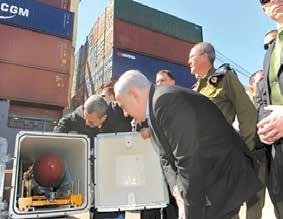

was taken to Ashdod. Among the contraband that was seized by the Israelis included anti-ship missiles, thousands of mortar shells, rocket launchers, and two British-built radar systems. This time, the Israelis discovered operating instructions written in Farsi signed by the Iranian Revolutionary Guards. Defense Minister Ehud Barak said of the operation, “The IDF and navy fighters prevented the smuggling of weapons into the Gaza Strip which were intended to be used against the residents of Israel.”
Iranian proxies tried several other times to bring in illegal weapons to Hamas including on the Panamanian flagged Klos C . Israeli intelligence followed the movements of the ship when it left Iran on its way to Sudan via Iraq. Prime Minister Netanyahu gave the go ahead for the interception mission to take control of the ship. On March 5, 2014, Shayetet 13 commandos with the help of two Israeli missile ships boarded the ship in the Red Sea. There was no resistance, and it was taken to Ei -

lat for inspection. Long range missiles, mortars, and hundreds of thousands of rounds of ammunition were found on board. The missiles may have been headed towards Sinai, according to American intelligence officials, as bringing them into Gaza was not practical. Stemming the illegal flow of weapons to Hamas, Hezbollah, and other terrorist organizations has been a priority for the IDF. The missions for the Israeli ships and commandos are fraught with danger as tensions can in-
flame at any point. The cargo on these ships mentioned above was headed towards terrorists, and the seizure of these weapons reduced the capabilities of the terrorist organizations to operate against Israel.
Avi Heiligman is a weekly contributor to The Jewish Home. He welcomes your comments and suggestions for future columns and can be reached at aviheiligman@gmail.com.

MAJOR APPLIANCE REPAIR
Servicing Washers , Dryers , Refrigerators , Dishwasher, stoves
All work guaranteed. Call 718 3762288
VACUUM SALES AND REPAIR
All areas call Max Flam 718-444-4904
THE LEATHER SHOPPE
The spot for all your custom leather Judaica. Tallis/tefillin bags, lulav and esrog bags, havdallah sets, challah covers, shtenders, pesach sets, matzah/afikomen bags. WhatsApp: (732) 523-0007 or email: theleathershoppe732@gmail.com for a full catalog. We ship.
MY MOTTO IS DON’T WAIT TO buy real estate
Buy real estate and wait Your realtor for life
516-784-0856 Alexandra at Realty Connect USA
PEACEFUL PRESENCE STUDIO
Men’s private yoga, Licensed Massage & Holistic Health Guidance 436 Central Ave, Cedarhurst Info. & free video training www.peacefulpresence.com 516-371-3715
GERBER MOVING FULL SERVICE MOVING Packing Moving Supplies
Local Long Distance. Licensed Insured 1000’S Of Happy Customers Call Shalom 347-276-7422
HANDYMAN AVAILABLE
For big or small jobs, Sheetrock, carpentry, painting, electrical, plumbing, install & repair appliances Call Ephraim at 347-593-4691
MANAGEMENT STAFF WILL ASSIST
you with:
* Obtaining Medicaid and Pooled Income Trust
* In-home Assessments, Individual and Family Counseling
* Securing reliable home care assistance
* Case and Care Management services
Dr. S. Sasson, DSW, LCSW (718) 544- 0870 or (646) 284-6242
HAIR COURSE:
Learn how to wash & style hair & wigs. Hair and wig cutting, wedding styling Private lessons or in a group Call Chaya 718-715-9009
ZEVIZZ WOODTURNING JUDAICA Challah knifes, batei mezuzah, besamim holder, kiddish cups, havdalah candle holders, yad for sefer torah, pens, stenders, bowls and more 952-356-2228

DON’T GET STUCK WITH A TWO STORY HOUSE YA KNOW, IT’S ONE STORY BEFORE YOU BUY IT BUT A SECOND STORY AFTER YOU OWN IT! Call Dov Herman For An Accurate Unbiased Home Inspection
Infrared - Termite Inspection Full Report All Included NYC 718-INSPECT
Long Island 516-INSPECT www.nyinspect.com
LAWRENCE
5 Bedroom, 3 Full Bath Center Hall Colonial. Prime Location in Lawrence. Formal Dining Room, Formal Living Room, Den, Kitchen, Bedroom + Full Bath on the 1st Floor. Second Floor
- Master Bedroom - Full Bath, plus 3 Additional Bedrooms and Full Bath. Gas Heating, Basement with Lots of Storage and Utilities. Lot Size 76X122. Great Corner Property. Mark Lipner Associate Broker Berkshire Hathaway Laffey International 516-2988457 mlipner@bhhslaffey.com
LAWRENCE
Stunning One of a Kind Mid Century Modern 6 Bedroom, 6.5 Bath, Contemporary Ranch. Resort Style Home on Over an Acre of Property in Back Lawrence. Incredible Views, Regulation Size Tennis Court - Deco Turf. IG-Gunite Pool, Low Taxes, 5318 sq. ft. of Main Floor Living Space. Plus 5000 sq. ft. Basement With Very High Ceilings. Call Mark 516-298-8457 for more details Mark Lipner Associate Broker Berkshire Hathaway Laffey International 516-298-8457 mlipner@bhhslaffey.com
CEDARHURST JUST LISTED
Magnificent renovated 4 bedroom 3 bathroom in SD#15, new roof, windows, plumbing + electric, gas cooking, new marble bathrooms, marble kitchen with stainless steel appliances, LED lighting, security cameras and speakers throughout the home, custom closets, outdoor patio, 1 car garage, near all. Mark Lipner Associate Broker Berkshire Hathaway Laffey International 516-298-8457 mlipner@bhhslaffey.com

CAN’T AFFORD YOUR PROPERTY TAXES? MORTGAGE?
Must sell for any reason? Call for FREE Consultation. Call now 212-470-3856 Cash buyers available!
NORTH WOODMERE
Stunning Split, 5 Bedrooms With 3 Full Baths. Custom Features Throughout. Well Maintained Home. Hardwood Floors, Granite Counters in kitchen, Formal Living Room and Dining Room, Den, Full Finished Basement. Relax in the Private Backyard With Inground Pool. SD#14. A must see! Close To All Houses of Worship Mark Lipner Associate Broker Berkshire Hathaway Laffey International 516-298-8457 mlipner@bhhslaffey.com
WOODMERE
Charming Colonial on beautiful tree lined street in the heart of Old Woodmere. Home features 3 bedrooms, 1.5 baths, kitchen, dining area, living room, full basement. Relatively new heating system + hot water tank. Large & beautiful backyard. Great for entertaining. Close to all. Mark Lipner Associate Broker Berkshire Hathaway Laffey International 516-298-8457 mlipner@bhhslaffey.com
WOODMERE
Woodmere just listed 3 bedroom 2 full bathroom hi-ranch in sd #15 with central air-conditioning , gas heat, 2 car garage, eat-in-kitchen, l/r, d/r, den, hardwood floors, minutes to transportation , shopping, and houses of worship Mark Lipner Associate Broker Berkshire Hathaway Laffey International 516-298-8457 mlipner@bhhslaffey.com
WOODMERE
New to the market renovated 3 bedroom 2 full bathroom ranch home with a full finished basement in the heart of Woodmere, sd#15, on a lot size 90x118, gas heat, central air conditioning, garage, new windows, roof, siding, appliances, lighting, kitchen and bathrooms. Eat in kitchen with 2 sinks, 2 dishwashers, double oven, island, lots of cabinets and storage. Spacious renovated basement with lots of storage, washer dryer and utilities, minutes to the railroad, shopping and houses of worship. Mark Lipner Associate Broker Berkshire Hathaway Laffey International 516-298-8457
mlipner@bhhslaffey.com
WOODMERE
Beautiful, brick, colonial boasting 5 bdr 3.5 Bth in pristine condition. Excellent location, near all! Move right in! RCUSA 516-512-9626
HEWLETT
New to the market 4 bedroom home sd# 14 living room with fireplace, den, bedroom, full bathroom, eatin kitchen, dining room on the 1st floor. Upstairs has 3 bedrooms full bathroom, laundry room, finished basement with a cedar closet, storage, utilities. hardwood floors, 200 amp service, alarm, one car garage, easy access to schools, shopping center, transportation options, restaurants and places of worship.
OPEN HOUSE SUNDAY, JUNE 23 11:30AM-2:30PM 1610 MOFFITT AVENUE HEWLETT
Mark Lipner Associate Broker Berkshire Hathaway Laffey International 516-298-8457
mlipner@bhhslaffey.com
NORTH WOODMERE
Meticulously maintained fourbedroom, two-bathroom home on an expansive corner. Main floor: entrance foyer, generously sized bedroom, a full bath, attached two-car garage. On the next level: sophisticated formal living room with cathedral ceilings, eat-in kitchen, formal dining room, sleek black banisters, hardwood floors. Third floor: master suite, two additional bedrooms, and another full bath. Lower level: cozy den with brick fireplace, laundry facilities, ample storage space, and utilities. New heating system, central air conditioning, custom closets throughout, inground sprinkler system. Conveniently located near parks, shopping centers, and houses of worship, and situated within SD#15 with low taxes. Mark Lipner Associate Broker Berkshire Hathaway Laffey International 516-298-8457 mlipner@bhhslaffey.com
WOODMERE
Welcome to this stunning residence situated on a tranquil residential street in Lawrence SD#15. This spacious and flawlessly maintained home boasts 4 to 5 bedrooms. Bright, airy living room with vaulted ceilings, skylights and wet bar. Central air conditioning, elegant quartz countertops, eat-in kitchen, formal dining room, main floor den with fireplace, master bedroom with bathroom snd dressing room, Jacuzzi tub, three other bedrooms and two full bathrooms. Inground sprinklers, lush landscaping, alarm system. Spacious playroom. Two-car garage. Mark Lipner Associate Broker Berkshire Hathaway Laffey International 516-298-8457
mlipner@bhhslaffey.com
WOODMERE
Spacious home within school district 14 with exquisite upgrades and central air conditioning, splendid kitchen with dual sinks, five bedrooms. Main level encompasses a spacious great room, office space, complementing the formal living and dining areas. Unfinished basement, detached garage. Expansive lot, measuring 80 x 100. Conveniently located near shopping, railroad, restaurants and places of worship.
Mark Lipner Associate Broker Berkshire Hathaway Laffey International 516-298-8457 mlipner@bhhslaffey.com
NORTH WOODMERE
New to the market magnificent 5 bedroom 3 full bathroom split level. Bright & sunny, living room with vaulted ceilings, formal dining room, eat-in-kitchen, den with fireplace, sunroom, 2 car garage, gas heating, central air conditioning, master bedroom with en-suite, hardwood floors, in ground sprinkler system, plus so much more.
Mark Lipner Associate Broker Berkshire Hathaway Laffey International 516-298-8457 mlipner@bhhslaffey.com
FAR ROCKAWAY
Two family house with 3 rentals
Recently Renovated 995k
Cash Only Deal Call 646-523-4458
HEWLETT-WOODMERE
School district. New to the market. 4 bedroom 3 full bathroom home features living room with a fireplace, formal dining room leading out to the deck, eat-in-kitchen with granite countertops, stainless steel appliances, 2 dishwashers, double oven, new microwave, primary bedroom with an en-suite bathroom, plus 3 additional bedrooms and 2 full bathrooms, large family room, central air conditioning, gas heat, in-ground sprinklers, hardwood floors, modern high hat lighting, custom window treatments, driveway has recently been done, 2 car garage, beautifully landscaped plus so much more.
Mark Lipner Associate Broker Berkshire Hathaway Laffey International 516-298-8457 mlipner@bhhslaffey.com













Introducing a stunning new construction home. Nestled in a picturesque neighborhood. Large windows, open-concept layout that merges the various living spaces. The expansive living room is bathed in natural light, thanks to the windows that offer great views of the surrounding area. Gourmet kitchen with top-of-theline stainless steel appliances, sleek cabinetry, expansive center island with a breakfast bar. Ample counter space and a well-designed layout. Wonderful dining area providing. Large glass doors, spacious patio. Luxurious master suite with a spacious bedroom, a lavish ensuite bathroom and a large walk-in closet. Additional bedrooms. High-end finishes, premium flooring, and custom details throughout.
Mark Lipner Associate Broker Berkshire Hathaway Laffey International 516-298-8457 mlipner@bhhslaffey.com
Great Location! Room to Expand Great Family Neighborhood Walking Distance to All For More Info call (516) 881-7727
Spacious home within school district 14 with exquisite upgrades and central air conditioning, splendid kitchen with dual sinks, five bedrooms. Main level encompasses a spacious great room, office space, complementing the formal living and dining areas. Unfinished basement, detached garage. Expansive lot, measuring 80 x 100. Conveniently located near shopping, railroad, restaurants and places of worship.
Mark Lipner Associate Broker Berkshire Hathaway Laffey International 516-298-8457 mlipner@bhhslaffey.com

Introducing a stunning 14-side hall colonial home in the Hewlett Woodmere School District. Formal living room, formal dining room, den with a skylight. Eat in Kitchen, two sinks, a double oven, a warming draw and a microwave. First floor bedroom, a full bathroom and laundry room. Two-car garage. Upper level has four bedrooms, two full bathrooms. Finished basement with playroom, storage and utilities. Well-groomed exterior with porch adjoining the master bedroom. Hardwood floors and back patio. Central air conditioning, inground sprinkler system, alarm system. Close proximity to schools, shopping centers, restaurants, and transportation options.
Mark Lipner Associate Broker Berkshire Hathaway Laffey International 516-298-8457 mlipner@bhhslaffey.com
LAWRENCE
New to the market 5 bedroom
3.5 bathrooms prime location with a lot size 77x130 features an eat-inkitchen, formal dining room , main floor den , formal living room with vaulted ceilings, finished basement, 2 car garage, gas heat, central air conditioning, in ground sprinkler, alarm call for more details.
Mark Lipner Associate Broker Berkshire Hathaway Laffey International 516-298-8457
mlipner@bhhslaffey.com
WOODMERE
1st showing spacious bright and sunny 5 bedroom 3 full bathrooms in school district 15. Features an expanded gourmet kitchen with stainless steel appliances, 2 sinks, double oven, warming drawer, great counter space, central air conditioning, gas heat, 2 of the bathrooms are new, hardwood floors, recessed lighting, in ground sprinkler, gas line for the barbeque, 2 car garage and minutes to all.
Mark Lipner Associate Broker Berkshire Hathaway Laffey International 516-298-8457 mlipner@bhhslaffey.com

classifieds@fivetownsjewishhome.com • text 443-929-4003
LAWRENCE
New to the market 2 bedroom 2
full bathrooms top floor elevator building, 24 hr doorman, open concept, totally renovated kitchen, granite counter tops, stainless steel appliances, 2 dishwashers, island, 2 new bathrooms, terrace, central air conditioning, u/g parking, high hats throughout, custom closets minutes to shopping, railroad, park, and houses of worship Mark Lipner
Associate Broker Berkshire Hathaway Laffey International 516-298-8457 mlipner@bhhslaffey.com
WOODMERE
New to the market studio co-op apartment, elevator building, high ceilings, low maintenance, laundry room on premises, minutes to the railroad, shopping, restaurants and houses of worship. $130K Mark Lipner
Associate Broker Berkshire Hathaway Laffey International 516-298-8457 mlipner@bhhslaffey.com
HEWLETT
Totally renovated 1 and 2 Bedroom, Apartments with washer/dryer, kitchen with quartz countertops, stainless steel appliances. Recessed lighting, hardwood floors, storage in basement. Close to RR, shopping, and houses of worship. Mark Lipner Associate Broker Berkshire Hathaway Laffey International 516-298-8457 mlipner@bhhslaffey.com
1 bedroom apartment, elevator building, eat-in kitchen, full bath, hardwood floors, plenty of closet space. Ceiling fan in bedroom & kitchen, laundry room in the basement. Close to the railroad, shopping, and houses of worship. $179k Mark Lipner Associate Broker Berkshire Hathaway Laffey International 516-298-8457 mlipner@bhhslaffey.com
LAWRENCE
New to the market spacious 1 bedroom 1.5 bathroom condo, elevator building, central air conditioning, garage parking, 24hr doorman, many closets, kitchen with granite countertops, generous counter space, washer/dryer, minutes from shopping, park, transportation and houses of worship Mark Lipner Associate Broker Berkshire Hathaway Laffey International 516-298-8457 mlipner@bhhslaffey.com
LAWRENCE
New to the market 1 bedroom 1.5-bathroom condo apartment, elevator building, 24 hr doorman, central air conditioning, washer/dryer, u/g parking, terrace, many closets, social room, gym, library minutes to shopping, restaurants, transportation and houses of worship. Mark Lipner Associate Broker Berkshire Hathaway Laffey International 516-298-8457 mlipner@bhhslaffey.com
LAWRENCE JUST LISTED
This amazing two-bedroom two full bathroom condo Features a luxurious lifestyle in the beautiful city of Lawrence. What more could you ask for? The building has a 24-hour doorman and elevator access, with a social room, library, washer/dryer inside the unit, and terrace. Plus, the added benefit of having a live-in super to ensure maximum safety and security! And don’t forget about your new kitchen complete with a gas stove, refrigerator, microwave, and even two dishwashers! The living room and dining room are spacious and have recessed lighting installed throughout. Both bedrooms feature lots of closet space for storage. To top it off, there’s even garage parking available to make your life just that much easier! Don’t miss out on this incredible opportunity. Please call for a private showing Mark Lipner Associate Broker Berkshire Hathaway Laffey International 516-298-8457
mlipner@bhhslaffey.com

HEART OF CEDARHURST
Entrance off gourmet glatt lot, second floor, shared bath, ideal for therapist/ office work, includes utilities, $600. Call 516-371-3715
1500SF LOFT OFFICE
(formerly Shmuel Flaum Architect)
2 store/offices; ~600sf each 2 Cedarhurst offices; ~100sf each Starting at $650
Also… Large Parking Lot & Storage available Utilities, Internet & Parking incl. with some Kosher kitchen – Minyan Next to LIRR - No broker fee Call/text/Whatsapp: 516-206-1100
CEDARHURST
2 bedroom 2 bathroom apartment, private entrance, washer/dryer, central air conditioning, freshly painted, hardwood floors, recessed lighting, garage parking, stainless steel appliances, great courtyard, minutes to the railroad, shopping, restaurants, park and houses of worship. Mark Lipner Associate Broker Berkshire Hathaway Laffey International 516-298-8457 mlipner@ bhhslaffey.com
Welcome To Luxury Living in The Heart of Hewlett! This Spacious 2 Bedroom, 2 Full Bathroom Condo Boasts in Unit Separate Laundry For Ultimate Convenience. Enjoy Lovely Courtyard Views from Your Private Terrace. With Elevator Access and A Doorman, Experience The Epitome Of Comfort In This Prestigious Building. Mark Lipner Associate Broker Berkshire Hathaway Laffey International 516-298-8457 mlipner@bhhslaffey.com

WOODMERE
Totally renovated bright and sunny 1 bedroom corner unit apartment with a washer/dryer. Features quartz countertops, ss appliances, recessed lighting, bathroom with chrome fixtures, close to the railroads, shopping and houses of worship. Call for details Mark Lipner Associate Broker Berkshire Hathaway Laffey International 516-298-8457 mlipner@bhhslaffey.com
CEDARHURST
1, 2 and 3 bedroom apartments, totally renovated private entrance , central air conditioning, hardwood floors, washer/dryer, garage parking, dishwasher, recessed lighting, private playground, close to railroad, park, shopping and houses of worship. Call for more details Mark Lipner Associate Broker Berkshire Hathaway Laffey International 516-298-8457 mlipner@bhhslaffey.com
SPECIAL ED TEACHER
HASC seeks Special Ed Teachers for our Early Learning Program. Candidates must possess NYS Professional License. Warm, supportive and enjoyable working environment. Competitive Pay! Please e-mail resume to jobswd@hasc.net
REGENTS EXPERT
Tutoring regents in Algebra and Geometry A Darchei Torah instructor. Guaranteed results Text 347-491-8045 WhatsApp 347-767-1755
BOOKKEEPER
Excellent growth potential, Frum environment, Excellent salary & benefits. Email resume to: resumetfs1@gmail.com
JH ELA AND MATH teachers for ‘24-’25 school year. M-Th, PM hours, strong support, curriculum and material provided, excellent salary. Far Rockaway area. Teachersearch11@gmail.com.

Torah Academy for Girls is seeking an experienced Administrative Assistant to calmly and efficiently manage our exciting Early Childhood department. The ideal candidate will possess excellent organizational skills, a keen eye for detail, and the ability to handle multiple tasks with a calm demeanor. Responsibilities include managing schedules, coordinating meetings, and providing administrative support. If you thrive in an exciting setting, we'd love to hear from you. Competitive salary offered. Apply today to join our team!
Please send resumes to openings@tagschools.org
MDS REGIONAL NURSE
5 Towns area Nursing Home management office seeking a Regional/Corporate level MDS Nurse to work in our office. Must be an RN. Regional experience preferred. 2-3 years MDS experience with good computer skills required. Position is Full Time but Part Time can be considered. Great Shomer Shabbos environment with some remote options as well. Email: officejob2019@gmail.com
HEAD ENGLISH, AFTERNOON Teaching Position Zareinu is hiring for the 24-25 school year. Looking for a qualified teacher to teach a modified English curriculum! for a small group of 4th and 5th grade girls in Far Rockaway. Great Pay! Warm environment! Great administrative support! Email resume: jlepolstat@zareinu. org or call 516-993-2142
HEAD MORAH, MORNING POSITION Zareinu is hiring for the 24-25 school year. Looking for a qualified head Morah afternoon position! Looking for a qualified teacher to teach a modified Limudie Kodesh curriculum. for a small group of 4th and 5th grade girls. Great Pay! Warm environment! Great administrative support! Email resume: jlepolstat@zareinu. org or call 516-993-2142
HEAD ENGLISH, AFTERNOON Teaching Position Zareinu is hiring for the 24-25 school year. Looking for a qualified teacher to teach a modified English curriculum! for a small group of 3rd grade girls in Far Rockaway. Great Pay! Warm environment! Great administrative support! Email resume: jlepolstat@zareinu. org or call 516-993-2142
and Afternoon Positions
Join our Specialized team at Zareinu. Looking for a warm and caring teacher assistant to work with an experienced teacher in a small 3rd and 4th grade girls’ class in a Beis Yaakov in Far Rockaway. Great Pay! Great Opportunity! Warm environment with administrative support! Email resume: jlepolstat@zareinu. org or call 516-993-2142
For elementary General Studies classes for ‘24-’25 school year. Candidates should have skills to take over for teachers if needed. M-Th, PM hours, strong support. Far Rockaway area. Send resume to teachersearch11@gmail.com.
A multi-tasker needed for general office work. The ideal candidate is someone who is detail-oriented, responsible, and can take ownership. Looking for someone who is eager to learn, and expand his/her skill set while possessing the ability to work independently and as part of a team. Experience with Excel required. Five Towns location. In-office position only, not remote. Please send resume to 5tpart.timecareer@gmail.com

A YESHIVA IN QUEENS is looking for an experienced part/ full time secretary, 2-year-old morah, kindergarten morah, kindergarten morah assistant and Pre-1A English teacher for the 2022-2023 school year. Nice and timely pay. Please email resume to mshelt613@gmail.com or call/text 718-971-9799.
GURAL JCC
Early Childhood Center is hiring Assistant Teachers for the 2024-2025 school year, and Camp Staff over 16-years-old for Summer, 2024. Please send resumes to JCC.Nursery@guraljcc.org or call (516) 239-1354.
5 TOWNS BOYS YESHIVA Seeking Elem Gen Ed Teachers Excellent working environment and pay. Only lic/exp need apply. Email resume to yeshivalooking@gmail.com
SEEKING ELA TEACHER
Teaching position for Gr. 6. Mon.-Thurs., afternoon hours. Far Rockaway/5T area. Great salary, warm, supportive environment. Training in our curriculum is provided. Teachersearch11@gmail.com
YESHIVAT KOL YAAKOV In Great Neck, NY, is seeking general studies teachers for both the elementary and middle schools, for the upcoming academic year. Mon-Thur afternoons. Competitive salary, warm and supportive environment. Send resume to m.kalati@kolyaakov.org
SHMIRAS HALASHON
Text 516-303-3868 with a time slot of your choice to be careful on lashon hara. Be a part of the 1,000 people for klal yisroel!

There is a whole lot going on for me right now. For some reason, I keep thinking that this past Shavuot would be the last two days of yom tov that we will be celebrating. I don’t know why I am caught up with that thought as I never felt it was a big deal to have great food and chill for two days, I actually like it… Things like that.
My house is a wreck. Once beautifully appointed rooms with things in the just right spot to highlight them are now all jumbled into categories: give away, take away, keep, and junk. And the clothes: winter, summer, fit, sortof-fit, and don’t. How many black skirts and white shirts do I really need? Shoes, more shoes…is there such a thing of too many shoes?
Contact me if you want to come by and find something that may work for you.
In Israel after the wedding, we spent an incredible week of celebration, sheva brachot. It’s exhausting and wonderful. Each night there is another party, another meal, and another game. We gained four pounds and found out that after over 55 years of marriage, we know nothing about each other when we played the Newlywed

Game as part of the entertainment.
The brand-new couple, who have known each other less than four months, aced it.
We have nothing to say.
In order to get our visa for the formal aliyah, we needed to submit our passports; it’s the protocol. Our appointment was the first thing Monday morning after
agent, Shmuli Deutsch (no direct relation), we were rebooked on an earlier Sunday flight. We had to get to the Jewish Agency by Monday morning. Failure to file would guarantee our missing our Nefesh B’Nefesh booked flight.
We did; after a few more glitches, we were ready and waiting.
While we were in Israel, we proudly
Each Israeli with whom we interacted would whisper a mazal tov as their eyes swam with tears.
the magnificent Shabbos sheva brachot. Motzei Shabbat, ready to check in, we found out that our Sunday night PM flight was at the same time Monday morning; it was an AM flight. It seems that EL AL had made a change, emailed us to inform us, but we had not noticed the PM to AM switch; it was our neglect.
For $1,000 and an awesome travel
told everyone that we are coming back soon to put down our passports and stay in place for a while. Each Israeli with whom we interacted would whisper a mazal tov as their eyes swam with tears. Since the start of the war on October 7, Israelis, young and old, have been beating back dismay as the war drags on and the body count rises.
Just a few months ago, we thought the need for dog tags and peace signs would no longer be required. But the tags and symbols continue to proliferate. The news of the hostage rescue brought joy and relief. Yet the world of Jew Hate turned rescue into release.
We are lucky to have been given the opportunity to make aliyah. For that, we are not heroes; we are fulfilling a lifelong dream. And if in the process we are helping to renew a tired dream for someone fed up with always being on the alert and losing loved ones in protection of their dreams, for that we are grateful.
We will soon be at the gate, our furniture distributed, our belongings donated or sold, and our hearts filled with joy that we have arrived.
It’s worth the bumps and lumps along the way.
Mrs. Barbara Deutsch is currently the associate principal at HANC 609 and a longtime reflective educator, parent, grandparent, and new great-grandparent. Even after all these years, she still loves what she does and looks forward to working with kids every single day.

Years ago, the Greek philosopher Zeno of Citium and his followers gathered in Athens on a Stoa Poikile—a “painted porch”—to discuss how to live a virtuous life built around wisdom, temperance, justice, and courage. (I realize this isn’t what you expect from your favorite weekly tax column. Stick with me.) Zeno went on to influence future philosophers like Seneca, Epictetus, and perhaps most notably, the Roman emperor Marcus Aurelius. Together, they became known as the Stoics, and their lessons are enjoying a renaissance today.
Most people understand the word “stoic” to mean repressing one’s emotions or simply enduring patiently. However, at its core, stoicism boils down to the notion that it’s not events that upset us so much as our reaction to those events. Stoics look at what happens around them and ask, “Can we control this?” If so, they fight the good fight. If not, they don’t waste time, energy, or emotional balance fighting a battle they can’t win. No amount of yelling at the airline representative is going to stop a summer storm that parks itself over O’Hare!
That same philosophy can help manage the infuriating gauntlet we laughingly
refer to as “the tax system.” Former President Jimmy Carter campaigned against it as “a disgrace to the human race,” and 50 years later, his attack still holds true.
There’s not a single sitting senator or representative who would defend the Internal Revenue Code as it currently stands. But sadly, today’s dysfunctional Congress would struggle just to pass a resolution
(Seriously, can you imagine Marcus Aurelius meditating on the Augusta Rule?)
The next couple of years will be especially challenging for stoics looking to accept battles they can’t win. That’s because the current framework, enacted by the Tax Cuts and Jobs Act of 2017, turns into a pumpkin just like Cinderella’s carriage at midnight on December 31, 2025.
As Mark Twain once said, “No American is safe when Congress is in session.”
declaring that ice cream tastes good, let alone craft a tax system that meets the needs of our modern economy. “Fixing” the tax code appears as likely as fixing that storm over O’Hare.
So, what do stoics do? They accept the tax code as it is, warts and all. Then, they work to control outcomes within that flawed system. That means planning to take advantage of the sometimes hidden, sometimes silly ways to legally pay less.
At that moment, if Congress hasn’t acted, standard deductions, rates, and a host of other factors revert to their 2017 levels. That will mean trillions in higher taxes for most Americans. Now, there’s broad bipartisan agreement to extend most of the current rules, especially for individuals making under $400,000 per year. But who knows what might happen? As Mark Twain once said, “No American is safe when Congress is in session.”
What’s worse, we probably won’t have time to do much planning before whatever new rules Washington passes become law. In 2017, it took Congress until December 20 to send the White House a bill to sign. That meant planners had just 12 days’ notice before the 2018 rules and rates took effect. That’s actually a luxury compared to previous Congressional efforts. In 2012, Congress was faced with the challenge of extending rates from the 2010 Tax Relief Act that expired at midnight that year. They finally got the job done 11 hours after the deadline passed on New Year’s Day.
Most Americans who make enough money to benefit from professional tax services can expect a bumpy ride over the next couple of years. Don’t worry— we’ll be here to guide you through the things you can control to pay less, no matter who wins the election and what the rules look like.
Allan J Rolnick is a CPA who has been in practice for over 30 years in Queens, NY. He welcomes your comments and can be reached at 718-896-8715 or at allanjrcpa@aol.com.
The summer has truly arrived. How do I know?
No, not the weather! Graduations and weddings are filling our calendars. And camp trunks and snack runs are filling our days! At least, G-d did us a good turn having bar and bat mitzvahs be birthday related, or we’d be at someone’s celebration all summer long.
This way, at least we get to squeeze in a barbecue or two over the summer and at least one weekend embracing upstate, which should be a wonderful twoday outing but usually takes at least four – two to be there and two to get there and back!
Yup, summer fun!
And let’s never forget Visiting Day. Like, does your kid really forget you in 2½ weeks?!
Honestly, the best tip one can give a camp is to send home an envelope and a nice note from the kid’s counselor that demonstrates that they get who your kid is, and parents will gladly avoid the traffic and send a tip up….
Or maybe I’m wrong.
Maybe parents depend on that one day to get to see their kid again, then be ignored by their kid after the first 20 minutes, then be shown which kid is mean to their child, and then refill their snack boxes and buy out the canteen.
And maybe the kid depends on their parent to come up so they can see them for the first 20 minutes, show them their one hurriedly cleaned bunk, then run off with their friends, and also show them which kids and counselors are mean to them, get their snack boxes filled, and be
Time on the beach, if you can carve out some. Walks in the pleasant breeze, if you can find one. And ice cream treats on the avenue, if you can still afford them.
Just as your children are adjusting to camp, everyone’s parents, grandparents, cousins, uncles, aunts, and siblings descend on the campuses. It’s as if the camp needs something to fill the days with more activities, so they let the kids spend one day with visitors and the next day having a cry-a-thon.
Or maybe it’s all about getting the parents to come up there to distribute the tips?

the easy, breezy clothing. The late night light. The absence of homework. Enjoy the sunshine and the days of water slides and swimming pools. Beaches and sidewalk cafes. Boating and batting. And so much more. Summer is definitely here either way. So enjoy!
taken to buy out the canteen – or even better, off-campus to buy out the local Walmart.
Yes, summer certainly has its perks. Time on the beach, if you can carve out some. Walks in the pleasant breeze, if you can find one. And ice cream treats on the avenue, if you can still afford them.
But who would ever give up summer? It just has the best energy if you play your cards right and focus on the positives:


